
Press Enter to search

How to List Research Experience on Your Resume
Applying for a role that requires research skills? Here’s how to list your research experience on a resume, with examples you can follow.
3 years ago • 7 min read
Research experience isn’t just for science and academia. Research is a valuable skill that’s required for a number of roles and industries, which means it almost certainly has a place on your resume. And no — that doesn’t mean writing “research” in your skills section and moving on.
Why you should list research experience on your resume
If you’re applying for a job that involves research, listing research experience is a no-brainer. Research-specific positions, scientific jobs like Research Assistants , Lab Assistants or Technicians, graduate school applications, and most jobs in academia all require evidence of research skills. Even outside these positions, research experience demonstrates valuable transferable skills, like critical thinking and attention to detail . Which is not to say that you need to include research experience on every resume — if it makes you a stronger candidate, include it, but if it isn’t relevant and doesn’t add anything else to your candidacy, leave it off.
Research experience resume example
Before we dive right in, here's a sample resume that emphasizes research skills. You can use this as a template or as inspiration to write your own resume from scratch.

Download: PDF | Google Docs
How to list research experience in your resume
Like a lot of desirable skills, research is a soft skill , meaning it’s not something you can claim as an objective fact on your resume without backing it up. What you can do instead is prove it — what previous role involved a lot of research? What resume accomplishments do you have that highlight your research experience? Showing how you used research skills in action is the best way to demonstrate the value you could bring to the company and role you’re applying for.
There are a number of ways you can highlight research experience on your resume:
In a dedicated section
In your work experience, in your education section, listing research publications, in a projects section, in your skills section, in your resume summary.
Let's take a look at each of these options in a little more depth. But first, let's look at an annotated example to help set the context.
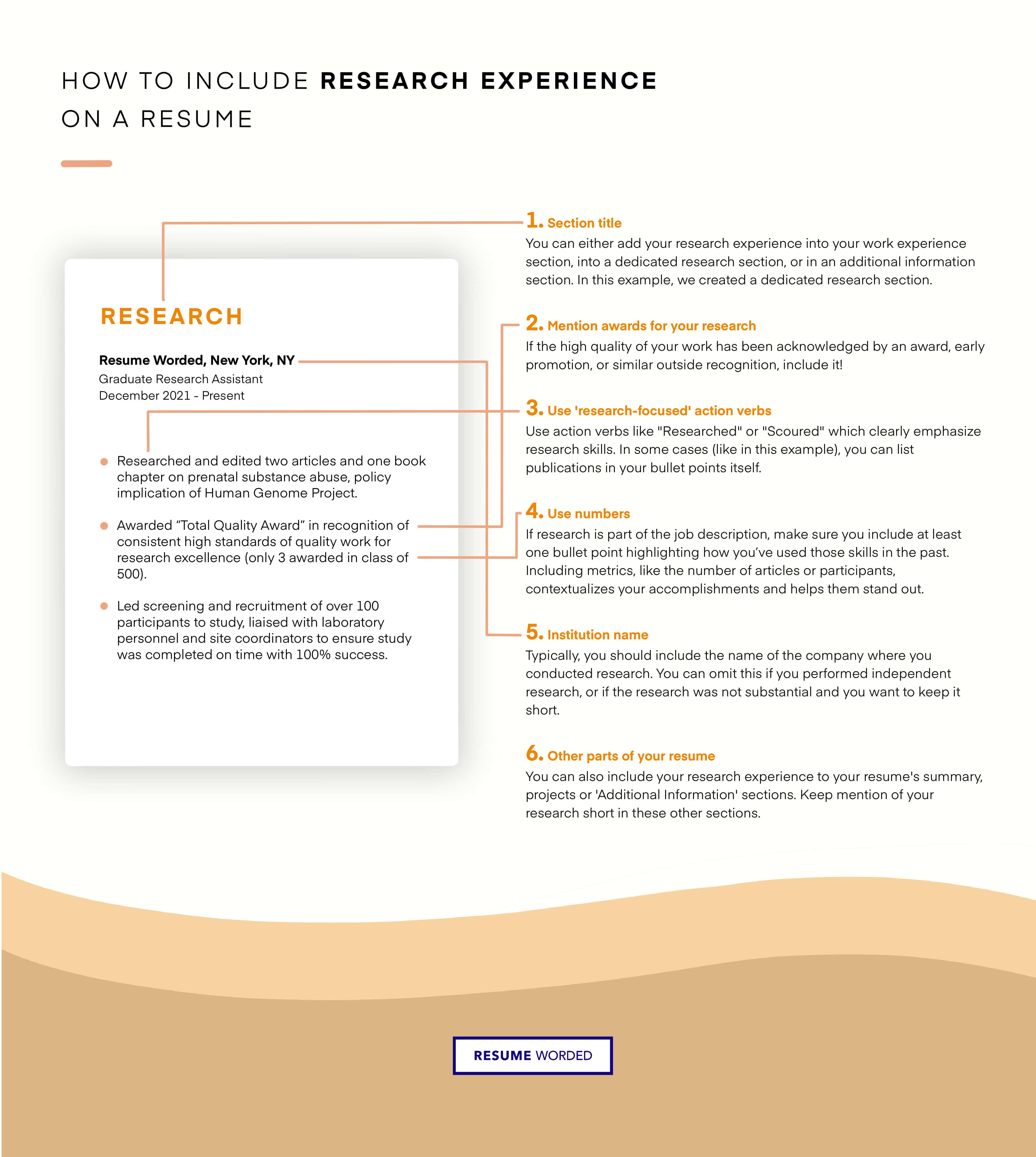
If you come from a research background, you might want to title your work experience ‘Research.’ Alternatively, you could create two experience sections — one titled ‘Work Experience’ and one titled ‘Research Experience’ — if you also have a lot of non-research experience but want to highlight your most relevant experience first. You can go into more detail when applying for a research-focused role by describing the project and specifying the nature of the research and your role in it.
More information: How to title different sections of your resume
Including research experience in your main work experience section is appropriate if it was paid work or if it was your most recent and relevant experience. List the employer — for example, the university or research department — job title, dates, and accomplishments, just like you would any other work experience.
More information: How to list your work experience on your resume
If you’re a current student or recent graduate, you can list your education section at the top of your resume. You can also make this section a little more comprehensive if you don’t have a lot of work experience, by including things like awards, coursework, and academic research.
If you undertook research as part of your studies and it demonstrates skills relevant to the job you’re applying for, list your research accomplishments in bullet points under the education section of your resume.
More information: The must-haves when writing your education on your resume
If you have a lot of publications that came out of your research, and you want to draw attention to them — and if they’re relevant to the job you’re applying for — consider creating a separate publications section . Formal publications like these are an excellent way to add credibility to your research experience.
List each publication in a new bullet point with the title, year, and name of the magazine, website, or journal. Academic publications can be listed more formally if it’s relevant, like if you’re applying for graduate school or a role in academia.
When it comes to listing research on your resume, like other soft skills, you need to show you’ve used this skill in your previous roles by showcasing your research related accomplishments. Upload your resume to the tool below to find out if your resume highlights your most relevant research experience and achievements.
If your research experience is less extensive or wasn’t quite relevant enough to include alongside your work experience or education, you can still highlight it in a projects section. Keep this brief and include 1-2 bullet points showcasing your key research accomplishments.
More information: How to list projects on a resume
Research skills can go in your skills section — as long as they’re hard skills. Steer clear of listing generic skills like “Research” — instead, use our keyword finder to look for relevant skills and keywords and include specific hard skills like data analysis, project management, software proficiency, and certifications.
You can also use the skills search tool below to get a list of hard skills relevant to the research-focused role you’re applying for.
More information: How to write a resume skills section
If you’re applying for a position where research experience is essential, consider emphasizing your experience by including a short resume summary at the top of your resume. This should include the title of the job you’re applying for and a brief overview of your background and key skills.
More information: Generate a summary for your resume
Examples of listing research experience on your resume
No matter where you choose to include it, always list research experience in concise, accomplishment-focused bullet points . These should follow the structure of action verb + what you did + what the result was. Here are some examples of resume bullet points you can use or modify to suit your own research experiences.
Highlight research projects
- Assisted with cell development research projects as part of the Leukemia Research team — identifying cell changes, determining cell counts and coulter counters with 98% accuracy.
If you have significant research experience, describe it! The more relevant it is to the position you’re applying for, the more detail you can go into. Make sure to specify exactly what stages of research you worked on and what your contribution was.
Mention awards for your research
- Awarded “Total Quality Award” in recognition of consistent high standards of quality work for research excellence (only 3 awarded in class of 500).
If the high quality of your work has been acknowledged by an award, early promotion , or similar outside recognition, include it! In addition to the name of the award or accolade, don’t forget to specify context (e.g. 'out of class of 500 people' to increase its credibility.
Demonstrate technical expertise
- Created over 75 3D models with CAD tools such as Solidworks and ANSYS.
If you have experience with specific software or tools that you’ll be using in the position you’re applying for, include a bullet point accomplishment specifying how you’ve used them. While this isn't direct 'research' experience, it uses tools that are relevant to research projects — this is a good way of showing that you have research skill sets without having formal research experience.
Use 'research-focused' action verbs
- Researched and edited two articles and one book chapter on prenatal substance abuse, policy implication of Human Genome Project.
Use action verbs like "Researched" or "Scoured" which clearly emphasize research skills. In some cases (like in this example), you can list publications in your bullet points itself. If you’ve authored academic papers, books, or articles, this is a great way to show the validity and importance of your research.
Include accomplishments related to research studies
- Oversaw screening and recruitment of over 100 participants to study, liaised with laboratory personnel and site coordinators to ensure study is completed on time with 100% success.
Not all research positions involve pure research. Make sure you highlight appropriate related accomplishments, like managing research study participant data and enrolments or managing a team of research assistants.
Include accomplishments relating to research in your field
- Conducted legal research; organized and analyzed data and evidence for over 50 cases annually.
If research is part of the job description, make sure you include at least one bullet point highlighting how you’ve used those skills in the past. Including metrics, like the number of cases you’ve researched, contextualizes your accomplishments and helps them stand out.
- Conducted marketing research for both buy-side and sell-side resulting in 15 strong leads.
Research isn’t just limited to science and academia. Demonstrate your skills in action by the context and end results of your research, like the number of leads it generated or the increase in sales figures.
Spread the word
Hiring manager’s guide: how to list work experience on your resume, you lied on your resume and got the job. what now, keep reading, how to show bilingualism on your resume (with examples), oops what to do if there’s a mistake on your resume, getting the basics right: resume line spacing, subscribe to our newsletter.
Stay updated with Resume Worded by signing up for our newsletter.
🎉 Awesome! Now check your inbox and click the link to confirm your subscription.
Please enter a valid email address
Oops! There was an error sending the email, please try later

Thank you for the checklist! I realized I was making so many mistakes on my resume that I've now fixed. I'm much more confident in my resume now.

Want To Add Research Experience in a Resume? Learn How! (+10 Examples)

3 key takeaways
- Why you should include research experience in a resume
- How to write your research experience using the Teal AI Resume Builder
- 10 examples of resume research experience
Research penetrates virtually every profession, from healthcare to finance and tech to the arts.
In fields like biotechnology, the value is clear. Still, even in areas like market analysis, design, and humanities, research experience can highlight your capacity to dig deep, discern patterns, and contribute original insights. It's also a testament to your in-depth knowledge in your chosen domain.
Research experience in your resume is a powerful way to demonstrate your analytical insight and unique expertise. So where should it go? And what's the best approach to describe, quantify, and showcase these accomplishments?
Why you should include research experience in your resume
Research experience showcases your dedication to and in-depth understanding of your field.
Whether you're after a research assistant position, a job in molecular biology, a position as a marketing generalist, or a prominent spot on the leukemia research team, including research on a resume highlights technical skills (like data interpretation and statistical analysis), soft skills (such as collaboration, critical thinking, and teamwork), and their corresponding impact.
Especially when these research skills are listed in a job description, it’s crucial to incorporate them into your resume. This helps align your qualifications with what the hiring manager, recruiter, or prospective employer is looking for.
Also, every role you apply to will likely have a variety of skills you’ve gained through your research experience. So before you submit an application, be sure to tailor your resume to that specific role—focusing on the unique skills and keywords for each position.
Pro Tip: Teal+ offers insight into unlimited hard skills, soft skills, and other important language from any job description. The free Teal AI Resume Builder and Job Application Tracker pull the top five hard skills—helping you align your resume with every role you apply to.
How research experience on a resume differentiates you
As a job seeker, skills gained through traditional research experience set you apart as a candidate who not only has theoretical knowledge but also has the hands-on experience to apply this knowledge, tackle complex challenges, conduct research, and contribute meaningful insights in real-world scenarios.
For example, if you conducted research in data analytics, you know how to collect, process, and interpret large data sets, whereas those who haven’t engaged in real-world research experience may only be able to interpret large sets of data.
What fields value research experience?
So, what are some fields where adding research experience to a resume can help differentiate you from other candidates?
- Engineering & Technology: Emphasizing your ability to tackle technical challenges and innovate using cutting-edge technologies.
- Social Sciences & Humanities: Emphasizing your analytical skills in understanding human behaviors, societal trends, and cultural nuances.
- Business & Economics: Showcasing your skill for dissecting market trends, predicting economic shifts, and strategizing based on concrete data.
- Life Sciences & Medicine: Demonstrating your expertise in laboratory techniques and understanding of complex biological systems.
Other fields where research might be less prominent but still relevant are marketing, event management, web development, and hospitality.
How to write about your research experience
The power of your research experience lies in quantifying your impact and success.
Rather than just listing your research experience, by emphasizing the measurable impact you've made, you offer undeniable proof of concept—turning abstract research skills into concrete accomplishments.
In the same way you would create resume work experience achievements, research experience should follow this structure (or something similar) to emphasize your research skills, how you used them, and the outcome.
Success Verb + Noun + Metric + Context (Research Experience) + Outcome = 1 bulleted achievement
You can also incorporate research experience on a resume using a similar structure into your “Professional Summary,” “Education,” and “Projects” sections.
If you’re feeling stuck, the Achievement Assistant in the free Teal AI Resume Builder can help you write impactful resume achievements for all of your research experience.

How to list research experience on your resume with Teal
Step 1: Log in to your Teal account. (If you don’t have one, sign up for free!)
Step 2: Click “Resume Builder” in the navigation panel on the far left. From here, you can click “Add New Resume” or select a resume you’re already working on.

Teal note: Start with steps one and two. Then, proceed with the directions for each of the following sections.
To list research experience in your professional summary
To add research experience to your professional resume summary, scroll to Professional Summaries, click the drop-down button, then click "Add Professional Summary." Create one from scratch, or click the "Generate With AI" Button. Then, edit as needed to incorporate your relevant research experience.
To list research experience in your work experience
To add research experience to your work experience achievements, from the Resume Builder, scroll to Work Experience. Then, click the drop-down button. Click "Add Work Experience" to create a new section or "Add an Achievement" in an existing work history.

To list research experience in education
To add research experience to your education, from the Resume Builder, scroll to Education. Then, click the drop-down button. Click "Add Education" to create a new section or the “Edit Education Item” icon to add research experience to existing education.

To list research experience in your projects
To include research on a resume in your projects, from the Resume Builder, scroll to Projects. Then, click the drop-down button. Click "Add Project " to create a new section or the "Edit Project" icon to add research experience to an existing project.

How to include undergraduate research experience on your resume
Undergraduate academic research experience is more than just academic work; it's a testament to your commitment, curiosity, and capability.
By actively engaging in research at an early stage, undergraduates like you demonstrate a proactive approach to learning and a desire to dig deeper into your field.
Not only is this research experience valuable for students pursuing, say, a career in academia, but also for students of all fields of study entering the professional world.
In real-world scenarios, prospective employers view undergraduate research as an indicator of problem-solving project management skills, technical knowledge, and the ability to collaborate.
5 tips for including undergraduate research experience on a resume
If you’re looking to learn how to put undergraduate research experience on a resume, the best placements are within your “Education” section or as projects in a resume .
Here are five tips to help you get started.
1. Use a clear title
2. Include the duration of the research
3. Be specific about your role and contributions
4. Highlight achievements and outcome
5. Incorporate relevant hard and soft skills
Resume research experience examples
Let’s take a look at some research experience examples on a resume across different levels of experience and professions to get an idea of what this can look like.
High school student
Collaborated and utilized botanical techniques in an 'Effects of Light on Photosynthesis' study, examining 40+ seedlings during a semester-long biology research project, revealing blue light's heightened influence on photosynthesis.
Undergraduate student
Surveying 500+ meals over six months in the 'Dietary Habits of University Students' research projects, using Excel's advanced statistical functions and critical thinking, revealed a 58% decline in protein-rich food choices.
Recent College graduate
As an Environmental Science graduate, I'm skilled in the hands-on application of advanced chromatography techniques, with a focus on the 'Efficiency of Modern Water Purification Methods' research. I've successfully analyzed and improved purification methods for over 300 water samples, achieving a 90% reduction in contaminants.
Masters student in Psychology
Led the data analysis of 100+ patient evaluations during the 'Efficiency of Cognitive Therapies on Stress' study, resulting in a 20% improvement in therapeutic outcomes.
Human resources intern
Used the Qualtrics survey tool to capture insights from 250+ employee responses as part of the 'Employee Satisfaction Metrics' evaluation. This collaboration and data-driven analysis highlighted key opportunities for organizational enhancements, leading to a 10% increase in overall employee satisfaction scores within Q2.
Junior-level data engineer
Developed an ETL pipeline capable of processing 2TB+ of data daily as part of the 'Real-time Data Integration' research project, significantly reducing data latency by 80%
Financial analyst
Leveraged Excel's advanced financial functions to dissect 3 years' worth of company financials in the 'Company Health Audit' study, identifying potential savings of $1.2M
Product manager
As a seasoned Product Manager with 7 years of experience, I've spearheaded research-centric product developments, aligning technical capabilities with market demands. My most notable accomplishment was the 'User Experience Revamp' research project, where I employed data analytics tools and cross-functional teamwork to gather feedback from 10,000+ users. This feedback-centric approach led to a 20% increase in user retention and positioned our product as a market leader in its segment.
Lead mechanical engineer
Project: Efficiency Enhancement of HVAC Systems Research - Innovated novel airflow designs tested on 100+ HVAC units as part of the 'Airflow Optimization Research,' achieving an efficiency boost of 15%. - Collaborated with electrical engineers to integrate smart sensors in 50 existing HVAC systems during the 'Smart HVAC Retrofit' initiative, leading to a 10% reduction in energy consumption.
Senior machine learning engineer
Optimized neural network architectures, improving over 2,500 lines of Python code, during a collaborative research initiative on image recognition, resulting in a 15% boost in model accuracy.
Add your research experience to your resume with Teal
Highlighting research experience in your resume is more than just filling space.
It's about showcasing a depth of understanding, commitment to a field, and practical skills that can differentiate you from other job seekers.
Research proves you have the hard and soft skills employers want and demonstrates your proactive approach to leveraging those skills for tangible outcomes.
The Teal AI Resume Builder makes adding this research-focused experience to your resume seamless. Whether it's capturing intricate details of an independent research project, translating theoretical skills into actionable results, or giving context to your hands-on experience, Teal provides the tools and guidance to do it with precision. And by tailoring your research for each application, you make a compelling case that you're the best fit for a role.
Sign up for Teal today and let your research experience take the spotlight it deserves.
Frequently Asked Questions
How can i effectively quantify my research experience on a resume, should i include all my research projects on my resume or only the most relevant ones, how can i describe undergraduate research on my resume if i don't have any publications or presentations.

Kayte Grady
Related articles.

How Long Should a Cover Letter Be? (Ideal Length for 2024)

Lying on a Resume? Learn the Risks & Consequences (+ Better Alternatives)

30 Best Personal Skills for Your Resume [Examples]

How to List Contract Work on a Resume (Guide + Examples)
.jpeg)
We help you find the career dream.
- Resume Tips
How to Include Research On A Resume (Examples and Tips)

Research skills are highly prized across a wide spectrum of industries. The fact is that researchers are invaluable for many employers. After all, new ideas often come only after exhaustive analysis of existing practices. Is it any surprise then that many of the most innovative companies in the world look for employees who possess these skills?
The good news is that most of us possess at least some skill in researching. Unfortunately, too many of us don’t recognize those skills or why they matter to employers. In this post, we’ll help you identify your research skills and show you how to include them on a resume.
What Are Research Skills?
Research skills are all those skills needed to investigate and analyze a subject and then communicate your findings to others. In short, there is no simple easily-defined skill that encompasses all these talents. Instead, your ability to research involves the effective use of a range of other skills.
Most of these skills relate to critical thinking in some way. They involve accumulating information and using it to draw reasoned conclusions. Naturally, those conclusions need to be conveyed to others with effective communication skills.
Research skills are among the most highly-prized transferable skills employers are looking for in today's competitive job market.
Employers value these skills because they are essential to progress. Innovation only comes from research and inspired insight. As a result, companies that rely on innovation to remain competitive tend to rely on employees who are talented researchers. Obviously, there are entire fields of industry that use researchers only for that purpose. In a more general sense, however, research skills are widely used by many different types of employees. And they use them in almost every industry in the marketplace.
How to List Research on a Resume
Including research on your resume:.
For research, summarize your accomplishments in a brief section. You should include a description of your role in the research, the topic that you were exploring, and some information about your findings. For example,
_ Research Project , Economics Department, Dynamic University, Dec 2017 – Apr 20_20
Key participant in research project examining blockchain technology’s potential impact on financial intermediation. Explored use case studies for cross-border payment systems, intrabank transactions, and microtransactions for e-commerce.
Designed model simulation to study blockchain-based payment system
Worked in tandem with Alpha and Delta Finance to create simulated intrabank transfers using digitalized tokens
Studied e-commerce script integration for cryptocurrency payments
Member of 3-person team tasked with presenting findings to 2018 National Banking Technology Conference
Example of Research Listed On a Resume:
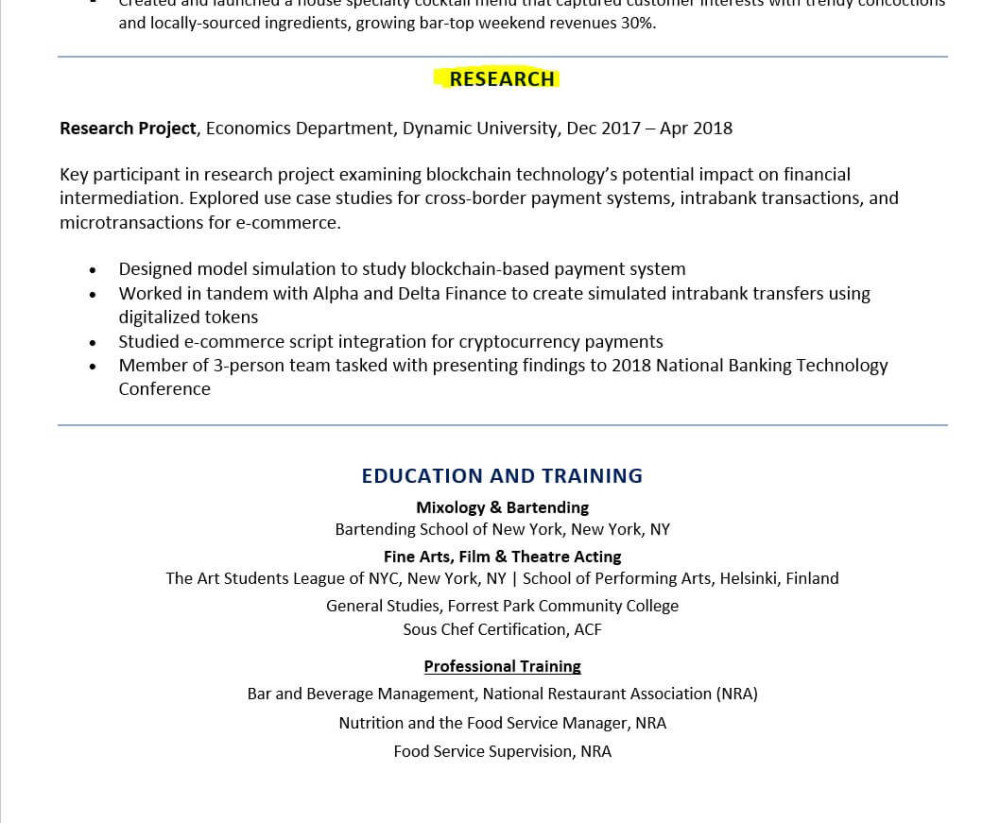
View 200+ more professional resume samples for all industries, along with a guide to writing resumes from our career experts.
You can also combine your research with other sections:
Research and Publications
Research and Professional Development
Educations and Research
We wrote a good post here on how to include publications on a resume.

Join more than 1 million people who have already received our complimentary resume review.
In 48 hours, you will know how your resume compares. We’ll show you what’s working--and what you should fix.
Some Important Research Skills You May Already Possess
When listing research skills on your resume, it’s important to remember that most of them won’t be core skills for the job you’re seeking. Unless you’re applying for a job as a researcher, these skills will basically be transferable skills. That means that they might not be essential for the position but will certainly enhance your value as a potential employee.
To better understand your own research skills, it’s important to be able to identify them.
Here are some common and valuable research skills that many employees possess. Chances are that you have used at least some of these skills in your career. For example:
Attention to detail. This seemingly simple skill is one that employers truly appreciate. People who possess an ability to note even the smallest details can be invaluable for identifying problems and creating solutions.
Planning and scheduling skills. Every research project starts with a plan and a schedule. This is also one of those transferable skills that has application throughout nearly every industry.
Data collection skills. Good research depends upon good data. If you’re a skilled data collector, that talent will be useful for any company’s research needs.
Problem-solving skills. At some level, all research is about solving problems. Whether it’s a graduate thesis or a corporate study, there’s always a question that needs to be answered.
Technical skills . Proficiency with computers and other technology is an essential skill for modern research.
Critical thinking skills. Data collection is useless if no one ever considers what that data means. That analysis requires critical thinking and the ability to analyze and draw conclusions.
Project management skills. Can you manage projects in an orderly and effective way? Every research project requires effective management.
Communication skills . Whether it’s an oral presentation or a written report, research findings always need to be communicated to others.
Make Your Research Skills Work for You
Finally, do more than just list your research skills in your resume. Put them to use. Research the company you’re trying to join, and mention things you’ve learned in your cover letter and interview. That can not only showcase your research abilities but will demonstrate your real desire to join their team. In the end, that can be the best way to improve your odds of landing that great job you need.
Related posts:
Writing Your Education Section: Samples & How to Guide
How To Find A Job Fast
ZipJob Team
The ZipJob team is made up of professional writers and career experts located across the USA and Canada with backgrounds in HR, recruiting, career coaching, job placement, and professional writing.
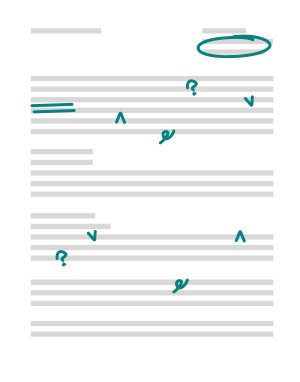
Is your resume working?
Find out with a free review from ZipJob.
Get a free resume review today
Our experts will review your resume’s grammar, layout, and ability to pass ATS — all free and delivered straight to your inbox.
PROTECT YOUR DATA
This site uses cookies and related technologies for site operation, and analytics as described in our Privacy Policy. You may choose to consent to our use of these technologies, reject non-essential technologies, or further manage your preferences.
- • Directed a multi-sector research project evaluating the impact of digital resources in academic environments, benefiting over 30 institutions.
- • Implemented innovative qualitative research methods that increased project efficiency by 25%.
- • Authored impactful research reports presented at national conferences, influencing educational policy directions.
- • Supervised and mentored a team of 3 junior analysts, improving team productivity and research output quality.
- • Managed project timelines and deliverables for complex studies, resulting in 95% on-time completion rate.
- • Developed strong professional relationships with stakeholders and collaborators, which led to securing 2 significant research grants.
- • Conducted in-depth analysis on STEM education trends, influencing curriculum development for 100+ educational institutions.
- • Played a critical role in a team that delivered 4 major research projects yearly, exceeding stakeholder expectations.
- • Managed cross-functional teams, increasing overall project efficiency by 15%.
- • Presented research findings at 10+ industry conferences, enhancing the company's professional reputation.
- • Leveraged advanced data collection tools to gather and analyze information from over 500 interview subjects.
- • Assisted in the preparation of grant proposals that secured funding of over $500,000 for environmental research.
- • Organized and managed data collection for a large-scale research study on conservation best practices.
- • Played a key role in publishing 3 research papers that contributed to new sustainability guidelines.
- • Supported senior researchers in conducting fieldwork and data analysis for interdisciplinary research projects.
13 Researcher Resume Examples & Guide for 2024
Your researcher resume must demonstrate your expertise in your field. Clearly highlight publications, presentations, or projects you've contributed to. Showcase your analytical and data collection skills. Elaborate on the methodologies you're proficient with to prove your technical capabilities.
All resume examples in this guide
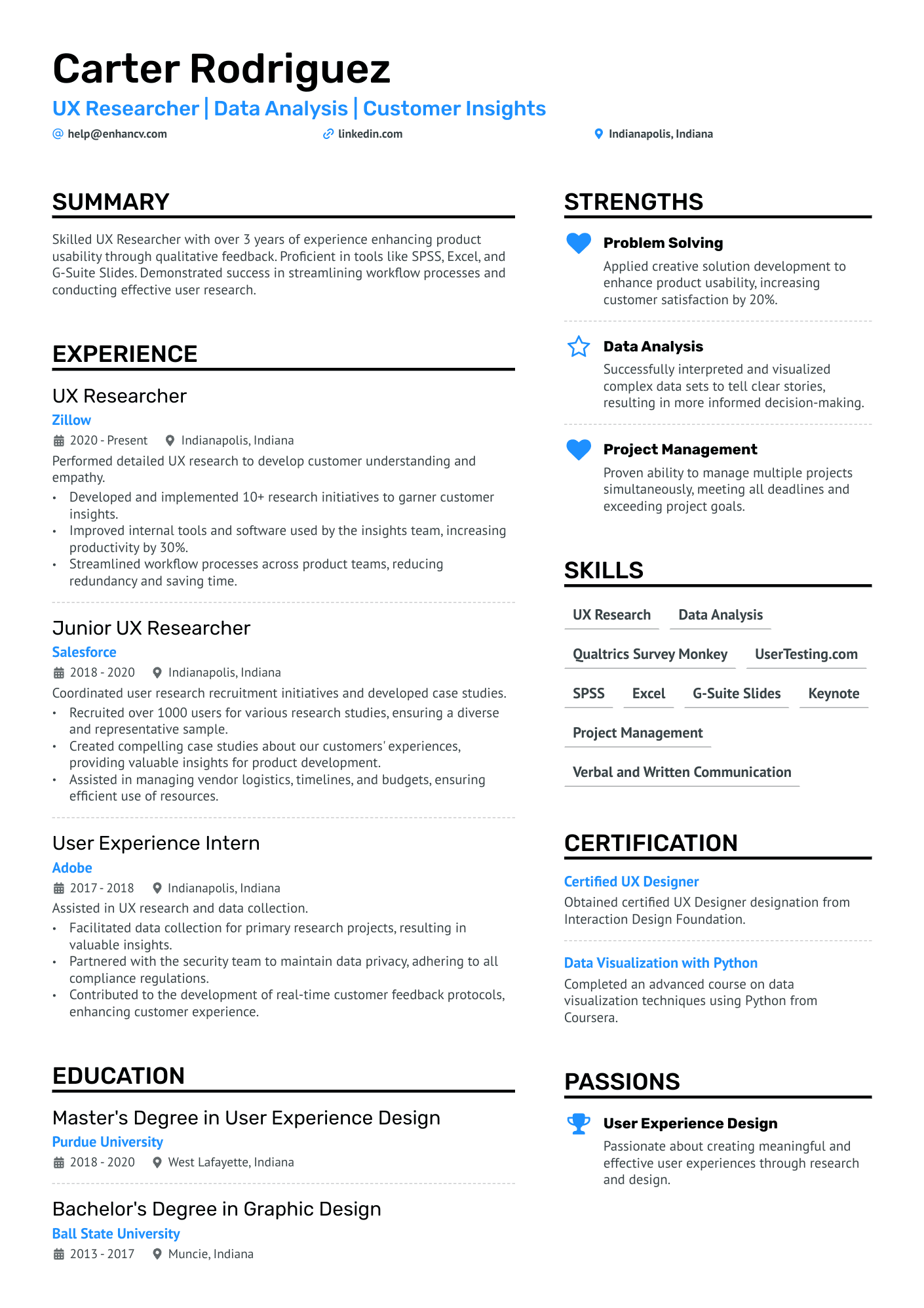
UX Researcher
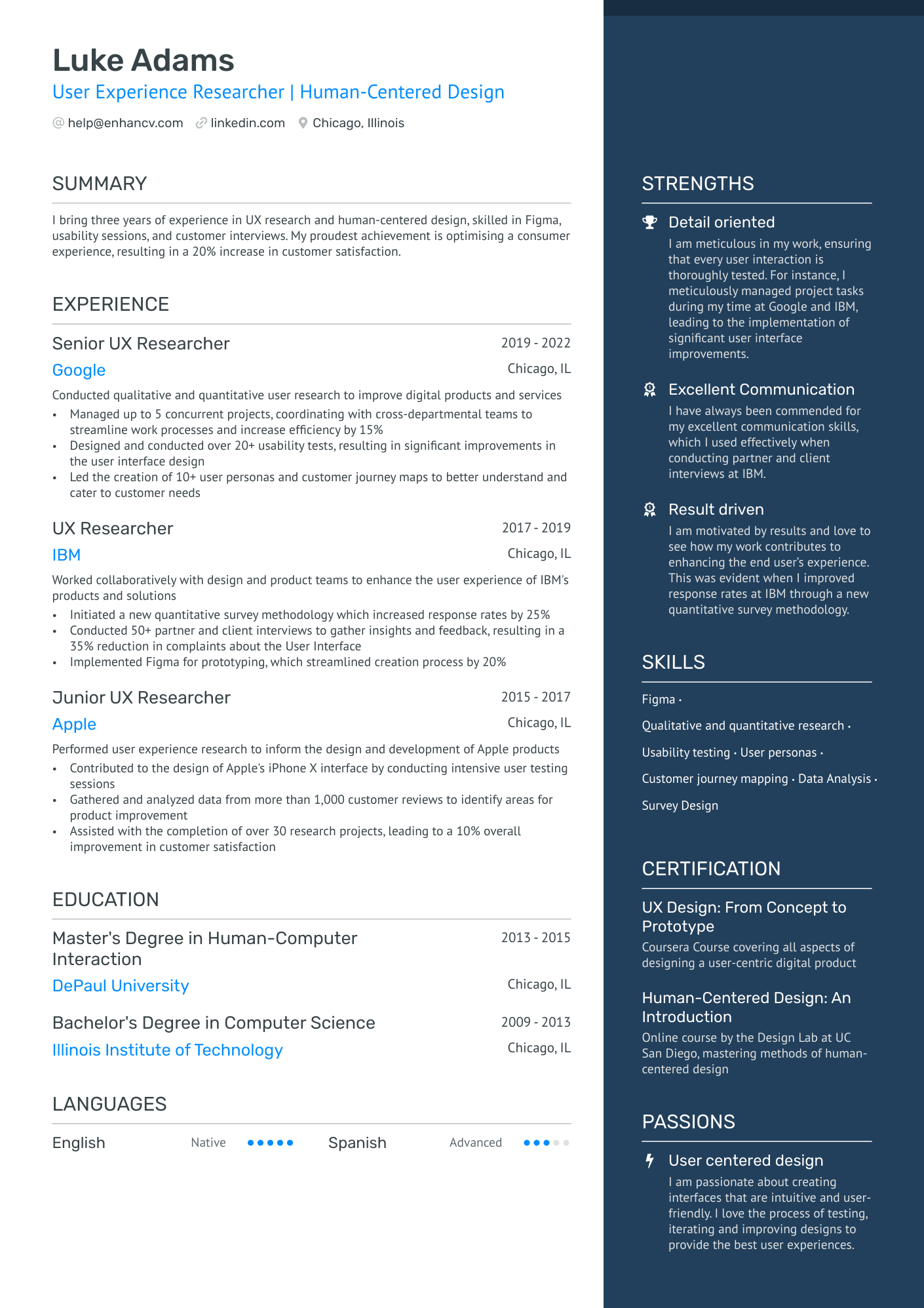
User Researcher
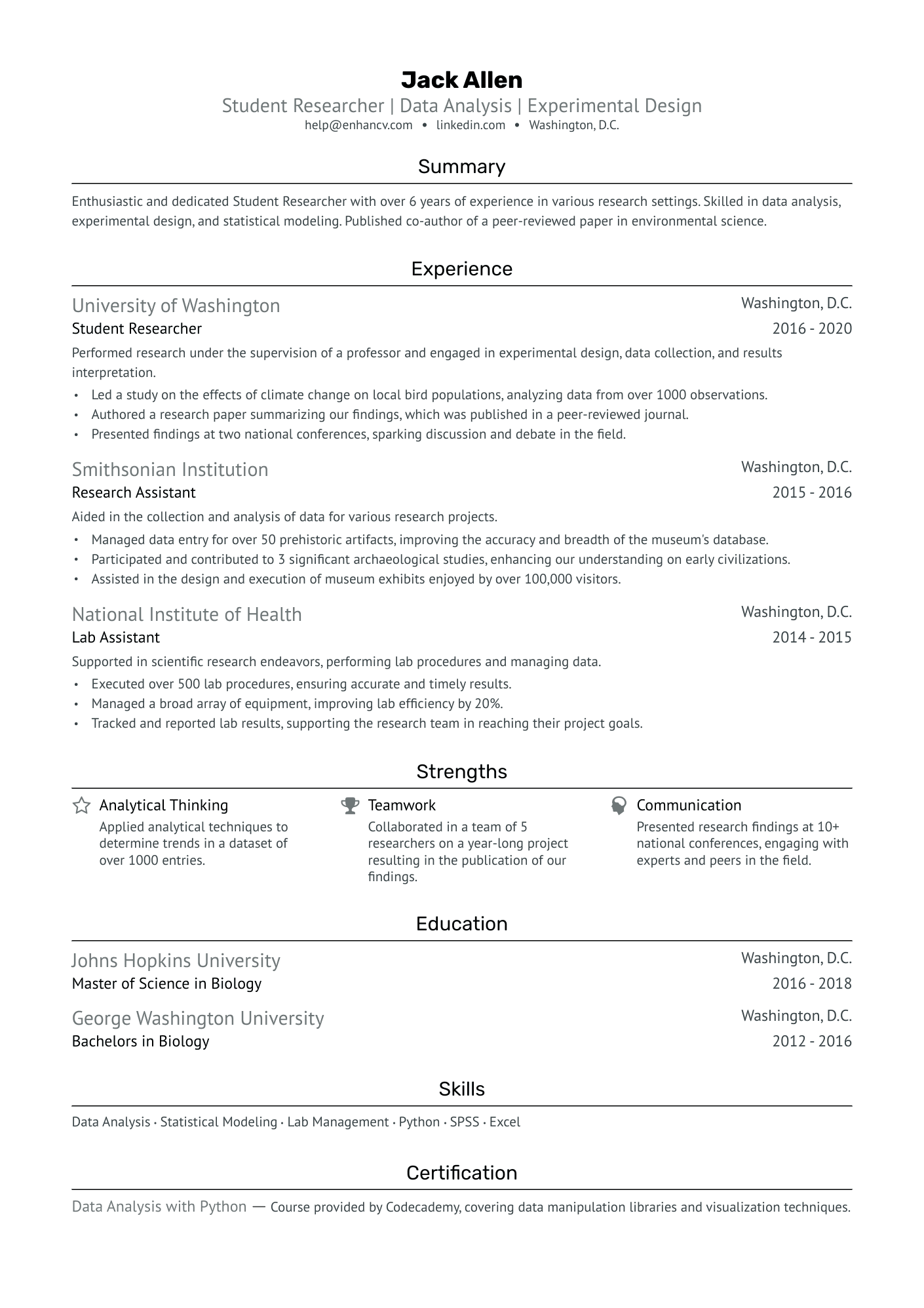
Student Researcher
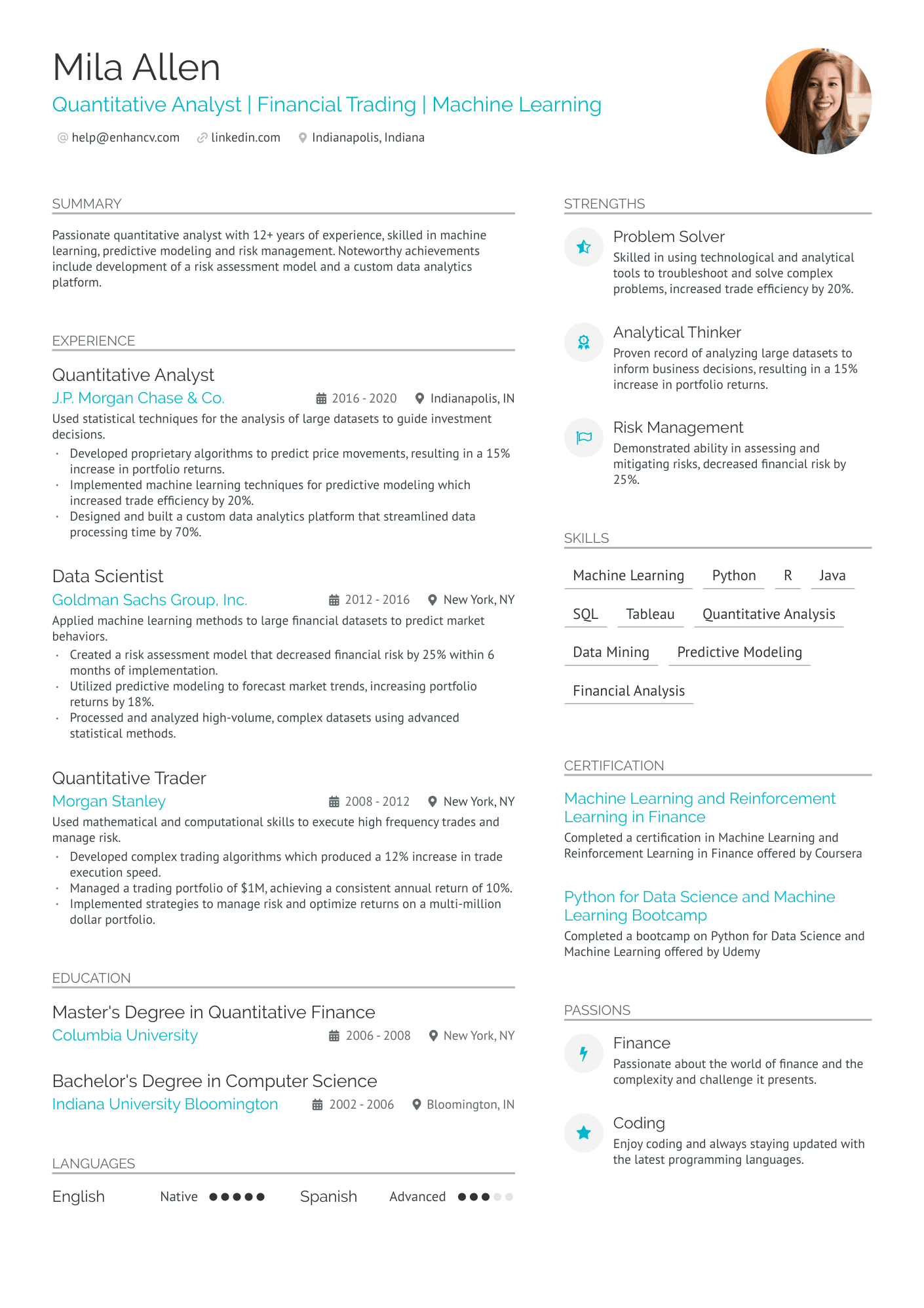
Quantitative Researcher
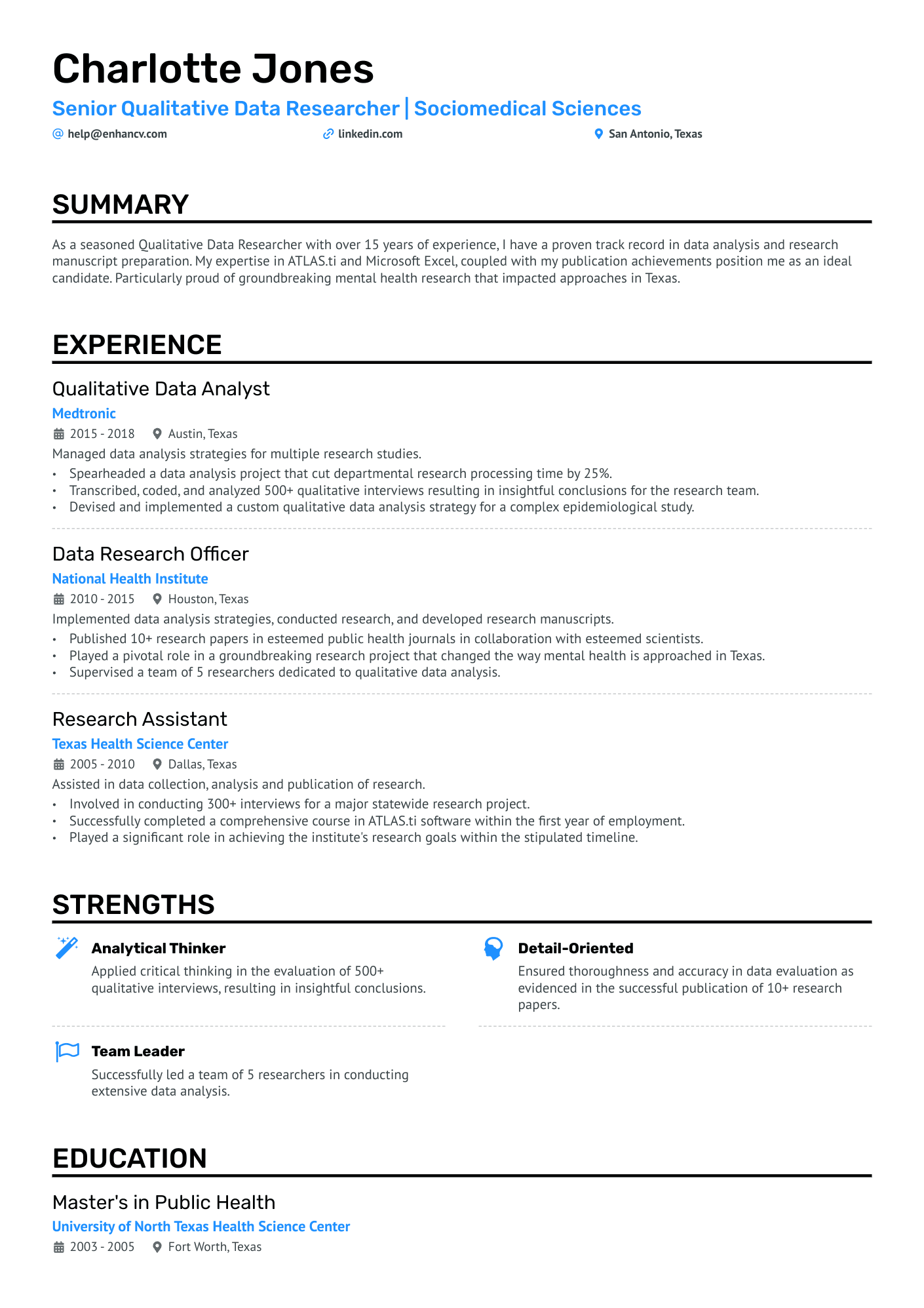
Qualitative Researcher
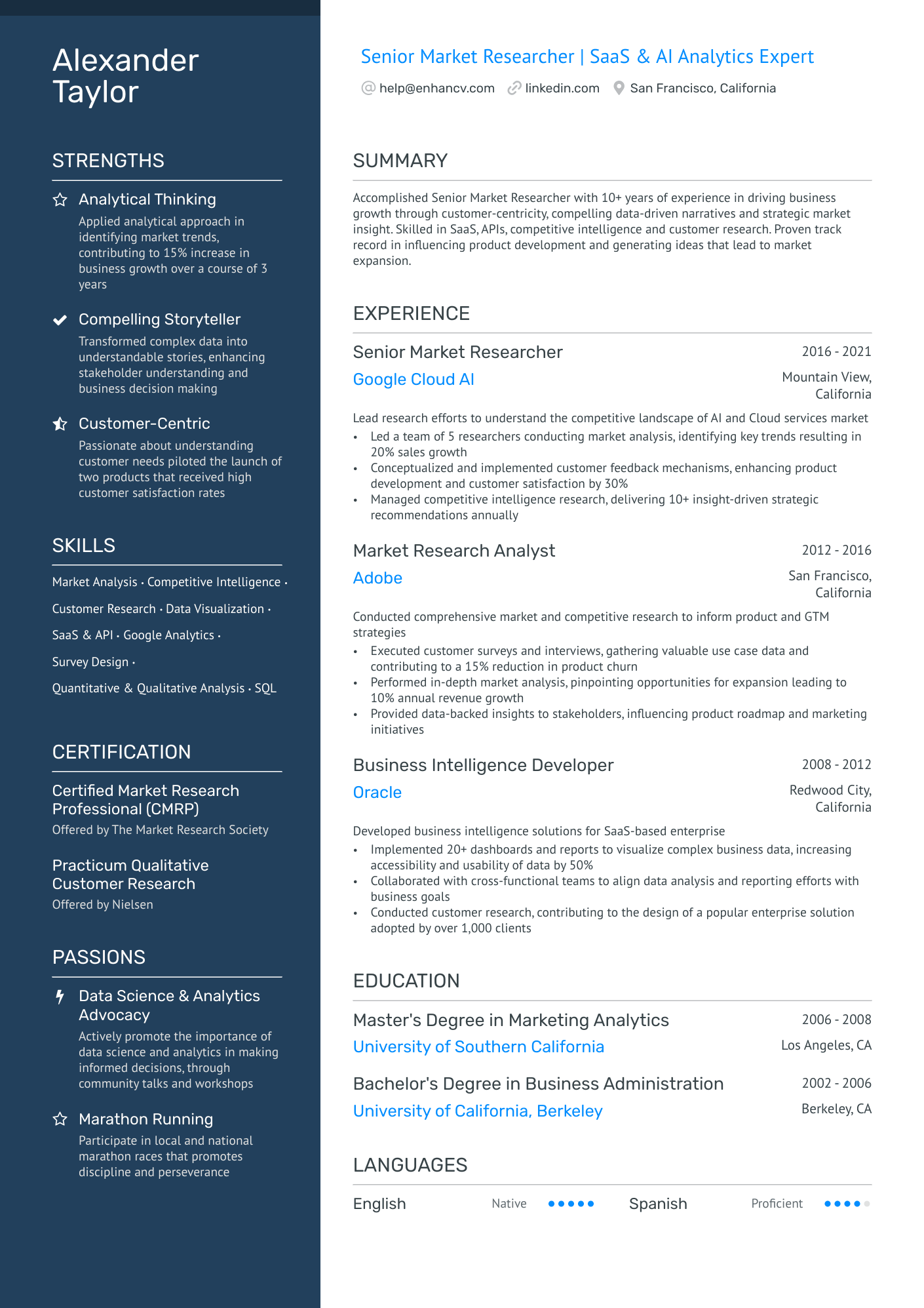
Market Researcher
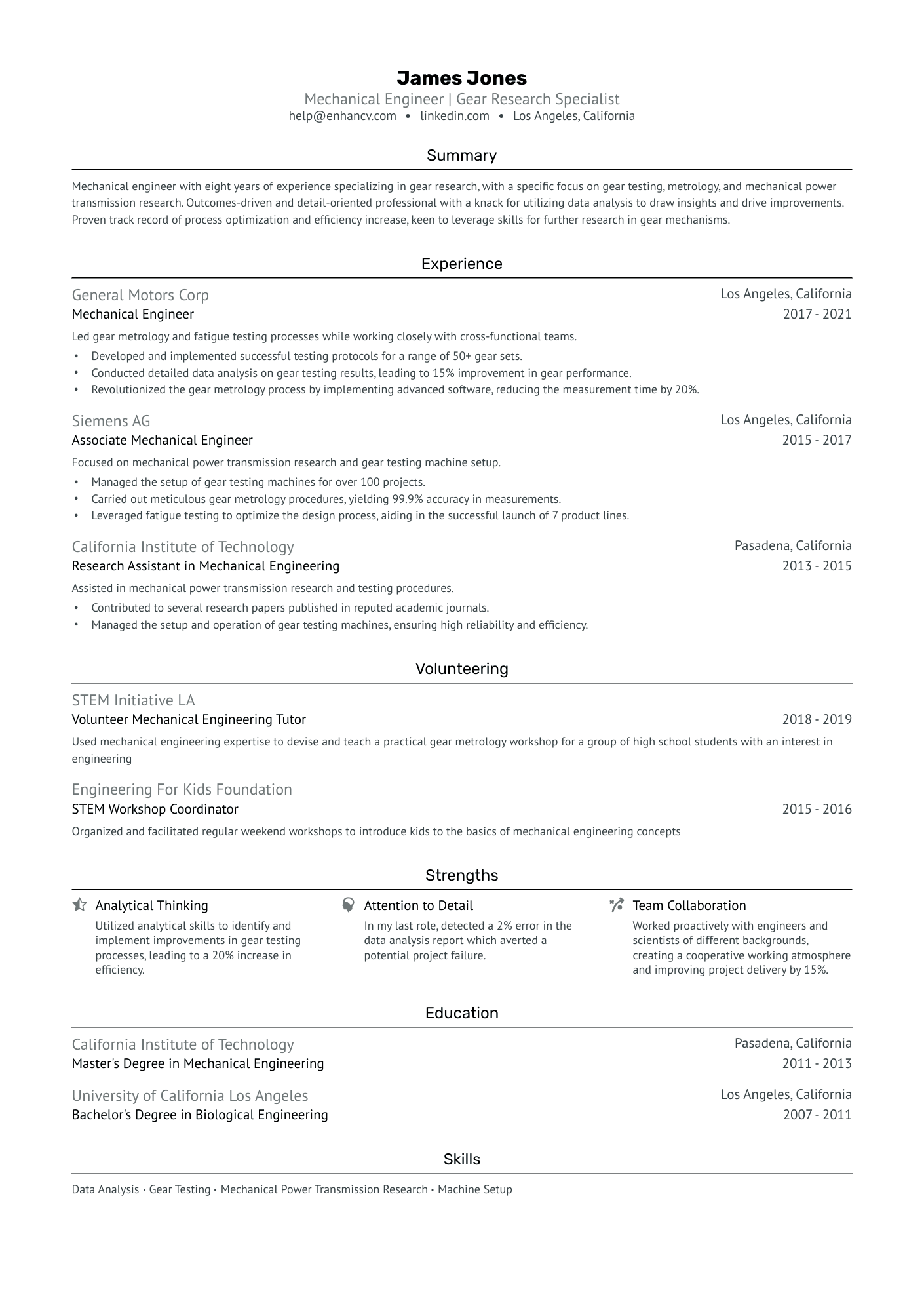
Undergraduate Researcher
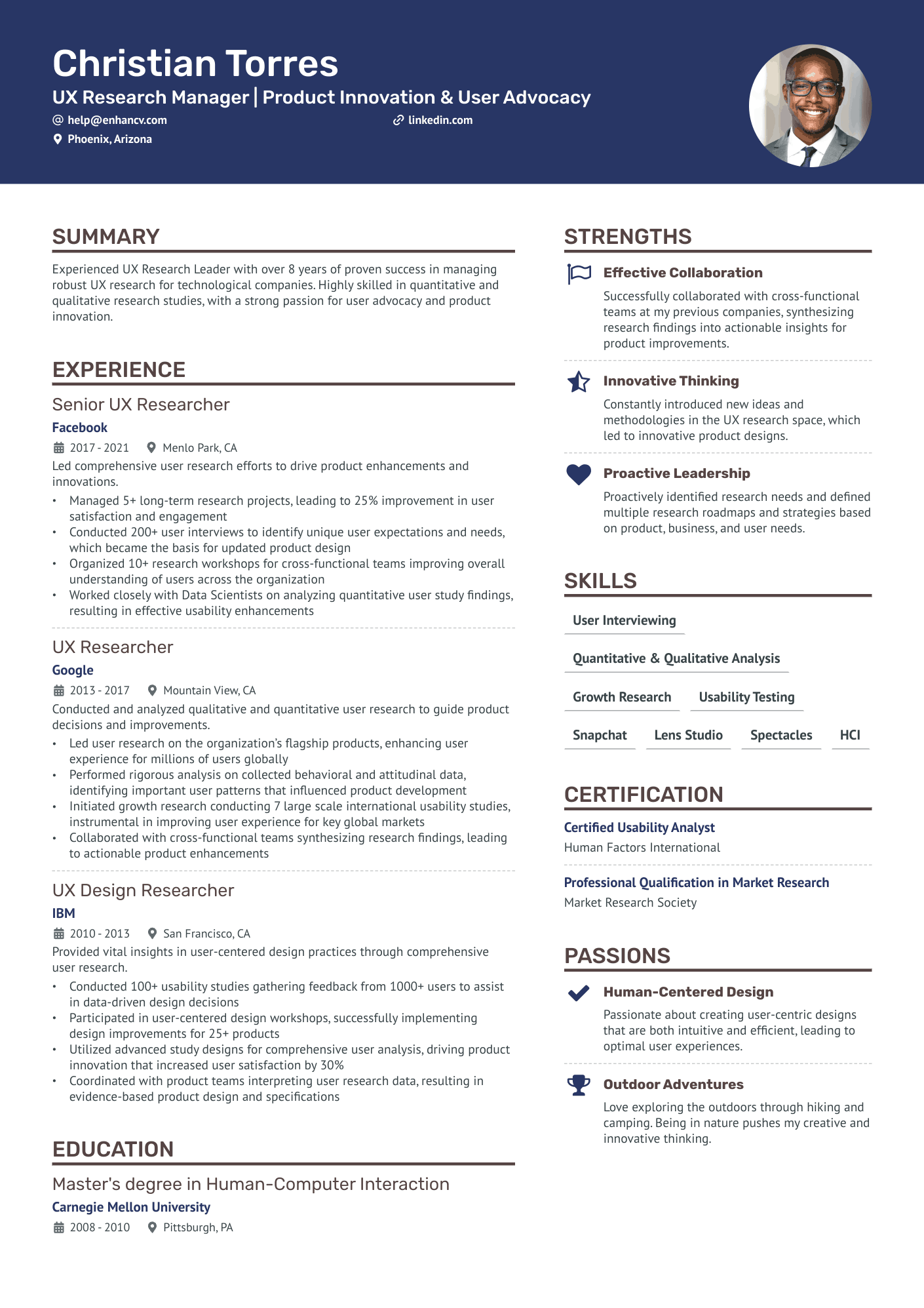
Product Researcher
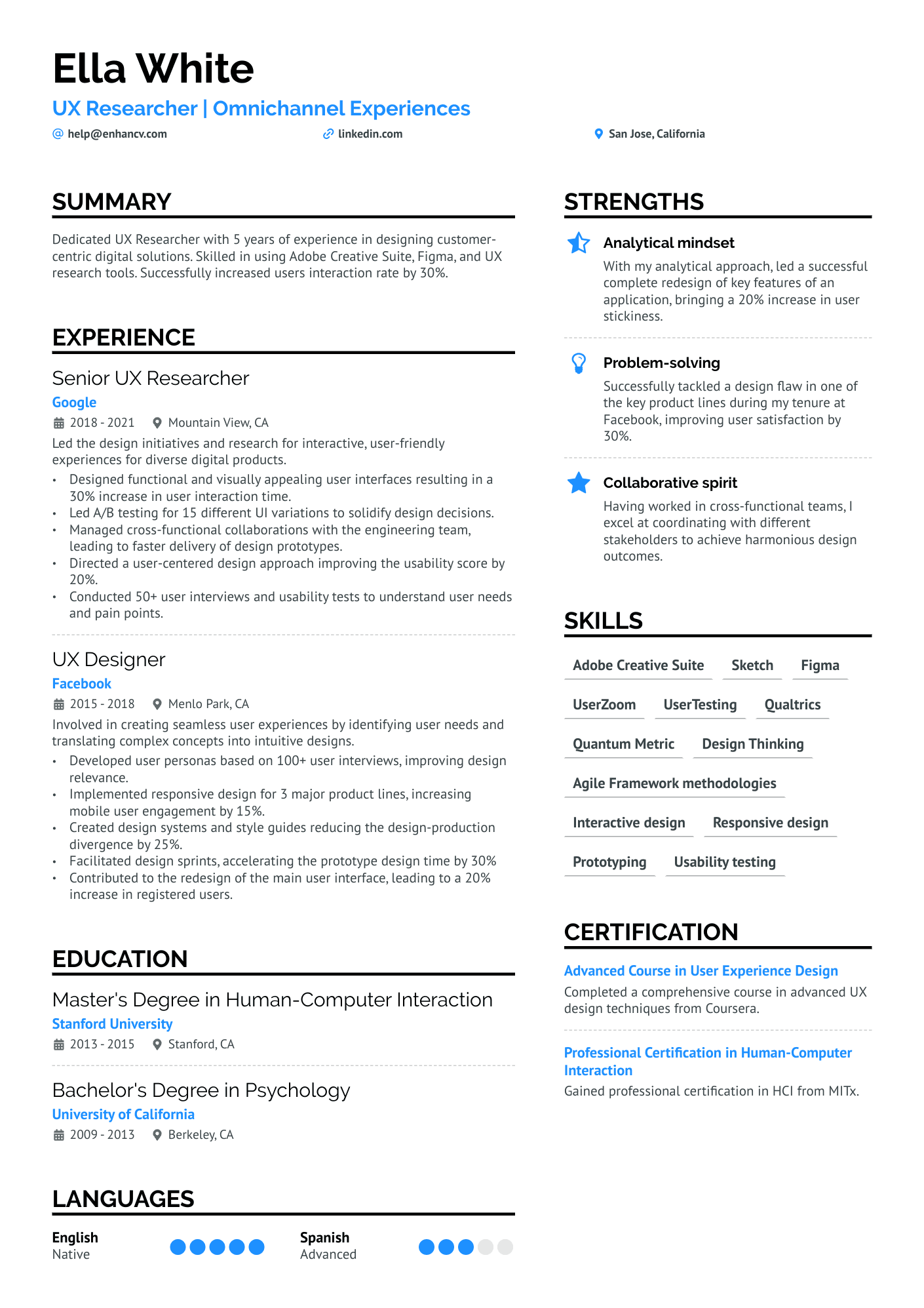
Psychology Researcher
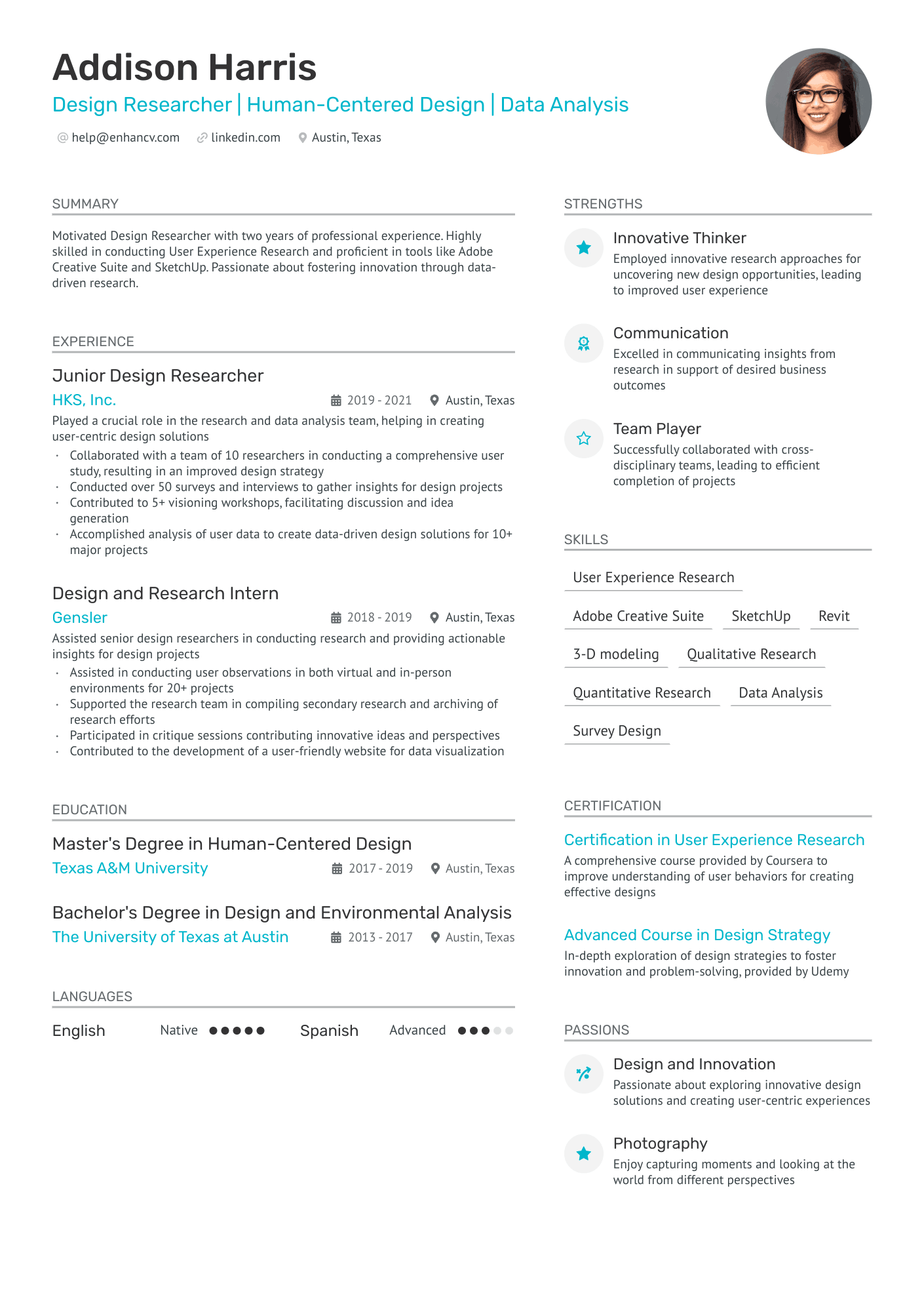
Design Researcher
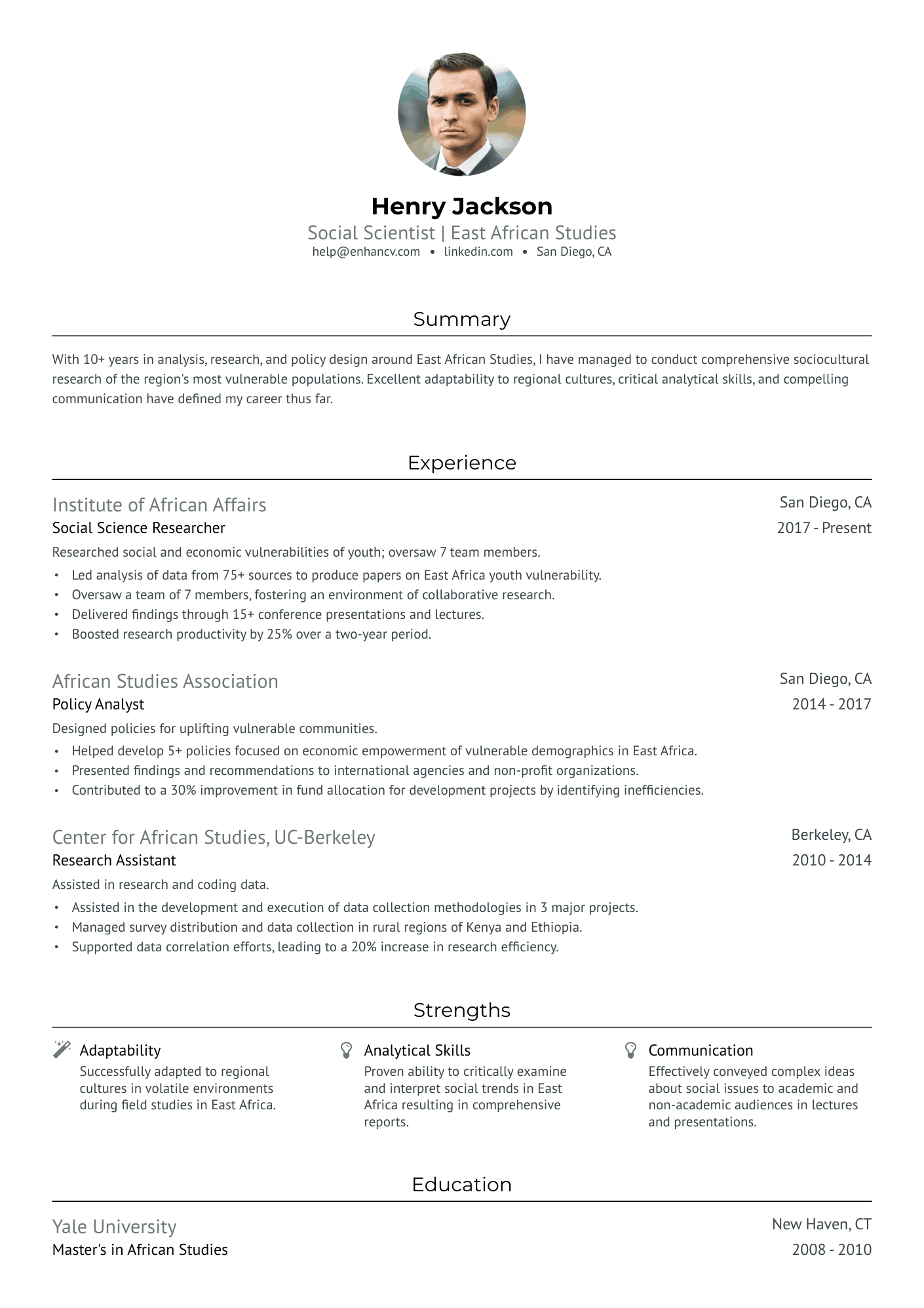
Lab Researcher
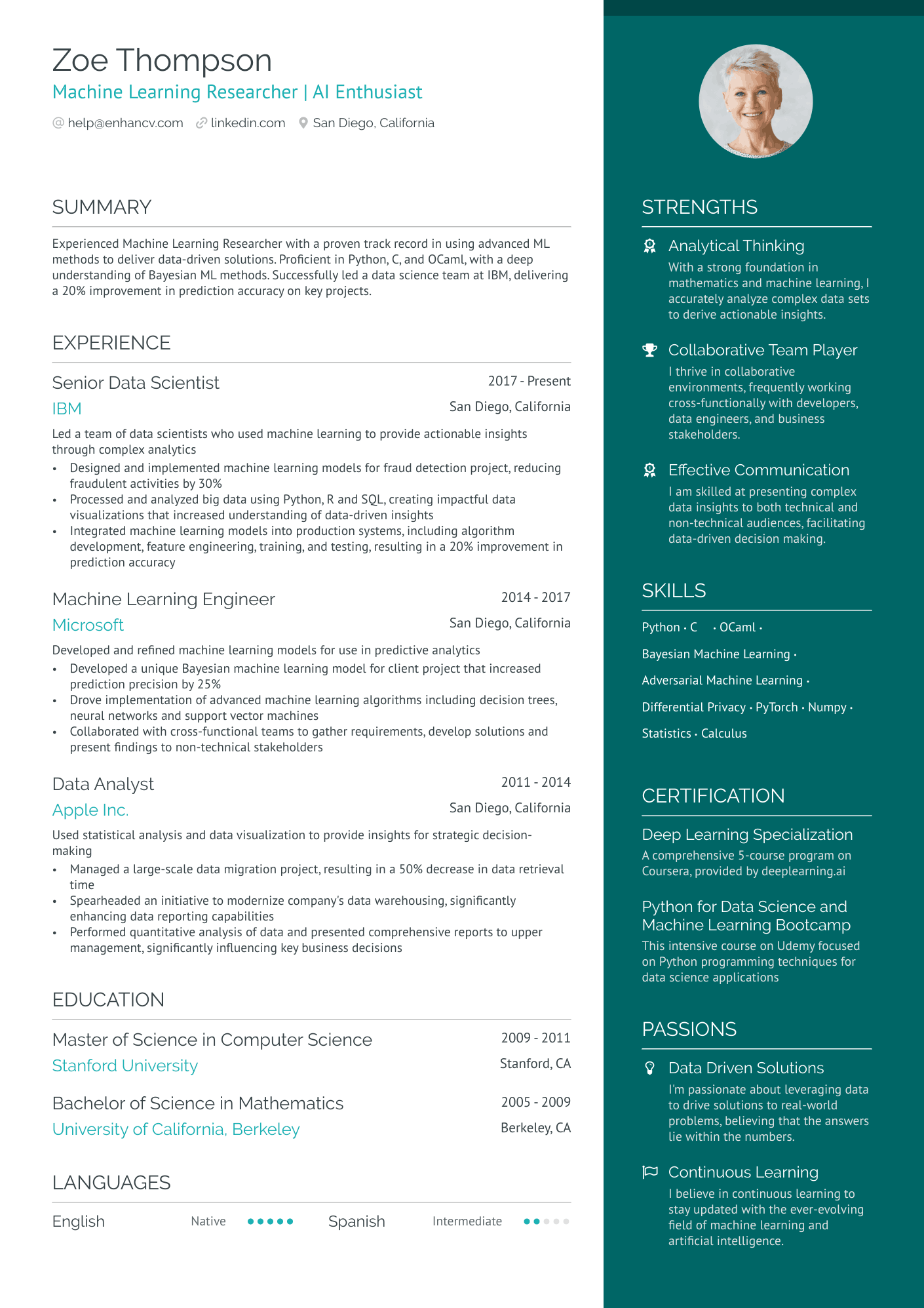
Machine Learning Researcher
Resume guide.
Resume Format Tips
Resume Experience
Skills on Resume
Education & Certifications
Resume Summary Tips
Additional Resume Sections
Key Takeaways

As a researcher, you may struggle with translating your extensive project experience into a concise format that appeals to a broad range of employers. Our guide will provide you with tailored strategies to effectively distill your research accomplishments into an impactful resume that resonates across industries.
- Utilize real-life examples to refine your researcher resume;
- Effectively write the experience section of your researcher resume, even if you have minimal or no professional experience;
- Incorporate the industry's top 10 essential skills throughout your resume;
- Include your education and certifications to highlight your specific expertise.
If the researcher resume isn't the right one for you, take a look at other related guides we have:
- Lab Manager Resume Example
- Lab Technician Resume Example
- Scientist Resume Example
- Chemist Resume Example
- Research Assistant Resume Example
- Lab Assistant Resume Example
- Research Director Resume Example
- Radiologic Technologist Resume Example
- Research Manager Resume Example
- Research Associate Resume Example
Simple guide to your researcher resume format and layout
- professional experience - use the reverse-chronological resume format;
- skills and achievements - via the functional skill-based resume format;
- both experience and skills - with a hybrid resume format .
What is more, keep in mind that your resume may be initially assessed by the ATS (Applicant Tracker System) (or the software used by companies in the hiring process). The researcher resumes that suit the ATS:
- have a header that includes either a role keyword or the job you're applying for;
- should be no longer than two pages;
- be submitted as PDF, unless specified otherwise.
Upload & Check Your Resume
Drop your resume here or choose a file . PDF & DOCX only. Max 2MB file size.
If you happen to have some basic certificates, don't invest too much of your researcher resume real estate in them. Instead, list them within the skills section or as part of your relevant experience. This way you'd ensure you meet all job requirements while dedicating your certificates to only the most in-demand certification across the industry.
The five (plus) definite sections your resume for a researcher job should include are:
- Header with your headline, contact details, and/or a preview of your work
- Summary (or objective) to pinpoint how your success aligns with the role
- Experience with bullets of your most relevant achievements in the field
- Skills to integrate vital job requirements (both technical and personal)
- Your further dedication to the field, showcased via relevant higher education and/or certifications
What recruiters want to see on your resume:
- Publishing Record: Evidence of publications in reputable journals or conferences relevant to the field.
- Research Experience: Detailed description of past research projects, roles, and contributions.
- Grant Writing Skills: Demonstrated success in securing research funding from grants, fellowships, or scholarships.
- Technical Expertise: Proficiency with tools and methodologies specific to the research area, like statistical analysis software, lab techniques, or data analysis programs.
- Collaboration and Communication: Examples of working effectively within interdisciplinary research teams and communicating complex research findings to diverse audiences.
Creating your researcher resume experience to catch recruiters' attention
Remember that for the researcher role, hiring managers are looking to see how your expertise aligns with their requirements. Here's where your resume experience section can help out. Make sure you:
- Include mainly roles that are relevant to the researcher job you're applying for;
- Don't go too far back in your experience - recruiters will only care what you did a decade ago if it's really important for the researcher role;
- Each bullet you include should say what you did, followed by the skills you used and the actual end result of your efforts;
- Quantify each of your achievements with numbers and possibly the overall effect it had on the organization;
- Highlight transferrable skills - or personal skills you've attained thanks to past jobs - that could be applicable within your potential workplace. This would showcase your unique value as a professional.
Formatting the experience section of your resume doesn't have to be an over-the-top deep dive into your whole career. Follow the researcher resume examples below to see how industry-leading professionals are presenting their experience:
- Designed and executed a comprehensive experimental study on the effects of new agricultural chemicals, increasing crop yields by 20% over a two-year period.
- Authored and co-authored 6 peer-reviewed journal articles in the field of synthetic biology, enhancing the company's academic presence and fostering collaborative opportunities.
- Mentored a team of junior researchers and interns, improving team productivity by 30% and helping to establish a robust research pipeline.
- Implemented new data collection protocols for patient trials, which improved data accuracy by 25% and ensured regulatory compliance.
- Coordinated with cross-functional teams to manage over 15 multi-center clinical trials, ensuring that deadlines were met and budgets were maintained.
- Presented findings at 3 international conferences, significantly raising the profile of the research programs and attracting future funding.
- Led the research and prototype development for a new medical device, which subsequently received FDA approval and led to a 150% increase in departmental revenue.
- Coordinated with a team of scientists to integrate artificial intelligence in the device's diagnostic process, improving prediction accuracy by 35%.
- Managed the intellectual property process for developed technologies, resulting in the granting of 5 patents and protecting the company's assets.
- Analyzed consumer behavior data and trends to inform the company's marketing strategies, contributing to a 40% increase in market share.
- Developed and administered over 200 surveys and focus groups to gather actionable customer insights, directly influencing product development.
- Worked directly with the sales team to refine target demographics, which led to more effective ad spend and a 25% increase in conversion rates.
- Directed a groundbreaking research initiative on renewable energy that secured $2M in grants from government and private sectors.
- Managed collaborations with industry partners to test and refine prototype solar panels, achieving a 50% increase in efficiency over existing models.
- Organized and chaired a successful international symposium on sustainable energy, fostering partnerships that led to further R&D investments.
- Led the development of a novel gene-editing platform, which resulted in a 200% increase in experiment throughput and reduced costs by 40%.
- Collaborated with pharmaceutical companies to leverage the platform for drug development, accelerating the timeline from discovery to preclinical trials.
- Managed the submission of regulatory documents for new research protocols, ensuring full compliance with all federal and state regulations.
- Processed and analyzed big data sets using advanced analytics tools, uncovering patterns that led to a 20% improvement in operational efficiency.
- Developed custom scripts and algorithms to automate data collection processes, saving the company an average of 250 man-hours per month.
- Designed an interactive dashboard that provided real-time insights into market trends, which became a key decision-making tool for the executive team.
- Monitored patient enrollment and data integrity for over 10 international clinical trials, ensuring adherence to study protocols and Good Clinical Practice guidelines.
- Provided key contributions to the successful launch of a Phase III trial, which saw a 95% retention rate of study participants due to enhanced engagement strategies.
- Developed training materials and conducted workshops for new clinical research coordinators, greatly improving the effectiveness and compliance of the research team.
Quantifying impact on your resume
- Include the number of publications you've authored to demonstrate the depth and breadth of your research experience.
- List the amount of research funds you've secured, as it shows your capability to attract significant financial resources for your work.
- State the number of experiments or studies you've conducted to quantify your hands-on experience in your field.
- Mention the number of citations your work has received to reflect its influence and acceptance in the research community.
- Highlight the size of the research teams you've led or participated in to show your collaborative and leadership skills.
- Detail the number of conferences you've presented at to exhibit your ability to communicate your findings to a professional audience.
- Provide the percentage by which your findings have improved a process or technique within your field to illustrate the practical impact of your research.
- Specify the number of patents you hold, if applicable, to demonstrate innovation and potential for commercial application of your work.
Action verbs for your researcher resume

Four quick steps for candidates with no resume experience
Those with less or no relevant experience could also make a good impression on recruiters by:
- Taking the time to actually understand what matters most to the role and featuring this within key sections of their resume
- Investing resume space into defining what makes them a valuable candidate with transferrable skills and personality
- Using the resume objective to showcase their personal vision for growth within the company
- Heavily featuring their technical alignment with relevant certifications, education, and skills.
Remember that your resume is about aligning your profile to that of the ideal candidate.
The more prominently you can demonstrate how you answer job requirements, the more likely you'd be called in for an interview.
Recommended reads:
- How To Include Your Relevant Coursework On A Resume
- How to List Continuing Education on Your Resume
The more trusted the organization you've attained your certificate (or degree) from, the more credible your skill set would be.
Balancing hard and soft skills in your researcher resume
Recruiters indeed pay close attention to the specific hard and soft skills candidates possess. Hard skills refer to technical abilities or your proficiency in technologies, while soft skills are the personal attributes and qualities developed over your lifetime.
If you're unsure about effectively quantifying these skills on your resume, follow our step-by-step guide. It's crucial to first understand the key job requirements for the role. Doing so enables you to accurately list your:
- Hard skills in sections like skills, education, and certifications. Your technical expertise is straightforward to quantify. Most organizations find it sufficient to mention the certificates you've earned, along with your proficiency level.
- Soft skills within your experience, achievements, strengths, etc. Defining interpersonal communication traits in your resume can be challenging. Focus on showcasing the accomplishments you've achieved through these skills.
Remember, when tailoring your researcher resume, ensure that the skills you list match exactly with those in the job requirements. For instance, if the job listing specifies "Microsoft Word," include this exact term rather than just "Word" or "MSO."
Top skills for your researcher resume:
Data Analysis
Statistical Analysis
Qualitative Research
Quantitative Research
Research Design
Literature Review
Data Collection
Data Interpretation
Academic Writing
Scientific Publication
Critical Thinking
Problem Solving
Attention to Detail
Time Management
Communication
Adaptability
Project Management
Ethical Judgment
List your educational qualifications and certifications in reverse chronological order.
The importance of your certifications and education on your researcher resume
Pay attention to the resume education section . It can offer clues about your skills and experiences that align with the job.
- List only tertiary education details, including the institution and dates.
- Mention your expected graduation date if you're currently studying.
- Exclude degrees unrelated to the job or field.
- Describe your education if it allows you to highlight your achievements further.
Your professional qualifications: certificates and education play a crucial role in your researcher application. They showcase your dedication to gaining the best expertise and know-how in the field. Include any diplomas and certificates that are:
- Listed within the job requirements or could make your application stand out
- Niche to your industry and require plenty of effort to obtain
- Helping you prepare for professional growth with forward-facing know-how
- Relevant to the researcher job - make sure to include the name of the certificate, institution you've obtained it at, and dates
Both your certificates and education section need to add further value to your application. That's why we've dedicated this next list just for you - check out some of the most popular researcher certificates to include on your resume:
The top 5 certifications for your researcher resume:
- Project Management Professional (PMP) - Project Management Institute
- Certified Research Administrator (CRA) - Research Administrators Certification Council
- Institutional Review Board Professional (CIP) - Public Responsibility in Medicine and Research
- Certified Clinical Research Professional (CCRP) - Society of Clinical Research Associates
- Data Analysis & Statistics Certificate (DASC) - Various Institutions
Highlight any significant extracurricular activities that demonstrate valuable skills or leadership.
- When Should You Include Your High School on Your Resume?
- How To List Certifications On A Resume (Examples Included)
Researcher resume summary or objective? The best choice is based on your experience
If you're wondering about the relevancy of the resume summary or the resume objective to your Researcher application - here's the truth.
The summary and objective provide recruiters with your expertise and accomplishments at a glance, within an up-to-five-sentence structure.
The difference is that the:
- Resume objective is also more focused on emphasizing your career goals. The objective is the perfect fit for (potentially more junior) candidates who'd like to balance their relevant experience with their career goals.
- Resume summary can provide you with space to also detail the unique value of what it's like to work with you. Researcher candidates who have many noteworthy accomplishments start from the get-go with their summary.
Ensure that either type of resume introduction presents your Researcher expertise in the best light and aligns it with the job advert.
The more details you can provide with numbers, the more compelling your resume summary or objective will be.
Real-world Researcher candidates follow these frameworks in writing their resume summaries and objectives.
The end results are usually as such:
Resume summaries for a researcher job
- With a decade of profound experience in molecular biology, an extensive publication record, and a Ph.D. from MIT, the candidate is adept in genomics, proteomics, and bioinformatics. Awarded with the Young Scientist Award, they have led teams in groundbreaking cancer research, yielding patents and significant advancements in targeted therapy.
- A seasoned chemist with 15 years at GlaxoSmithKline specializing in pharmaceutical development, pivoting into biotechnology research with a strong desire to apply synthetic chemistry skills towards developing novel biologics. Recognized for innovation in small molecule synthesis, keen to contribute to interdisciplinary approaches in disease treatment.
- Former aerospace engineer with 12 years' tenure at NASA seeking to transition into climate research. Armed with robust analytical skills, a deep understanding of complex systems, and a master’s degree in environmental engineering, aiming to utilize simulation modeling to address pressing environmental challenges and climate change.
- After years of developing market forecasts and data models for economic research at a leading think tank, the candidate is eager to transfer their refined quantitative analysis skills into computational neuroscience research. With a strong grasp of machine learning and predictive analytics, they are ready to contribute to elucidating neural network functionalities.
- Graduating magna cum laude with a B.S. in biology, the applicant is enthusiastic about beginning a research career in immunology. Committed to lifelong learning and making impactful contributions, they are determined to leverage their strong foundation in cell biology and genetics to aid in developing innovative immunotherapies.
- As an ambitious recent graduate with a Master's in Computer Science and a passion for algorithm design, I am eager to delve into the world of bioinformatics research. With a zest for problem-solving and a commitment to advancing healthcare through technology, I aim to contribute to projects focused on genetic data analysis and personalized medicine.
Showcasing your personality with these four researcher resume sections
Enhance your researcher expertise with additional resume sections that spotlight both your professional skills and personal traits. Choose options that not only present you in a professional light but also reveal why colleagues enjoy working with you:
- My time - a pie chart infographic detailing your daily personal and professional priorities, showcasing a blend of hard and soft skills;
- Hobbies and interests - share your engagement in sports, fandoms, or other interests, whether in your local community or during personal time;
- Quotes - what motivates and inspires you as a professional;
- Books - indicating your reading and comprehension skills, a definite plus for employers, particularly when your reading interests align with your professional field.
Key takeaways
At the end of our guide, we'd like to remind you to:
- Invest in a simple, modern resume design that is ATS friendly and keeps your experience organized and legible;
- Avoid just listing your responsibilities in your experience section, but rather focus on quantifiable achievements;
- Always select resume sections that are relevant to the role and can answer job requirements. Sometimes your volunteering experience could bring more value than irrelevant work experience;
- Balance your technical background with your personality traits across various sections of your resume to hint at how much time employers would have to invest in training you and if your profile would be a good cultural fit to the organization;
- Include your academic background (in the form of your relevant higher education degrees and certifications) to show recruiters that you have the technical basics of the industry covered.
Researcher resume examples
Explore additional researcher resume samples and guides and see what works for your level of experience or role.

Looking to build your own Researcher resume?

- Resume Examples
How to Email a Cover Letter – Pro Emailing Tips for Job Hunters
Resume critique like a pro: 11 steps walkthrough, the resumes of chernobyl, 12 great jobs for seniors (with tips), your personal mission statement guide: why and how to write one (with 10+ examples and 3 templates), myers-briggs cheat sheet: expert advice on the best careers based on personality.
- Create Resume
- Terms of Service
- Privacy Policy
- Cookie Preferences
- Resume Templates
- AI Resume Builder
- Resume Summary Generator
- Resume Formats
- Resume Checker
- Resume Skills
- How to Write a Resume
- Modern Resume Templates
- Simple Resume Templates
- Cover Letter Builder
- Cover Letter Examples
- Cover Letter Templates
- Cover Letter Formats
- How to Write a Cover Letter
- Resume Guides
- Cover Letter Guides
- Job Interview Guides
- Job Interview Questions
- Career Resources
- Meet our customers
- Career resources
- English (UK)
- French (FR)
- German (DE)
- Spanish (ES)
- Swedish (SE)
© 2024 . All rights reserved.
Made with love by people who care.
- Resume Templates
- Resume Examples
- Free Resume Builder
- How to Write a Resume
- Resume Format
- Resume Packs
- Cover Letter Templates
- Cover Letter Examples
- Free Cover Letter Generator
- How To Write a Cover Letter
- CV Templates
- CV Examples
- Free CV Maker
- Resume Help
- Cover Letter Help
- Job Interview
- Career Advice
How to Put Research on a Resume: Tips and Examples
When most people think of research, they think of scientists in labs or graduate students trying to complete a thesis or dissertation. The truth is research comes in many types and forms.
Have you ever analyzed how target audiences interact with your product? Have you ever cross-checked product prices among the competition or compared which features their applications have? That’s also research.
The point is this: Many organizations are looking for people with strong analytical skills and research experience, even in areas that do not directly relate to the product or service they provide. Why? Because “research” is a skill that carries over into all academic, scientific, and business endeavors.
So whenever you’re perusing job posts, always check if mentioning your research experience may be helpful. If so, you will need to know how to include your research experience on a resume.
How to Put Research Experience on Resume?
Research experience belongs to the Work Experience section of your resume. Depending on your field of work, you can either mention some of your research skills when describing your work duties and accomplishments.
Or, if you’re working on a scientific resume for an academic position, you can set up a separate Research section on your resume (or even share your research work as a separate attachment).
At any rate, your research experience must be presented in a logical and coherent manner. Here’s how you put research on your resume:
- List all research work you have done previously, no matter what kind it may have been. It may have been academic research from your schooling. It may have been market research you did in your previous positions.
- Take a lingering look at the job description for the role you’re after. Scan the applicant requirements section for specific research skills.
- Cherry-pick the most relevant research experiences to include in your resume (yes, every resume has to be customized to the job description!).
- Include all your research directly in the sections of your resume that summarize your current and previous positions. If you can quantify the results of your research, do so. Employers like to see actual numbers.
Sample Entry for Research Experience on a Resume
Let’s say you’re after a Product Marketing Manager position with a SaaS company. The job ad says they’re looking for candidates, experienced in doing market research, segmented customer demographics studies, and brand messaging split testing. You have those skills. Here is how you might include them in your resume.
XYZ Corp. 2018-Present Position: Market Researcher Responsible for analysis of customer satisfaction with current products
- Conduct product satisfaction surveys on a weekly basis
- Analyze survey results using Power BI tools to understand the trends in user engagement, satisfaction, and attrition.
- Source additional qualitative data from customer support and sales teams to provide a more comprehensive analysis.
- Collaborate with the Product Owner and Program Manager on inputs for new product features.
ABC Corp. 2018-2019 Position: CRO Specialist Responsible for conceptualizing and implementing CRO strategies for e-commerce websites.
- Google Analytics, heatmaps, and session recording data to create conversion benchmarks for main landing pages.
- Make recommendations for changes in microcopy, CTA placements, and information layouts, page-by-page.
- Have improved the conversation rate by 23% for an international food retailer.
- Generated over $100K in revenue from one promotional landing page for a coffee retailer.
Sample Undergraduate Research on Resume
Here’s another option: You want to talk about relevant coursework in college. Any research you did as an undergraduate related to your career can be relevant, especially when you’re an entry-level candidate.
Again, read the job posting carefully, and see what will fit. Here’s a sample of how you can include it on your resume.
Education University of Missouri 2020 BS in Agriculture
Additional Information: Research Project
Conducted original research on the effects of phosphorus and nitrogen in soil samples on the growth of corn. Concluded with recommendations for percentages of each in the soil to achieve maximum growth.
How to Put Research Skills on Your Resume
First, understand this: Research experience and research skills are two very different things. Experience is actual research work that you have done. Skills indicate your ability to conduct research.
So you’ll want to list your skills separately from your academic or work projects. A good way to do so is by creating a featured skills section on your resume. Depending on the resume template you use, you can locate it in the sidebar area or header.
Good Research Skills for a Resume
Need some ideas? Here are several examples of resume-worth research skills:
- Research question development
- Field data collection
- Data aggregation and analysis
- Statistical models in Matlab
- Custom analytics projects in PyTorch
- Customer survey development
- Interview techniques
- Qualitative research design
- Experiment designs
Research experience is an important qualifier for so many career positions today. If you feel comfortable working with data and know a thing or two about statistical analysis, your value to any employer increases manyfold. So always give your research skills a prominent placement on your resume!

Elena runs content operations at Freesumes since 2017. She works closely with copywriters, designers, and invited career experts to ensure that all content meets our highest editorial standards. Up to date, she wrote over 200 career-related pieces around resume writing, career advice... more
you might also like

6 Best Colors For Your Resume (According to Pro Designers)

How to Put an Internship on a Resume: FAQs Answered

Resume Skills For Retail: Big List of Examples

90+ Childcare Skills For Your Resume (+ Daycare Worker Resume Example!)

The Ultimate List of Nursing Skills For a Resume
Leave a response cancel reply.
- Graduate School
Research Resume: Format, Structure and Samples
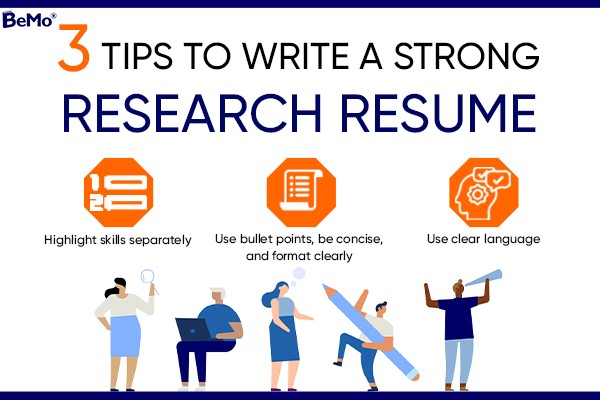
A research resume is crucial for presenting your research knowledge, skills, and suitability for a research position you are applying to. This is similar to how your law school resume presents your background with respect to the needs of an academic law program. Or, how your medical school resume presents information relevant to your medical background for med school applications. In this blog, we will look at what constitutes a good research resume and how you can create one. We will also look at some research resume examples so you can get some ideas for your own!
>> Want us to help you get accepted? Schedule a free strategy call here . <<
Article Contents 8 min read
What is a research resume.
A research resume presents your background specifically tailored to a research position. It is useful for you whether you are an undergrad or a grad student looking to apply for positions in research. It will help with med school applications , grad school applications, premed research opportunities , and other future academic endeavors you might undertake, regardless of your field. Also, research is not always lab work. It can include investigative studies in fields like liberal arts and physical sciences.
You have to create a strong resume to stand out among the other candidates. For this, highlight your relevant experience to show your potential. A good resume will complement other elements of your application. Think of your resume as the first point of interaction for your profile. A recruiter or an admission committee member doesn't know you personally but gets your information from your resume. A well-structured resume will serve its purpose of informing them about your qualifications and background clearly to help them determine whether you are suitable for the position or not.
Want to skip to a summary of our top 3 tips? Take a look at this infographic:
Your research resume has a significant part in helping a recruiter in understand your skills with respect to the position you have applied for. Thus, to illustrate your skills properly, you should include the following sections in your research resume:
If you have bagged an award at one of your previous jobs or academic positions, you should mention that in your resume. Your awards can include scholarships and grants, research awards, honorary recognition from the university, and more. These convey that your performance at your job has been exceptional. Similarly, if you have completed any particular certification such as a clinical research certification, you should mention that in your resume. ","label":"Achievements and Certifications","title":"Achievements and Certifications"}]" code="tab1" template="BlogArticle">
There might be a huge amount of information that you might wish to include in your research resume. However, present only your most recent and relevant details. Evaluate whether what you are mentioning in your research resume is related to the position or not Also, avoid including additional details with respect to your research interests, since you would be including other documents with your application that can outline these details, such as a research interest statement .
How to Format Your Research Resume
Complex resumes usually end up in the rejected pile, and this is something that you must be looking to avoid. The aim is to structure your research resume neatly and draw attention to skills and achievements to make an unforgettable impression on any recruiter. Usually, there are three main types of resume formats:
As evident from the name, a combination resume mixes both reverse-chronological and functional resume formats for providing information about both experiences and skills "}]" code="timeline1">
Despite the existence of other formats, the most used format for a research resume is a reverse-chronological resume.
Your work experience constitutes a major part of your resume, and it gives you the scope to highlight your past activities in such a way that your skills are aligned to the position that you are applying for. Here are the best ways to make your work experience stand out from other candidates:
Use appropriate keywords and phrases to highlight your accomplishments and qualifications. Find these my carefully going through the job ad. Use these keywords in your sentences to add to the relevance of your previous experience and skill set. Many institutions use an Applicant Tracking Systems to filter out resumes, based on the keywords related to the job. "}]">
Let’s take a look at an example to get a better idea:
XYZ State University Department
Research Assistant| Month 20XX - Month 20XX
- Managed a team of 6 research scholars for successful completion of ABC research project.
- Ensured all research databases and libraries are easily accessible to the research team.
- Isolated, purified, and analyzed RNA to assist senior researchers in lab work.
Since your research resume isn’t the only step in your recruitment, you should be clear about your past and avoid lying because you will be asked for further information post the initial resume screening. For instance, if you are applying for positions like a research assistant, you will be describing your experience in your research assistant interview questions . Thus, do not mention something that you didn’t do because you will not be able to talk about it later.
How to Create a Research Resume with Little or No Experience
If you are looking to enter the field of research for the first time, you might not have a lot of research experience. In this case, you must remember that the quality of the experience is more important than its quantity. Even if you completed one project, you can demonstrate what you learned and achieved in your research resume.
If you have no experience at all, start by volunteering now! A resume is still necessary for volunteering positions, but you can include transferable skills. For instance, talk about attention to detail, communication skills, people management, and more, by illustrating the experiences where you used them such as your part-time job at McDonald's, class projects, and extracurricular activities.
Tips to Write a Strong Research Resume
For perfecting your research resume, some of the tips that you can follow are:
Highlight Skills Separately
It is advisable to create a separate section for research skills. Highlight research and analysis skills to grab the attention of recruiter easily.
Use Bullet Points, Be Concise, and Format Clearly
Another key to an organized structure is to stick to bullet points or short paragraphs. Avoid smalls fonts and too many colors. Do not remove all your margins and use the white space as breathing space.
Use Clear Language
Writing in plain language is necessary for creating a comprehensible resume. But you can use technical terms which were related to your research to demonstrate that you understand your past research thoroughly. Avoid repetition and omit irrelevant information.
Sample 1 - Clinical Research
Jemma Thompson
[email protected] •Pasadena, CA• 666-000-7766•linkedin.com/thompsonj • https://jemma.com
Research Assistant with 5+ years of hands-on experience in the field of molecular biology and immunogenetics. Seeking to join the Research Team at XXXXX to leverage my scientific skills and statistical analysis for contributing to clinical studies.
Whitfield Health Sciences / Clinical Research Assistant
Month 20XX - Present | San Marino, CA
- Prepared libraries for whole-genome sequencing using Illumina MiSeq and HiSeq NGS platforms which improved the success rate of NGS by 54%.
- Used Sequencher for SNP genotyping with 90% accuracy and evaluated data for minimizing errors by 70%.
- Led a team of 5 members in performing genomic DNA and RNA extractions.
- Quantitative PCR reaction analysis for determining gene expression levels and gene copy number for 35 models.
Elixir Health/ Research Associate
Month 20XX - Month 20XX | Altadena, CA
- Analyzed and authenticated various molecular techniques over 2 years.
- Developed 5 new protocols in bacterial genomics and molecular microbiology for the team that increased the workflow efficiency by 3 times.
- Independently headed a team of 6 colleagues in conducting assays and provided initial analysis.
- Created training modules for new junior assistants and reduced training time by 50%.
- University of Southern California / MSc in Molecular Biology
Month 20XX - Month 20XX | Los Angeles, CA
- University of Southern California / BSc in Biotechnology
- Cell Culture
- Quality Control
- Molecular Biology
- Data Analysis
- Data Maintenance
- Research Technical Staff Recognition Award, Whitfield Health, 20XX
Publications
- The Evolution of Biochemical Connection Among Promoter- and Primer-Dependent Polymerases
Journal of Biotechnology, 20XX
- Primer extension reactions for the PCR-based lacZα complementation fidelity assay
The FASEB Journal, 20XX
Trying to understand how undergrad and grad school differ? Check out this video:
Sample 2 - Laboratory Research Assistant
Sam Westcott
Louise Street, Chicago, IL
[email protected]
XXX-000-0000
Linkedin.com/samwestcott
https://www.samwestcott.com
Skilled laboratory research assistant with 3 years of experience in working with molecular cloning and CRISPR. Looking for the laboratory assistant position at XXXXX for assisting in day-to-day lab operations.
CRISPR based techniques, Molecular cloning, Literature review, RNA isolation, Flow cytometry, Literature Review
Work Experience
Laboratory Research Assistant, Pick Labs, Chicago
Month 20XX- Present
- Led a project involving the application of protocols to produce induced pluripotent stem cells (iPSCs) to study the contribution of actin and myosin in the changes in 3D genome organization for 2 months and collected data with 90% accuracy.
- Discovered CRP augments for intestinal ischemia damage with increased complement 3 activations, decay-accelerating factor (CD55) attenuates gut insults via suppression of complement activity.
- Headed company-wide strain and maintenance of Qiagen QIAcube and AATI Fragment Analyzer for 5 months.
- Managed a team of 3 junior assistants and improved the workflow by 30% through the use of XYZ software.
Research Assistant, So-bio, Chicago
Month 20XX- Month 20XX
- Implemented data analysis techniques in R to increase the speed of demonstrating the efficacy of new techniques by over 50% Perform Rapid Plasma Reagin (RPR).
- Used Beckman Coulter Act dif. 2 to perform CBC, and performed Becton Dickinson Facs to optimize flow cytometry CD4 (T-CELL) by 2 times.
- Planned, developed, and executed 4 assays to monitor structural changes in protein conformations in collaboration with the team.
- Biotechnology (Master of Science)
Month 20XX - Month 20XX | University of Chicago, IL
- Chemistry (Bachelor of Science)
- Research Staff Support Recognition Award, So-bio
Andrew Pelton Brooklyn, NY
333-888-5444
[email protected]
https://hiitsandrew.com
Communications researcher with 3 years of experience in conducting studies related to modes and methods of communication to share ideas and forecast trends.
Academic Projects
Modern rhetorical theory of communication: Effective communication in corporate environment
Brooklyn College, 20XX
- Analyzed modern communication theories in 4 different corporate setups and suggested 2 new methods of improvement for the communication flow in each setting.
- Interview 2 CEOs, 5 regional managers, and 8 associates for evaluating the accuracy of communication.
- Optimized the existing process of communication to improve productivity by 40%.
An analysis of the impact of social media in peer-to-peer communication among Teenagers
- Conducted interviews with 150 teenagers from 4 high schools in Brooklyn to analyze social media related trends.
- Introduced the online mode of interview and optimized the data collection process by 80%.
- Transcribed 60+ interviews through the use of ABC software and improved the project speed by two times.
- Created 25+ recommendations for optimization of social media usage among teenagers which were officially recognized in all 4 schools.
International Experience
Insights into communication practices in the Spanish culture
Study Abroad Participant, Universidad de Costa Rica, 20XX
- Analyzed local means of communication by interacting with over 100 citizens.
- Led 2 public awareness campaigns for the endangered “Boruca” language of Costa Rica.
Retail Sales Associate (Part-time)
Macy’s, 422 Fultron St., Brooklyn, NY
- Exceeded the quarterly sales target by 40% for the last quarter.
- Assisted in training of 20 new part-time sales associates.
- Assisted in new floor arrangement that reduced time wastage for customers by half.
- Awarded the “Sales Superstar of the Year: Part-time” award for 2 consequent years.
Bachelor of Arts in Communication
Brooklyn College, 20XX-Present
- Fluency in English and Spanish
- Data collection
- Data management through MS Office
A strong research resume will show your potential to work in a research environment in collaboration with a team. If you are applying for an entry-level position and have no prior work experience, you should mention your volunteering or part-time positions. If this is not possible, try highlighting your skills through a past project to demonstrate that you are suitable for a research position. Always consider providing additional documents such as a research assistant cover letter to improve your chances of selection. With a good research resume and other documents, you will surely succeed in getting selected for a research position.
A research resume is a document that shows your skills related to positions in research. You should be able to demonstrate working knowledge of collecting and analyzing data in a research resume.
Mention your previous experience in research-related positions. Demonstrate expertise in research by describing your skills. Use action verbs to make your research resume more impactful.
Demonstrate your research skills by mention what was the objective of your previous research, how you contributed to it, and what you learned from the research.
Analytical and problem-solving skills are essential for a research resume. You should be able to show that you are comfortable working with collecting data and working on it to arrive at results.
The duties in research vary as per the positions that you are selected for. However, the basic set of activities is identifying sources for data collection and implementation of the research strategy, analysis of data, and finding a conclusion.
Research experience consists of the projects that you have worked in analyzing data with a particular objective.
A research resume should be one page long. Keep it to the point and mention only the relevant information.
For writing a research resume with no experience, consider mentioning your lab projects in your undergrad. If you assisted with some responsibilities in the lab, mention those. If you have no prior research experience, try to include transferable skills that are valued everywhere, such as attention to detail, problem-solving, communication skills, and so on.
Want more free tips? Subscribe to our channels for more free and useful content!
Apple Podcasts
Like our blog? Write for us ! >>
Have a question ask our admissions experts below and we'll answer your questions, get started now.
Talk to one of our admissions experts
Our site uses cookies. By using our website, you agree with our cookie policy .
FREE Training Webinar:
How to make your grad school application stand out, (and avoid the top 5 mistakes that get most rejected).
Time Sensitive. Limited Spots Available:
We guarantee you'll get into grad school or you don't pay.
Swipe up to see a great offer!

- Self & Career Exploration
- Blue Chip Leadership Experience
- Experiential Learning
- Research Experiences
- Transferable Skills
- Functional Skills
- Resume, CV & Cover Letter
- Online Profiles
- Networking & Relationship Building
- Internships
- Interviewing
- Offer Evaluation & Negotiation
- Career Core by Kaplan
- Arts & Media
- Commerce & Management
- Data & Technology
- Education & Social Services
- Engineering & Infrastructure
- Environment & Resources
- Global Impact & Public Service
- Health & Biosciences
- Law & Justice
- Research & Academia
- Recent Alumni
- Other Alumni Interest Areas
- People of Color
- First Generation
- International
- Faculty & Staff
- Parents & Families
Tips for Adding Research to Your Resume
- Share This: Share Tips for Adding Research to Your Resume on Facebook Share Tips for Adding Research to Your Resume on LinkedIn Share Tips for Adding Research to Your Resume on X
Getting involved in research is a unique experience that can help you build important skill for school and beyond! Once you get started, it’s important to think about adding it to your resume. When applying to future research positions, jobs, internships, and/or graduate school, it’s important to show off your experience. You will want to show that you have this kind of experience and also show off the skills that you have used/developed in your research position.
What You Need to Include
Its important to summarize the basic details of each position on your resume so that whoever reads it understands what each position was before they even read your bullet points.
Your research experience should have; • Your Role/Title Example: Research Assistant, Student Lab Member, etc.
• Lab and University Name Example: Wildcat Lab, University of Arizona
• City/State, not the full address! Example: Tucson, AZ
• Start Month/Year – End Month/Year. Examples: February 2023 – Present | January 2022 – May 2022
Putting it all together! Research Assistant | Tucson, AZ Wildcat Lab, University of Arizona | February 2023 – Present
Next – Writing About Your Experience s
Writing about your experience is important because this is the part that shows off what you did in your research experience! It’s important to write in a way that shows off the skills you used in the role. This is why we recommend writing in a style called APR format.
APR stands for Action – Project/Problem – Results. This format gives the employer, or whoever is reading your resume, enough information to see what you did, which skills you used, and why or how the task was completed. You can review more about APR format on the Resume Section on our website.
When preparing to write this section, think about what you did in your research position. What did you do? Why were you doing it? What skills did you use? Why or How was it completed? These are some questions to think about why writing about your experience. Then, use bullet points to list specific roles, tasks, or accomplishments.
Example Bullet Points: • Code participants answers in Excel to ensure data is HIPAA compliance • Analyze data using IBM SPSS to create correlation models and to find significant numbers • Present at weekly meetings to share findings with research team members
In these examples, you can see each bullet point includes skills such as coding, analyzing, programming (IBM SPSS), and communication.
Putting It On The Page
Once you have finished your bullet points, you can add them to your resume! Students typically put their research experience in a section that allows these activities to stand out. If you feel like your research is something that you want to highlight, you can create a specific section for it!
Give it a unique header such as Lab Experience , Research Experience, etc. and you’re ready to go!
Example Resumes with Research
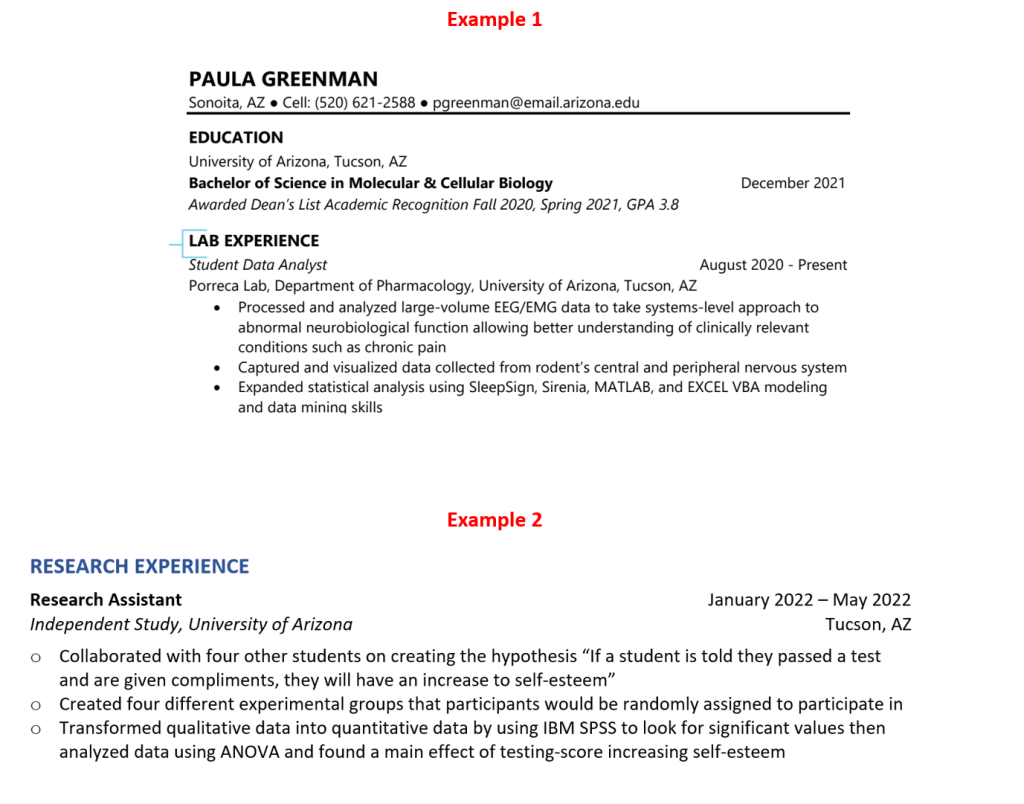

Adding Your Research Skills
Remember, you can also add your research skills to your skills section, if you have one! This is a good place to directly state the skills you used in your research experience. It’s important to state your technical skills, such as programming, equipment, etc. and transferrable skills such as communication, data analysis, etc.
Example Skills Sections
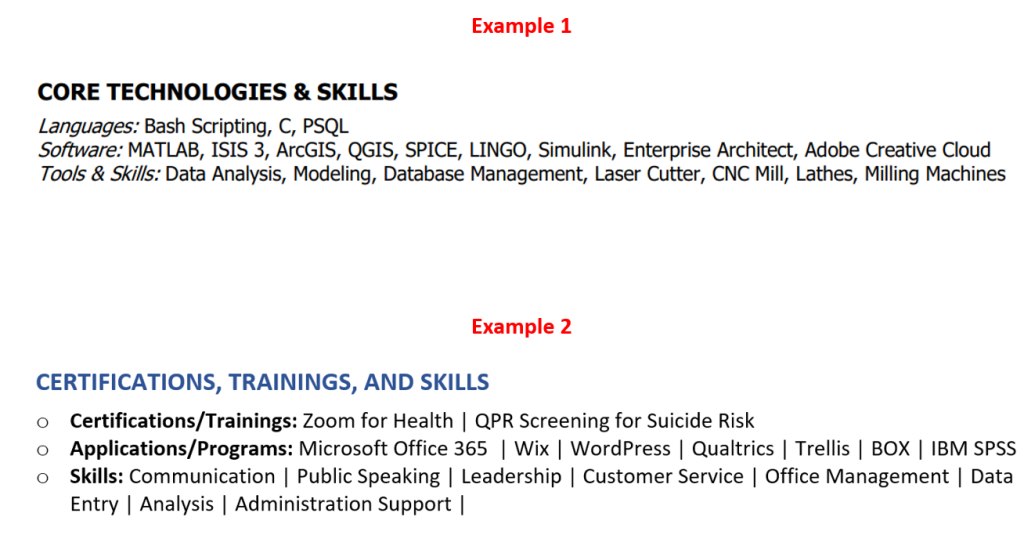
Resume Help
Get more resume information, templates, and more on our website or make an appointment with a Career Peer Coach , who can help you create a new resume or review your current one!
We respectfully acknowledge the University of Arizona is on the land and territories of Indigenous peoples. Today, Arizona is home to 22 federally recognized tribes, with Tucson being home to the O'odham and the Yaqui. Committed to diversity and inclusion, the University strives to build sustainable relationships with sovereign Native Nations and Indigenous communities through education offerings, partnerships, and community service.
Resume builder
The Best Research Skills for a Resume
If you want to apply for a research position, you need to provide evidence of research skills on your resume. In this article, we explore what the best research skills for a resume are, why they are important and how to list them properly. We also provide a researcher resume sample to get you started – you can use it as inspiration or a template.

Table of Contents
What Are Research Skills?
A career like research is an excellent option for anyone who can collect, analyze and interpret data, solve complex problems, dive deep into discovery, and offer innovative solutions. The best thing about being a researcher is that you can not only succeed in science and academia but also climb up the career ladder in the corporate world. Indeed, having solid research skills opens the door to many roles and industries, including academic environments, government settings, transnational corporations, startups, tech giants, and non-profit organizations, to name but a few.
From human behavior to regional studies to biotech, there are myriads of research spheres where a qualified individual can make a difference. Researchers utilize their skills to explore a variety of topics, and if you have your mind set on pursuing a career as a researcher, you need to understand what skill set is pivotal for success in this field.
In a nutshell, research skills are all about searching ways to resolve problems. They are knowledge, abilities and competencies that ensure you can investigate particular topics, perform critical analysis, extract and organize data, interpret results, form hypotheses, and derive data-driven conclusions.
As a researcher, you are expected to be capable of relaying your findings to other people in a compelling and digestible form and even inspire action, both in yourself and in others.
Whether you are a seasoned researcher or a novice in this field, you need to put the right skills on your resume . Below you will find a list of the most in-demand research skills in today’s job market.
The Top 10 Research Skills for a Resume
Communication.
Communication is a crucial aspect of a research career since you are required to share information, relay findings and spread knowledge efficiently and effectively, both orally and in writing . While communication skills certainly have a place on your resume , that doesn’t mean adding “Communication” to your list of skills is enough to move on. You need to provide relevant examples verifying that you can research things as part of a team and work towards a common goal. You could add something like this to add credibility to your claim:
Recruited 7 research assistants for clinical studies by visiting clinics and sending out email invites, increasing participation by 20%.
Explained 100+ research procedures to a group of study participants in 10 days, resulting in a 0% incident rate.
Problem Solving
Being an advanced problem solver means you can consistently identify issues and find effective and efficient solutions to them . It is an extremely valuable skill when it comes to research-based activities, and 86% of employers look for workers who are capable of solving problems in the workplace according to the National Association of Colleges and Employers’ Job Outlook 2022 survey. If you want to add problem-solving skills to your resume, you need to underpin them with relevant accomplishments. For instance, you could add examples like these:
Resolved course accessibility issues by creating interactive presentations for remote learners, increasing student satisfaction by 89%.
Developed and introduced a new computing environment for analysis, identifying 100% of failure patterns and improving issue detection by 75%.
Analytical Skills
Having analytical skills means you can parse data into digestible pieces, interpret them correctly and make data-based connections and conclusions . Data analysis incorporates a vast set of competencies, including technical skills like proficiency in programming languages, such as Python and R, familiarity with data visualization tools, like Tableau and Power BI, and a strong grasp of statistical analysis methods, such as hypothesis testing, regression analysis, and sample size determination. Armed with these skills, a researcher can take data to the next level and drive both innovation and profitability.
Being able to make sense of facts and figures both manually and using automated solutions will help you thrive in most roles, so recruiters would love to know that you are an analytical thinker when considering your candidacy. Your best bet here is to make sure they can find this out by examining your resume. You can add examples like the ones below to prove you can tackle complicated issues using your analytical skill set:
Collected, cleaned and analyzed first-party data from 10+ departments to identify the socio-economic impact of the COVID-19 pandemic on the company.
Performed regression analysis to determine the effects of a company-wide minimum wage increase, concluding that the hiring process was accelerated by 25% due to the wage change in question.
Qualitative Analysis
Qualitative analysis allows you to analyze a research subject using non-numerical and non-quantifiable parameters, characteristics and indicators and is based on abstract concepts . For instance, you can use qualitative attributes like human behavior or brand reputation to make business decisions or recognize investment opportunities. This skill is in demand today as it helps researchers use their observations to make conclusions, identify patterns and tackle challenges. Since you cannot quantify this area of your expertise, you need to provide relevant context to convince the reader that you are capable of analyzing non-tangible aspects of a subject. You can do that by using appropriate examples, like the following ones:
Evaluated the quality and accuracy of 200+ data sources in a month.
Performed quality control of high-volume content in a rapidly changing environment, maintaining a quality score of 99.9%.
Quantitative Analysis
Quantitative analysis is an approach that allows you to collect, study, measure, and analyze data . From statistical research to financial modeling, quantitative analysis includes a powerful toolkit that helps a researcher refine and simplify vast amounts of raw data to make better decisions and forecast trends.
Quantitative analysis has countless applications: with it, you can track metrics, measure variables and evaluate parameters in multiple fields, from finance and accounting to molecular biology and astrophysics. Therefore, it is no wonder that it is one of the most important research skills for a resume and highlighting it the right way is likely to help you move forward in the job searching process. You can prove that you know how to work with tangible data by providing relevant examples, like the following ones:
Designed a new data analysis technique, saving 30 monthly hours in parameter comparisons.
Used SQL to analyze customer data and identify areas for improvement related to customer conversions, resulting in a conversion boost by 75%.
Academic Writing
Academic writing is the ability to create complex documents containing scientific data, such as formulas, graphs, and charts . Academic writing skills help researchers prepare reports, presentations and articles for scientific journals and magazines, and if you have them, it means you know how to present technical information clearly and concisely. Recruiters from scientific fields are especially interested in candidates capable of writing academically, so submitting a resume with examples of written work is likely to help you secure a position as a researcher. Listing your publications to prove your expertise is the best option here, but since you might not have enough space to add all your papers, books and articles, you could highlight your academic writing proficiency with something like this:
Created 350+ articles on the principles of academic research for the university’s database, increasing student satisfaction by 60%.
Published 30+ papers focused on structural changes in protein conformations.
We know that expressing your writing potential in limited words can be difficult, so here getting assistance from a summarizing tool can be a good idea.
Literature Review
Literature review is a methodology that implies conducting rigorous research on a particular topic . Having literature review skills means you can explore your subject area in greater depth using sources like books, journal articles, industry magazines, etc. Such competencies allow you to build upon existing knowledge and generate new ideas, accelerating your research and pushing it to its full potential. Naturally, your literature review skills are a valuable asset to your resume. We recommend you to illuminate them with appropriate examples, focusing on tangible outcomes:
Gathered and reviewed 10+ articles on Stata to extract variables from a dataset.
Performed 100+ literature reviews to implement changes in clinical practice, boosting quality of care by 70%.
Time Management
Time management is a powerful soft skill that is especially valuable in research environments. It allows you to manage your time effectively, break large tasks into manageable chunks and prioritize them properly, set up measurable, attainable, and time-bound goals, and even juggle your responsibilities . Proper time management helps you stay focused on your work, boosts your productivity and thereby leads to consistently high results and impressive outcomes. From carrying out experiments to writing reports to teaching, as a researcher, you need to apply time management strategies on a daily basis to successfully accomplish your tasks. You can show you are good at time management on your resume by showcasing your successes, like in the examples below:
Developed a database for organizing behavioral data for 100+ study participants, decreasing data processing time by 30%.
Implemented data analysis techniques in Python, increasing the amount of data analyzed per hour by 17% and accelerating project completion by 40%.
Attention to Detail
Paying attention to detail is a vital aspect of being a researcher. Having this skill helps you gather credible information, perceive meaningful connections, notice discrepancies, and deliver high-quality work based on correct evidence. Since each and every aspect of a career in research requires efficiency and trustworthiness, attention to detail is something you cannot go without – otherwise, your progress will come to a screeching halt. Naturally, you need to illuminate this skill on your resume as recruiters seek candidates who can look at details with a critical eye and minimize distractions. And the best way to do that is by providing a relevant example of success. You can use the ones below for reference:
Checked 10 + data sheets for completion and quality per day, resulting in a <1% error rate.
Supervised the maintenance and updates of the lab’s database with a 99% accuracy rate.
Editing & Proofreading
Editing and proofreading skills are essential to perform successful research since they ensure it is both accurate and easy to read . While editing is more about making your text more digestible and improving the overall quality of your writing, proofreading corrects surface issues like errors in spelling, punctuation and grammar. Both require you to have a solid command of the language you use and a certain degree of focus. The devil is indeed in the details, so you need to always polish your texts before submitting them. Only this way will they be perceived by your peers and superiors as constructive and professional. And to prove you are good at editing and proofreading, you need to add appropriate examples to your resume. Here is how you can demonstrate your ability to provide high-quality texts:
Edited 11 federal grant proposals designed by my team, which generated $200+ in lab funding.
Edited a research paper co-authored with 2 postdoctoral employees regarding protein generation, which received the Best Paper Award in 2020.
How to List Research Skills on a Resume
Your resume is the best place to highlight your research experience and the value you could bring to your next role. The key here is to put your research skills in the right section so that they get noticed by the reader. You have no fewer than 7 options here:
- A dedicated research section
- Your work experience section
- The education section
- The list of your research publications
- The projects section
- The skills section
- Your resume summary
If you have a solid research background, you may want to create a separate section on your resume and call it Research or Research Experience . This place will help you expand on your projects and their details, specify the nature of your research, and describe the specifics of your previous roles, providing relevant examples and demonstrating the most prominent accomplishments.
If your career is all things research, the work/professional experience section can incorporate your research skills and accomplishments. List your employers and your duties, along with the dates of your employment, like you would do when describing your non-research work experience.
Your education section is an appropriate place to highlight your research skills if you are a student or a recent graduate. You can put it at the top of your resume if you want to draw more attention to your research background when applying for your first job in science or academia.
If you have a whole host of published works, it could be a great idea to create a separate section for listing your publications . This will help you add credibility to your research skills and accomplishments. Research-related accomplishments can also be highlighted as projects on your resume. This might be appropriate if your research background is not so extensive or not quite relevant to your current career aspirations.
You can list your research skills in your skills section as long as they are tangible and relevant for the job you want to land. We recommend you to avoid general skills here and focus on industry-specific expertise, illuminating it with the keywords you can find in the corresponding job listing and relevant skill levels .
Highlighting your research skills in the summary section is appropriate if you are applying for a role where a robust research background is essential. Your resume summary is just a few lines appearing at the top of the document, so make sure to add only the most important research skills there – those that you want the reader to see first and foremost.
Why Are Research Skills Important?
Research-oriented positions and most jobs in academia require you to have a solid set of research skills. Employees outside these roles can also benefit from research experience – research skills are transferable , meaning you can bring them to the table no matter your position, career field or job level. Therefore, they are a valuable addition to a resume in many cases.
Businesses and organizations are eager to employ candidates with proven research skills because they can
- come up with original plans and ideas,
- design innovative products and services,
- improve processes,
- keep up with technology,
- identify customers’ needs and requirements and find ways to meet them,
- resolve complicated issues,
- analyze competitors’ strengths and weaknesses,
By adding research skills to your resume, you show recruiters that you can think outside the box, know how to work with data and technology, are capable of making well-informed decisions, and are good at solving problems. This makes you a valuable hire in today’s skill-based job market
A Resume Sample to Apply for a Research Position
JOHN/JANE DOE Research Assistant Location ⋅ Email ⋅ Phone number Diligent and hardworking clinical researcher seeking a position at [Name of Company] to apply academic expertise and facilitate biological research. PROFESSIONAL EXPERIENCE Company/Organization, Location Dates of Employment Research Assistant Assisted scientists in 30+ research projects related to therapeutics for COVID-19 Conducted data-driven testing with an accuracy rate of 98% Supervised a team of 3 junior research assistants with daily laboratory duties Company/Organization, Location Dates of Employment Graduate Research Assistant Participated in cell research projects as part of a cross-departmental team of 30 researchers. Performed cell counts with 99% accuracy Was engaged in developing a platform to investigate immune responses to virus-infected hepatocytes. … Company/Organization, Location Dates of Employment Research Student Assistant Gathered and analyzed data and evidence for 10+ clinical research cases monthly. Awarded “Research Impact Award” in recognition of consistent research excellence (only 1 student is awarded in a class of 100). … EDUCATION NAME OF UNIVERSITY Location Degree, Major Dates of Education SKILLS Molecular cloning RNA isolation Cell counting Knowledge of SQL code and queries Data analysis Literature review
A career in research is an extremely exciting yet quite a demanding path. Since the competition for positions in the field is very fierce, as a researcher, you need to have high levels of determination and persistence and a powerful combination of skills. The research skills we have outlined in this article are what recruiters expect to see on your resume, so make sure to expand on them to get the job of your dream, rise to the top of your game and deliver ground-breaking research.
Leave a Reply Cancel reply
Your email address will not be published. Required fields are marked *
Save my name, email, and website in this browser for the next time I comment.
University of Missouri
- Bias Hotline: Report bias incidents
Undergraduate Research
How to put research on your resumé.
Resumés are important documents for all kinds of application packages — jobs, scholarships, grad school, etc. Your resumé should fit within the total package highlighting your achievements in a concise manner that can be further expounded upon in your personal statement, cover letter, or your letters of reference. It is important to custom tailor your resumé to any particular position, or program you are applying for. Some information needs to be emphasized more than other depending on what the reviewers may be looking for.
Using Your Space Wisely
In general, a resumé should be no more than two pages long — unless you have a large number of presentations or publications that need to be listed. Avoid the tendency to add more “stuff” to your resumé to try to look impressive. Use the relevant experience you have and determine what was impressive about it (for example, demonstrated independence, innovation, grit, or tenacity; helped improve ways of doing things in the lab; were given additional responsibilities as time went on; etc.)
- A reviewer would rather read about the two positions you had that are relevant, than try to sift through seven or eight clubs or fast-food job descriptions.
- Transcript?
- Recommendation Letters?
- Personal Statement?
Typically, resumes are formatted so that your most recent position is listed first. However, don’t put working at Dairy Queen first, if you are applying for a research position. Instead, consider using some of the following sections:
- Academic Accomplishments
- Research Experience
- Work Experience/Employment
- College Activities
- Volunteer Work
- Presentations and Publications
You do not need all of these categories, especially if you do not have relevant, interesting, or recent experience with them. Do not feel forced to try to fit your resume into someone else’s template. Make a list of what you want to include then design categories that fit your experience and story. Keep in mind that these categories will change over time (for example: five years after college, you will no longer need to include a section on “college activities”).
Research Mentor
- Area of research
- Not only does it show that you worked directly with a faculty member in your position, but reviewers might be familiar with your mentor’s work which could put you at an advantage.
- Consider listing projects and accomplishments the group achieved first before breaking things out on a year to year basis.
- If you were funded by different sources at different times, put a list of these sources at the bottom of the experience in this position.
Job Titles, Time Periods
- Use something that makes sense (sometimes HR titles do not)
- Instead of “MUURS Scholar” say “Student Researcher funded by the MU Undergraduate Research Scholars Program”
- Summer 2017 (9 weeks, full time internship)
- Academic Year 2018-2019 (15 hrs/week)
- What does that award mean?
- Will anyone outside of campus know what that is?
- Was the program selective?
- What was the award amount?
- What was the duration of the award?
- You can list various funding sources at the end of the relevant section
- External funding (from a government entity such as NIH, for example) is impressive. Be sure to list it.
You need to take the time to seriously consider your experience and how that allowed you to grow and mature as a researcher. Ask yourself these questions when brainstorming about your experience:
- What are areas you excelled in?
- What are lessons you learned?
- What are things you improved upon from the person before you?
- How did you spend your time?
- What skills did you gain?
- What research outcomes were reached?
- How long were you in the lab?
Use specific numbers or other qualifiers when applicable to show just how much work, effort, independence, or tenacity you had.
If your publication and presentation experience is limited, it is recommended that you include it with your relevant experience. However, if you have extensive or otherwise impressive experience (won a presentation award at a conference, or presented your work to state legislators at the Undergraduate Research Day at the the State Capitol, for example) then include a new category specifically for Presentations and/or Publications.
Presentations
- Include full list of authors
- Include full and official title
- Include if it was poster or oral presentation (ie, 15 minute presentation)
- Include location, event
- Include date (at least month and year)
- Include any award
- Check in with your mentor, to find out if a poster you co-authored was presented elsewhere.
Publications
- Full citation when published
- In Press – journal, date?
- Submitted for review – journal/date
- In preparation
- Check with your mentor as many projects are not completed by the time as student graduates.
Final Reminders
- Know your audience
- Explain (or spell out)
- Organize to fit your own situation
- Make it easy to follow – esp. if you have ‘time away’
- But have on comprehensive and cohesive running resumé.
- Have a system in place to update/organize your resumés.
- Use professional language, as most files are submitted electronically — the reviewer will see if you named a file “Better Resumé”
- ex: Jane Doe Resumé – Biochemistry REU, UT Austin
- This will ensure that the reviewer knows who you are and what you are applying for without even opening the file.
We encourage students to visit the MU Career Center in the Student Success Center for help on their specific application needs.
You control your data
We and our partners use cookies to provide you with our services and, depending on your settings, gather analytics and marketing data. Find more information on our Cookie Policy . Tap "Settings” to set preferences. To accept all cookies, click “Accept”.
Cookie settings
Click on the types of cookies below to learn more about them and customize your experience on our Site. You may freely give, refuse or withdraw your consent. Keep in mind that disabling cookies may affect your experience on the Site. For more information, please visit our Cookies Policy and Privacy Policy .
Choose type of cookies to accept
These cookies allow us to analyze our performance to offer you a better experience of creating resumes and cover letters. Analytics related cookies used on our Site are not used by Us for the purpose of identifying who you are or to send you targeted advertising. For example, we may use cookies/tracking technologies for analytics related purposes to determine the number of visitors to our Site, identify how visitors move around the Site and, in particular, which pages they visit. This allows us to improve our Site and our services.
These cookies give you access to a customized experience of our products. Personalization cookies are also used to deliver content, including ads, relevant to your interests on our Site and third-party sites based on how you interact with our advertisements or content as well as track the content you access (including video viewing). We may also collect password information from you when you log in, as well as computer and/or connection information. During some visits, we may use software tools to measure and collect session information, including page response times, download errors, time spent on certain pages and page interaction information.
These cookies are placed by third-party companies to deliver targeted content based on relevant topics that are of interest to you. And allow you to better interact with social media platforms such as Facebook.
These cookies are essential for the Site's performance and for you to be able to use its features. For example, essential cookies include: cookies dropped to provide the service, maintain your account, provide builder access, payment pages, create IDs for your documents and store your consents.
To see a detailed list of cookies, click here .
This site uses cookies to ensure you get the best experience on our website. To learn more visit our Privacy Policy
- Resume Examples
- Research Assistant Resume Example & Skills for 2024
Research Assistant Resume Example & Skills for 2024

Our customers have been hired by:
When applying for research assistant positions, you’re up against highly motivated, ambitious, extremely talented, and well-educated scholars and scientists. But with a perfect resume for research assistant you can beat them all.
You're about to see the most effective strategies for how to put a research assistant on a resume. Scroll down one fold, and you’ll see a perfect research assistant resume sample. Better yet? Keep reading, and you'll find out what research skills a resume might need, how to include your education, and how to make it whole so that it can easily impress your future employer.
In this guide, you’ll see:
- A research assistant resume sample better than 9 out of 10 other resumes.
- How to write a resume for research assistant even if with no experience.
- Tips and examples of how to put skills and achievements on a resume for research assistant jobs.
- How to describe your experience on a research assistant resume to get any job you want.
Want to save time and have your resume ready in 5 minutes? Try our resume builder. It’s fast and easy to use. Plus, you’ll get ready-made content to add with one click. See 20+ resume templates and create your resume here .
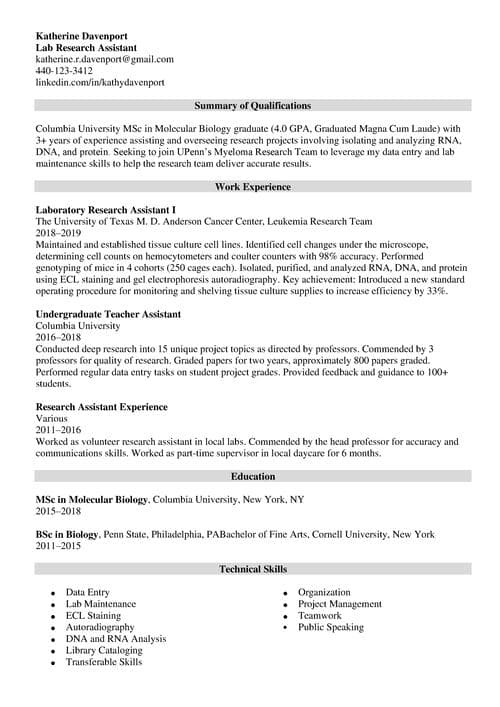
Sample resume made with our builder— See more resume samples here .
Check our other guides on writing a resume for research or science positions:
- Clinical Research Coordinator Resume
- Market Research Analyst Resume
- UX Researcher Resume
- Graduate Assistant Resume
- Biology Resume
- Environmental Science Resume
- Computer Science Internship Resume
- Lab Assistant Resume
- Lab Technician Resume
- Scientific Resume
- Sample Resumes for 500+ Jobs
Here’s a sample research assistant resume you can copy, tweak, and use.
Research Assistant Resume Sample
Katherine Davenport
Lab Research Assistant
440-123-3412
linkedin.com/in/kathydavenport
Summary of Qualifications
Columbia University MSc in Molecular Biology graduate (4.0 GPA, Graduated Magna Cum Laude) with 3+ years of experience assisting and overseeing research projects involving isolating and analyzing RNA, DNA, and protein. Seeking to join UPenn’s Myeloma Research Team to leverage my data entry and lab maintenance skills to help the research team deliver accurate results.
Work Experience
Laboratory Research Assistant I
The University of Texas M. D. Anderson Cancer Center, Leukemia Research Team
2018–2019
- Maintained and established tissue culture cell lines
- Identified cell changes under the microscope, determining cell counts on hemocytometers and coulter counters with 98% accuracy
- Performed genotyping of mice in 4 cohorts (250 cages each)
- Isolated, purified, and analyzed RNA, DNA, and protein using ECL staining and gel electrophoresis autoradiography
Key achievement: Introduced a new standard operating procedure for monitoring and shelving tissue culture supplies to increase efficiency by 33%.
Undergraduate Teacher Assistant
Columbia University
2016–2018
- Conducted deep research into 15 unique project topics as directed by professors. Commended by 3 professors for quality of research.
- Graded papers for two years, approximately 800 papers graded.
- Performed regular data entry tasks on student project grades.
- Provided feedback and guidance to 100+ students.
Research Assistant Experience
2011–2016
- Worked as volunteer research assistant in local labs
- Commended by the head professor for accuracy and communications skills.
- Worked as part-time supervisor in local daycare for 6 months.
MSc in Molecular Biology, Columbia University, New York, NY
2015–2018
Favorite fields of study: Molecular Biology and Genetics, The RNA World: A Functional and Computational Analysis, Cancer Cell Biology, Immunobiology
Extracurricular activities and achievements:
- President of the graduate student board 2015–2016
- Started and oversaw a volunteer research project investigating human evolutionary genomics
- Delivered an on-campus presentation on the impact of sex, conflict, and pathogens on modern genomes during the Annual Molecular Biology Conference
BSc in Biology, Penn State, Philadelphia, PABachelor of Fine Arts, Cornell University, Cum Laude
New York City, NY
2011–2015
Peer-reviewed Publications
"Bibliometric Analysis of Biochemistry, Genetics and Molecular Biology Research Output." Journal of Advancements in Library Sciences 2, no. 2 (2018): 18-24.
"Methods in Plant Molecular Biology and Biotechnology." Chronicle.com
Technical Skills
- Lab Maintenance
- ECL Staining
- Autoradiography
- DNA and RNA Analysis
- Library Cataloging
Transferable Skills
- Organization
- Project Management
- Public Speaking
That's a great example of a resume for a reseach assitant. But we're not here to look at samples, are we?Here's how to write your very own rearch assistant resume:
1. Use Best Research Assistant Resume Template
Think about this—
Research team supervisors and head professors have to review hundreds of research assistant applications. How much time do you think it would take them to read every single research assistant CV or resume, cover letter, proposal, or transcript of records?
Too much time.
That’s why decision makers don’t read every application document they get. They just skim them for most relevant information.
So—What should you do?
Make it easy for research recruiters to find what they’re looking for in a jiff.The best way to achieve that? Format your research assistant resume the right way and choose a clear, legible research assistant resume template.
Key thing is to divide your resume into sections and put them in the right order.
Writing an undergraduate research assistant resume or a research assistant resume with little experience? Here’s the proper template:
Sample Entry-Level Research Assistant Resume Template
- Contact Information
- Resume Objective
- Awards and Honors
- Work Experience/Volunteer Experience
For a postgraduate or graduate research assistant resume with relevant research experience to showcase, move your research experience above the education section:
Sample Senior (Graduate or Postgraduate) Research Assistant Resume Template
- Resume Summary
- Research Experience
- Additional Sections (Publications, Conferences Attended, Certifications)
In each section, list your experience in reverse chronological order , starting with your current or most recent activities.
Make the section headings in bold and slightly larger than the rest of the text. Be consistent with your headings format and with the layout of each section.
Use clear, legible fonts. Make your research assistant CV or resume look scholarly . Don’t cram it with gimmicky graphics. White space is your friend—decision makers need some breathing room!
For more information on how to choose a good template and layout for your research assistant resume, read: Resume Layout Templates and Examples
Now, let’s break down how to write each section of an excellent research assistant resume and see some examples.
2. Write Research Assistant Resume Summary or Objective
Regardless of which one you choose, this section comes at the very top of your resume, just below your contact information.
A research assistant resume objective or summary is a short and snappy paragraph that explains why you’re an ideal candidate for this job. It serves as a “trailer” for the rest of your research assistant CV.
Get it right, and every research recruiter will actually read your whole resume with interest.
Should you write a research assistant resume objective or a summary?
That depends on your research experience.
- If you’re writing an undergraduate, student, or entry-level resume for research assistant jobs, go for the resume objective. Mention your strong academic record, the skills you’ve learned so far and how you can leverage them to help the research team you’d like to join.
- Got relevant research experience under your belt? Write a research assistant resume summary. Give an outline of your research career and show off your best achievements.
Either one you pick, remember about one thing—
Focus your research objective or summary on what you can offer your prospective employer, not what you want to get out of the job.
Alright, enough theory. Time for some examples.
Research Assistant Resume Objective Sample
See that? “I’ve learned a lot already, and I want to use this knowledge to make sure all your research projects run smoothly.”
That’s an offer no research recruiter could refuse.
Now, have a look at a not-so-great resume objective example to know what you should avoid.
Clinical Research Assistant Resume Objective Sample
Why is it so bad?
First of all, it’s not specific. What exactly does “strong academic record” mean?
Secondly, it doesn’t refer to any particular research job or project. That’s a red flag for research recruiters—it means this candidate probably spams identical, generic research resumes out to all research institutions and doesn’t really care what job he gets. Every research team wants to recruit research assistants that are passionate about a given research position.
Finally, it makes no offer. The bottom line is “I want a research job so that I can learn more.” That’s what everyone else wants and it’s not enough.
Now, let’s review two very different research assistant resume summaries.
Research Assistant Resume Summary Example
See the difference? The first example is full of details and lists hard numbers.
The second one barely mentions skills that any good research assistant must have. There’s nothing exceptional in “reviewing literature” or “safeguarding data,” is there?
It’s pretty obvious which of these two candidates will land the interview.
When making a resume in our builder, drag & drop bullet points, skills, and auto-fill the boring stuff. Spell check? Check . Start building a professional resume template here for free .

When you’re done, our easy resume builder will score your resume and our resume checker will tell you exactly how to make it better.
Writing the perfect research assistant resume objective or summary can be tricky. For more expert tips and real-life examples, check out our handy guides: How to Write a Resume Summary Statement and How to Write a Resume Career Objective .
3. Put Education on Your Research Assistant Resume
If you’ve got little or no research experience, the education section of your research assistant resume has to shine.
What do you put in an undergrad research assistant resume education section?
- Your minors (if applicable)
- Your graduation date, or expected graduation if you’re still studying
- The name of your institution
All of the above are absolute must-haves. But you should also include the following to truly make your student research assistant resume stand out:
- Favorite fields of study
- Key academic achievements
- Extracurricular activities
These will show that you’re passionate about the area of science you’re studying.
See what an excellent research assistant resume education section looks like in practice:
Sample Lab Research Assistant Resume—Education Section
“She’s exactly the kind of dedicated research assistant we’re looking for!”
This academic experience section is guaranteed to bring this kind of response from the research team recruiters.
If you’re writing a senior research assistant resume and have oodles of relevant research experience, limit yourself only to the most important academic achievements and don’t include favorite fields of study in your resume education section.
Also, put your education section below your research experience.
Read on to see how to describe your past research assistant duties and responsibilities.
If you want to learn more about listing your education on a research assistant curriculum vitae or resume, check out this piece: How to Put Education on a Resume
4. Write An Excellent Research Assistant Job Description
Got professional research experience?
If so, you need to know exactly how to write about research you’ve done on your resume.
This section will be critical. For senior research assistant positions, recruiters will want to know how well you handled your past research assistant duties more than anything else.
In your research experience section, don’t talk only about your duties and responsibilities. Highlight your achievements and accomplishments instead.
Take a look:
How to Put Research Experience on a Resume
- Start with your current or most recent research job.
- Follow it with your previous position and the one before that, and so on. In each entry, include your position name, the research institution, and the dates worked.
- Add up to 5 bullet points describing your duties and, more importantly, your achievements.
- Quantify whenever possible. Don’t say you “significantly reduced freezer maintenance time.” Say how much exactly. Numbers pop!
- Use action verbs throughout your work experience section. “Coordinated,” “created,” “reviewed,” not “responsible for coordinating, creating, and reviewing.”
- At the bottom, add a “Key achievement” subsection where you show off your most impressive success.
- Last but not least—pick phrases from the job ad, and refer to them in your work experience section. List relevant duties, not every single task you’ve performed. It’s called tailoring or targeting a resume.
Again, let’s see some examples!
Research Assistant Job Description on a Resume
The contrast is clear—
The right research assistant CV sample showcases quantifiable achievements and specific duties. Plus, it’s packed full of action words.
The wrong one? That reads like a re-written description of responsibilities listed in the job ad.
If you want to learn more useful tricks on how to put research duties and responsibilities on an excellent research assistant resume, see this handy guide: How to List Work Experience on Your Resume
5. Don’t Give Up If You Don't Have an Experience to Put on Your Resume for a Research Assistant
That’s okay.
In your student research assistant resume work experience section, list all your past professional experiences.
Think you don’t have any ? Think again. Even the smallest activities count.
Such as? Have a look.
Resume for Research Assistant Position with No Experience
- Internships
- Part-time jobs
- Participation in work experience programs
- Volunteering
- Extracurricular student activities
Even if some of the gigs you’ve done in the past aren’t related to your area of research interest, you should still put them in the work experience section.
This way, you’ll show that you’re dependable, well-organized, and responsible.
For more actionable student research assistant resume samples and ideas on how to make the most of your research assistant resume when you’ve got little or no experience, check out our guide: First Resume with No Work Experience Samples
6. List Your Skills on a Research Assistant Resume
When it comes to listing your skills, relevance is key.
What does it mean for you?
That you shouldn’t cram your resume with all research assistant skills you think you have, entered in whatever order you think is right.
Check the research job description and look for skills-related keywords.
Have these skills? I bet you do! So put them on your resume.
Let’s say, the professor put these skills in the job offer:
- Physical strength
But how to put research skilsl on a resume?
In your skills list, prove you’ve got them, like this:
Research: conducted deep research into 15 unique project topics as directed by professors. Commended by 3 professors for quality of research.
Data entry: Performed regular data entry tasks on first-year student project grades for 400+ students.
Physical strength: Able to lift up to 70 pounds.
Want to add some additional researcher skills? Let me give you some inspiration.
This study suggests that 10 qualities essential for a prospective researcher to succeed are:
Best Research Skills for a Resume
- Interest
- Motivation
- Inquisitiveness
- Commitment
- Sacrifice
- Excelling
- Knowledge
- Recognition
- Scholarly approach
- Integration
Want to dazzle every research committee? Make your skills list reflect those values.
Hungry for more examples of the best skills sets to put on your research assistant CV? Read: Examples of What Skills to Put on a Resume
7. Add Awards, Honors, and Additional Sections for an Effective Research Assistant Resume
Got all of the above research assistant resume sections?
Great. Almost there.
Want to outshine other candidates?
Add an additional section to your research assistant resume. Show recruiting professors that your skills and experiences have been awarded and appreciated by others.
Struggling for ideas on what’s worth putting on a research assistant CV?
Here’s a handy list of entries applicable for undergraduate, entry-level research assistant resumes:
Additional Sections to Include on a Junior Student Research Assistant Resume
- Scholarships
- Honor Rolls inclusions
- Dean’s Lists
- Subject-related awards
- Science fair awards
- Publications in student journals
- Perfect attendance awards
- Non-academic professional awards
- Volunteer-related awards
If you’ve already worked as a researcher for some years, your resume can also benefit from an additional section listing your best accomplishments.
Have a look at some ideas:
Additional Sections to Include on a Senior Graduate Research Assistant Resume
- Publications
- Fellowships
- Certifications
- Industry awards
- Conference talks and conference participation
- Professional blog
Need more examples on achievements that can enhance your research resume? Read: Achievements and Accomplishments to Put on a Resume
8. Write a Cover Letter to Add to Your Resume for a Research Assistant
Optional cover letters aren’t optional.
See, 45 out of 100 recruiters won’t even be bothered to open your research assistant resume if there’s no cover letter attached.
Besides, cover letters can do what even best resumes can’t. They tell a story . And even researchers and scientists love stories a lot more than data sheets.
Think about applying for your first research assistant position. Daunting, isn’t it?
It’s your research assistant cover letter that can get you there!
In your cover letter, you can explain your passion for the science area you pursue, talk more about your skills and support them with solid evidence.
But it’s not only junior research assistants who should write a cover letter.
Everyone should—Writing a cover letter basically doubles your chances of landing that interview.
There’s no arguing with stats, is there?
Plus, a great cover letter that matches your resume will give you an advantage over other candidates. You can write it in our cover letter builder here. Here's what it may look like:

See more cover letter templates and start writing.
You can learn how to write a cover letter that gets every research professor excited to interview you from our beast of a guide: Write a Cover Letter in 8 Quick Steps
Key Takeaway
Now you know well how to put research assistant on resume. But t o have a truly excellent research assistant resume follow the key steps we covered:
- Open your research assistant resume with a resume objective or a resume summary. Say what makes you a great candidate and make an offer.
- Highlight your strong academic record, extracurricular activities, and favorite fields of study if you’ve got no professional research experience.
- In the research experience section, focus on your achievements, not just responsibilities. Use action verbs and quantify whenever possible.
- Match your skills list with the skills required in the job offer.
- Include additional sections such as honors and awards that prove your value as a candidate.
- Personalize every resume you send. Use the name of the research institution you’re applying to and tailor the contents of your resume to the requirements in the job description.
All check? Well then—Good luck at your big interview!
Got any questions? Need further help? Want to chat about writing your research resume? That’s great cause I can’t wait to hear from you! Drop me a line in the comments. Let’s chat!
About Zety’s Editorial Process
This article has been reviewed by our editorial team to make sure it follows Zety's editorial guidelines . We’re committed to sharing our expertise and giving you trustworthy career advice tailored to your needs. High-quality content is what brings over 40 million readers to our site every year. But we don't stop there. Our team conducts original research to understand the job market better, and we pride ourselves on being quoted by top universities and prime media outlets from around the world.
- https://doi.org/10.3109/08941939.2012.701543

Don't miss out on exclusive stories that will supercharge your career!
Get a weekly dose of inspiration delivered to your inbox

Similar articles

Letter of Interest Sample + How to Write It in 2024
Your dream workplace never advertises job openings? Send them a letter of interest that will help them notice you and make you a VIP candidate for the next open position.

Best Job Search Sites in 2024: Overview of Job Websites
Job sites spring up like mushrooms. But which ones are actually worth your time? We've tried them all to create this handy list of the best job search engines to help you.

Research Associate Cover Letter: Example & Guide
You’re an insightful and brilliant researcher of your object of study, but feel out of your depth with writing a research associate cover letter? We’re here to help.
- Resume Examples
Undergraduate Research Resume—Sample and 25+ Expert Tips
You contribute to not only publication but also academic and scientific progress. Use your undergraduate research resume to prove you’ve got what it takes.

You’re pretty good at gathering and organizing information, but it all gets a little meta when that information concerns your research abilities.
And yet that’s precisely what you need to do to write the kind of undergraduate research resume that gets results.
The good news?
Your skills are exactly , and pretty much, all you need.
In this guide:
- An undergraduate research resume sample better than most.
- How to create the perfect undergraduate research job description for resumes.
- How to write a resume for undergraduate research jobs that stands out.
- Expert tips and examples to boost your chances of landing an undergraduate research job.
Save hours of work and get a job-winning resume like this. Try our resume builder with 20+ resume templates and create your resume now.
Create your resume now

What users say about ResumeLab:
I had an interview yesterday and the first thing they said on the phone was: “Wow! I love your resume.” Patrick I love the variety of templates. Good job guys, keep up the good work! Dylan My previous resume was really weak and I used to spend hours adjusting it in Word. Now, I can introduce any changes within minutes. Absolutely wonderful! George
If you’re looking for an undergraduate research resume, you’ll probably need other kinds of resumes real soon. These are just some of our guides:
- Academic CV Template Examples
- Clinical Research Coordinator Resume
- Education Resume Examples
- Graduate School Application Resume Example
- Librarian Resume Examples
- Recent College Graduate Resume Examples
- Recruiter Resume Examples
- Research Assistant Resume Examples
- Scholarship Resume Examples
- Student Resume Examples
- Teaching Assistant Resume Examples
- Tutor Resume Examples
- Undergraduate College Student Resume Examples
Undergraduate Research Resume
Katherine Davenport
Undergraduate Research Assistant
Personal Info
Phone: 222-222-2222
E-mail: [email protected]
linkedin.com/in/katherinebdavenport
Industrious undergraduate research assistant with 2+ years of experience, skilled in biology research. Seeking the opportunity to provide excellent research assistance at the Anderson Cancer Center. At the Columbia University Biology Department, wrote and modified 11+ programs in LabView and organized and cross-referenced over 450 Mb of spreadsheets.
Experience
Columbia University Biology Department
2019–present
- Wrote and modified 11+ programs in LabView to record data from experiments.
- Collected 250+ pages of tissue-culture observations from lab-based team.
- Presented new research in front of a committee of 3–8 professors over 20+ weekly meetings.
- Organized and cross-referenced over 450 Mb of spreadsheets.
Education
BS in Molecular Biology
Columbia University, New York City, NY
Expected graduation: 2022
- Pursued passion for cellular and molecular immunology coursework.
- Volunteered in the Biology Museum three days a week for two years.
- On track to graduate magna cum laude .
- Maintaining a 3.93 GPA.
Awards and Honors
- Won first place in the biological sciences three-minute thesis competition, 2021.
- Received Dean’s Award for cell signaling poster presentation, 2020.
- English—Native speaker
- Spanish—Communicative
Key Skills
- Isolating DNA protein
- Tissue cultures
- Navigating the research library
- Planning research projects
- Research databases
Now here’s how to write an undergraduate research resume they’ll love:
1. Choose the Right Undergraduate Research Resume Format
A couple of research recruiters are filtering out time wasters. It doesn’t take long to whittle away a quarter of the applicants.
Where’s your undergraduate research resume? Gone; It was one of the firsts and only took a second. Why?
“If a candidate can’t present their own resume properly….”
It’s an easy cut to make and an easy one to avoid—make your resume format clear and organized. Here’s how:
Undergraduate Research Resume Format
- Use the reverse-chronological resume format to show your most advanced stuff first.
- Choose a fairly standard resume font like Arial in 11–12 pt.
- Leave your resume margins at one inch and plenty of white space throughout.
- Submit a one-page resume . Undergraduate research assistants don’t need more.
- Include at least these resume sections : Header, Summary, Experience, Education, and Skills.
Something else to look out for:
Unusually popular undergraduate research jobs might attract so many applicants that decision-makers might resort to using an Applicant Tracking System (ATS) .
And, some ATSs can’t handle resumes in PDF . Therefore, always check the job announcement for a preferred file format before defaulting to PDF.
2. Start With a Compelling Undergraduate Research Resume Profile
Reports have abstracts—
And resumes have resume profiles .
Have you worked as an undergraduate research assistant for a year? Then your profile will take the form of a resume summary . Use:
- One adjective (efficient, reliable, industrious)
- Job title (Undergraduate Research Assistant)
- Years of experience (1+, 2+)
- How you’ll help (provide excellent research support)
- Two or three of your most relevant achievements (collected 250+ pages of tissue-culture observations, presented research in front of a committee of 3–8 professors over 20+ meetings)
These undergraduate research resume examples show how:
Undergraduate Research Resume —Resume Summary Example
See the difference?
The first undergraduate research resume example impresses in two ways. First, it’s all about “what can I do to help?” rather than “here’s what I’ll need.” And second, it quantifies duties and tasks, turning them into real resume achievements .
What if you have little or no undergraduate research job experience?
Write a resume objective and pull relevant achievements from any of your past jobs.
No experience at all?
Draw on your academic and extracurricular achievements instead.
Undergraduate Research Assistant Resume—Resume Objective Example
The conclusion is this: little or no experience doesn’t mean anything to offer.
Are you struggling with writing an impressive resume profile? Write it last.
You’ll already have a recap of everything you achieved throughout your career, so it’ll be easy to create an overview in a summary or objective.
3. Create the Perfect Undergraduate Research Job Description and Skills Sections
Show them you’re ready by making your resume work experience section into a trophy case of accomplishments.
How to put undergraduate research on a resume to achieve just that:
- Re-read the job ad or announcement.
- Identify all the skills and duties mentioned there.
- Think of times you’ve used those skills to impress employers and professors.
- Write resume bullet points using quantifiers and action verbs describing those times.
Undergraduate Research Job Description for a Resume
- Wrote and modified programs.
- Collected tissue-culture observations.
- Presented new research.
- Organized and cross-referenced spreadsheets.
Big difference.
It’s OK to estimate some or all of those numbers. Just be sure to keep it realistic and ready to justify.
Short on undergraduate research experience? Look to other jobs for relevant achievements. You may find them in your academic achievements.
No work experience at all? That’s to be expected. Let your education section replace it. Move it up right under the objective. As for the experience, focus on your volunteering or internship efforts instead.
One more thing — no matter how experienced or inexperienced you are, you’ll need skills to put on a resume . But this isn’t like gaming an algorithm, and random spamming skills won’t work. Instead, aim to cover all the skills mentioned in the job announcement or job ad and stop there.
Here are some examples of hard and soft skills:
Undergraduate Research Resume Skills
- Education skills
- Preparing RNA and DNA solutions
- Biology research
- Maintenance skills
- Communication skills
- Problem-solving skills
- Analytical thinking
- Attention to detail
- Time management
- Organization
- Prioritization
- Collaboration
The ResumeLab builder is more than looks. Get specific content to boost your chances of getting the job. Add job descriptions, bullet points, and skills. Easy. Improve your resume in our resume builder now .
CREATE YOUR RESUME NOW
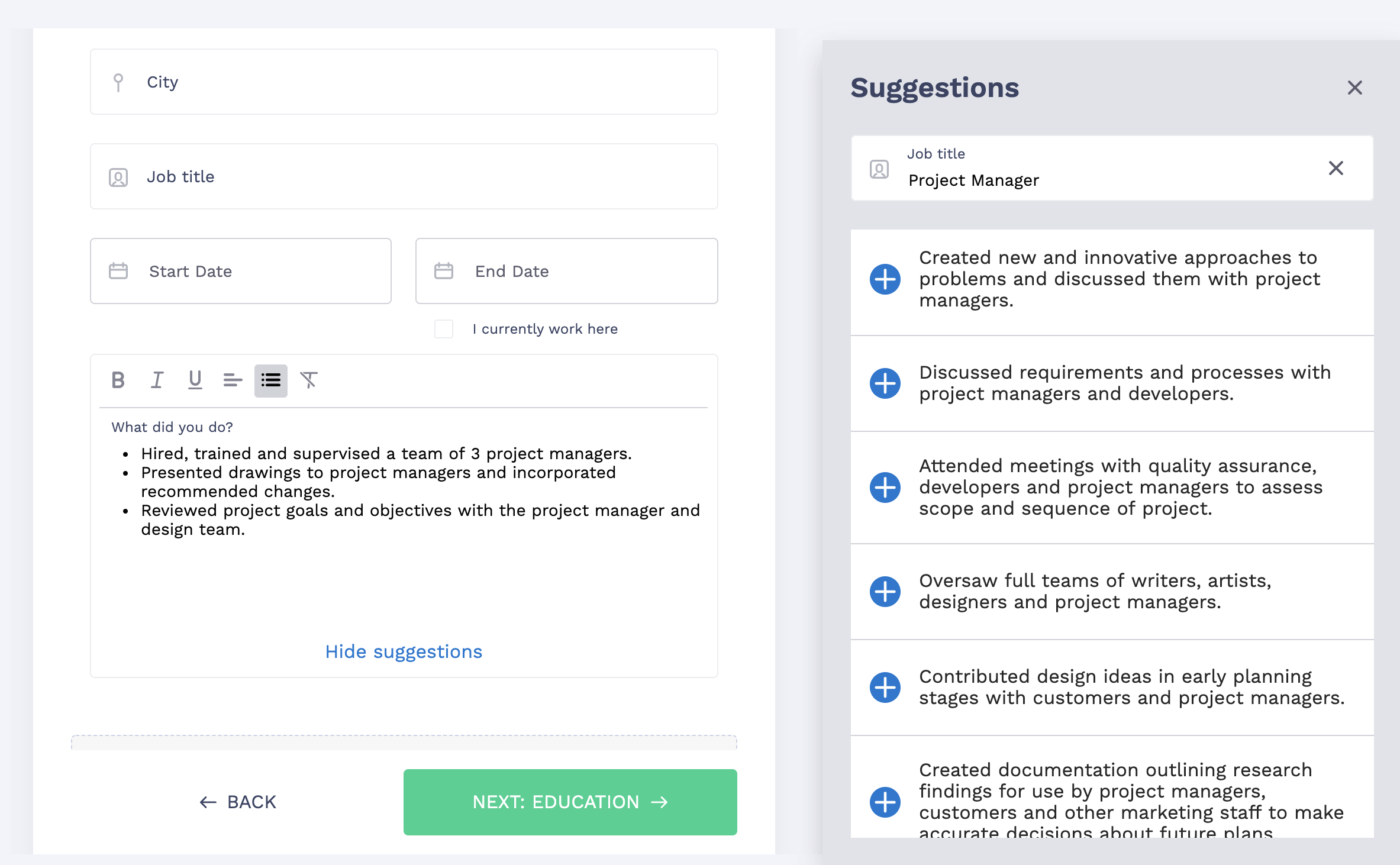
Nail it all with a splash of color, choose a clean font, and highlight your skills in just a few clicks. You're the perfect candidate, and we'll prove it. Use our resume builder now .
4. Turn an Incomplete Education Into a Reason to Hire You
When decision-makers look through an undergraduate research resume, they’re clearly looking for a solid academic record, but that means a lot more than a solid GPA.
List your degree(s), school(s), and (expected) graduation date(s).
Add bullet points that show research skills and general academic engagement, think projects, classes, and accomplishments.
This undergraduate research resume example shows how:
Undergraduate Research Resume Example—Education Section
- On track to graduate magna cum laude .
5. Boost Your Undergraduate Research Resume With Added Sections
A standard resume has the experience, education, and skills sections, which you have already completed. But if you think what’s left doesn’t look too impressive, you may be right. After all, an undergraduate research resume isn’t expected to present grandeur experience accomplishments.
So add one or two additional sections to highlight the value you bring:
- Additional Activities
- Foreign Languages
- Classes Taken
Hobbies and Interests
- Volunteering Work
- Certifications Section
- Professional References
These two undergraduate research resume examples show good vs. bad:
Undergraduate Research Resume—Extra Sections
- De-hooding hoodies and selling them online
- Smartphone photography
- English, Spanish
D+, meet A-.
Hobbies and interests can make a great addition to your undergraduate research resume, but as with any other item on your resume, they have to be relevant. Plus, you want to show your proficiency levels next to your language skills.
One last step, and it’s a bit of a doozy—
Even if you’ve never been asked to write a cover letter , you’ll still need one to be considered.
Double your impact with a matching resume and cover letter combo. Use our cover letter generator and make your application documents pop out.
CREATE YOUR COVER LETTER NOW
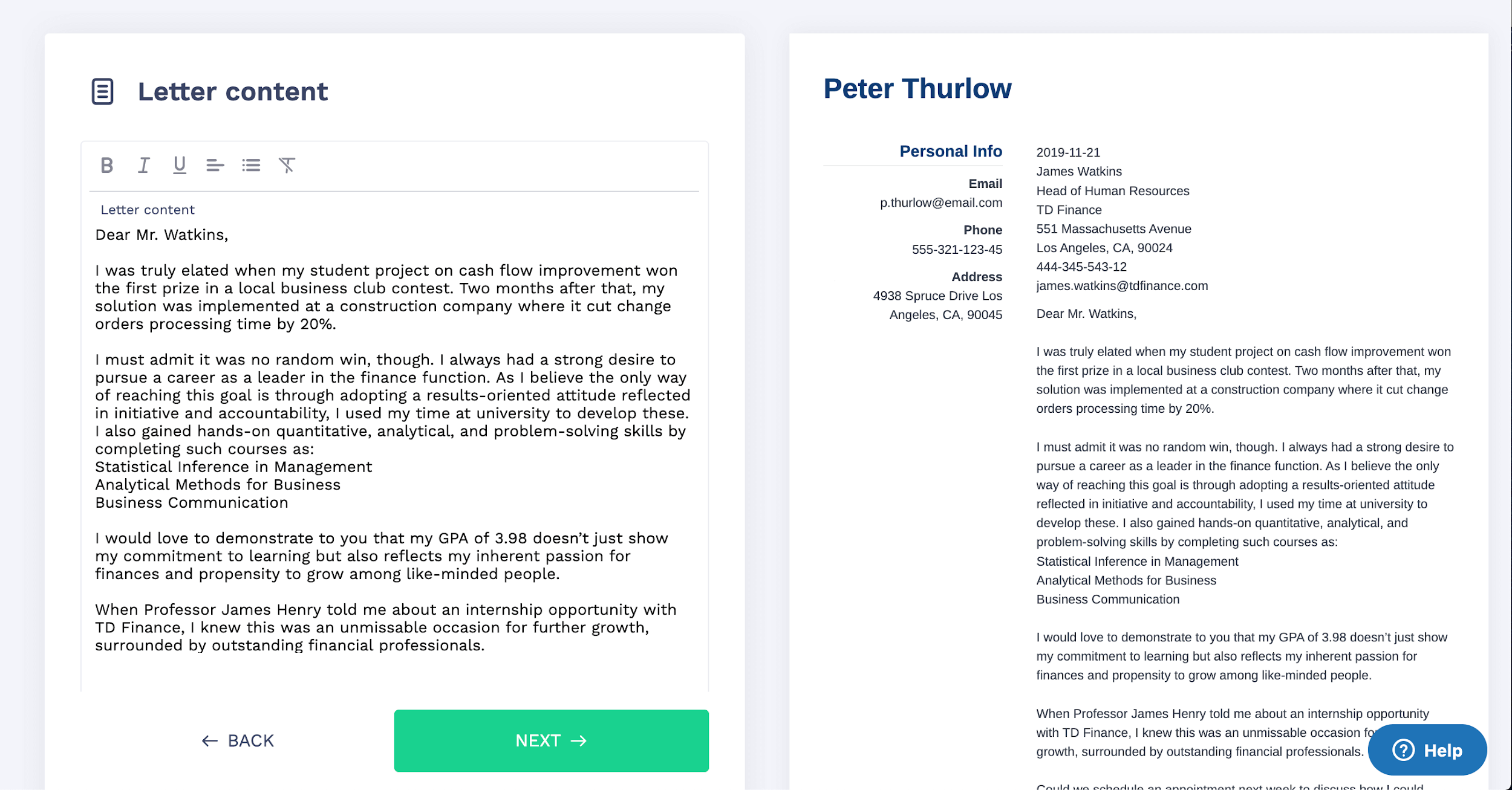
Want to try a different look? There's 21 more. A single click will give your document a total makeover. Pick a cover letter template here .
For an undergraduate research resume that gets interviews:
- Use the undergraduate research resume template . It checks all the right boxes while being quick and easy to read.
- Put undergraduate research achievements in your resume profile, work experience, and education sections to show you’ve got what it takes to get accurate results.
- Choose the right undergraduate research skills to add. Check the job ad or notice to see what the right skills are.
- Write an undergraduate research cover letter. Use it to spotlight your passion for research work as you describe your strong academic record and achievements.
Got questions on how to put undergraduate research on a resume? Got advice for others writing a resume for undergraduate research jobs? Leave a comment down below.
About ResumeLab’s Editorial Process
At ResumeLab, quality is at the crux of our values, supporting our commitment to delivering top-notch career resources. The editorial team of career experts carefully reviews every article in accordance with editorial guidelines , ensuring the high quality and reliability of our content. We actively conduct original research, shedding light on the job market's intricacies and earning recognition from numerous influential news outlets . Our dedication to delivering expert career advice attracts millions of readers to our blog each year.

Dominika is a job expert with a focus on career development and onboarding processes. At ResumeLab, she co-manages our team of career experts.
Was it interesting? Here are similar articles

College Student Resume Examples & Templates to Use in 2024
Writing a resume for a college student doesn't have to be hard, even if you don't have any experience. Follow our guide and learn how to write a job-winning college student resume.

Tom Gerencer, CPRW
Career Writer at ResumeLab

Science Resume Templates (+CV Examples for Scientist)
You’ve spent years deepening your knowledge in a narrowing field. Getting all that expertise onto a page or two of a science resume is easier than you think. Find out how.

Bart Turczynski
Career Expert

Science Research Resume Sample & Tips (+Template)
You won’t need those formidable research skills to get a science research resume together—we’ve got everything you need in one place.

Build my resume
- Build a better resume in minutes
- Resume examples
- 2,000+ examples that work in 2024
- Resume templates
- Free templates for all levels
- Cover letters
- Cover letter generator
- It's like magic, we promise
- Cover letter examples
- Free downloads in Word & Docs
7 Real Research Assistant Resume Examples That Worked in 2024
Research Assistant

Best for senior and mid-level candidates
There’s plenty of room in our elegant resume template to add your professional experience while impressing recruiters with a sleek design.
Resume Builder
Like this template? Customize this resume and make it your own with the help of our Al-powered suggestions, accent colors, and modern fonts.
- Research Assistant Resumes
- Postsecondary Research Assistant Resumes
As a successful research assistant, you’re a thorough data analyst, a top-notch lab technician, a friendly participant coordinator, and an organized librarian, all rolled into one.
However, demonstrating these skills on your research assistant resume can feel more overwhelming than autoclaving an entire lab’s worth of equipment. Not to mention, you may not know whether your school wants a CV or a resume . And what about writing a cover letter ? Where to start?
Don’t fret—we’ll walk you through what makes a good research assistant resume and how to stand out among your peers.
Our seven research assistant resume samples have helped researchers across disciplines land jobs in top labs and departments in 2024. If you’re stuck, pick a resume template complete with sample points to brainstorm your best resume yet!
Research Assistant Resume
or download as PDF
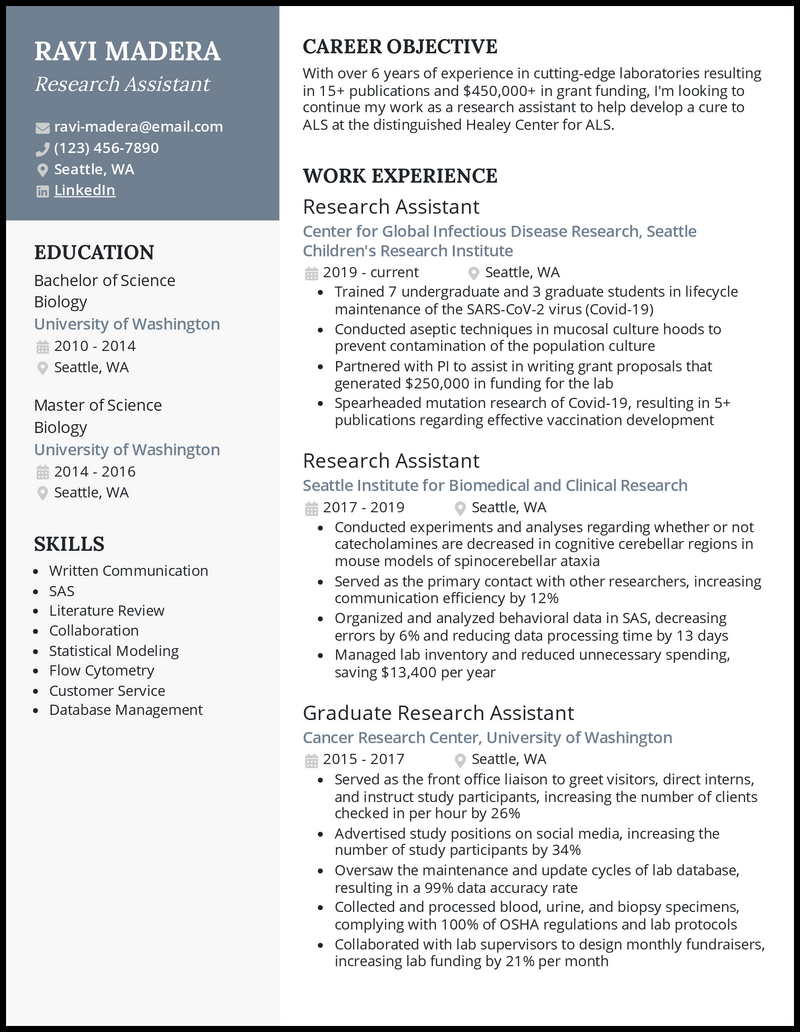
Why this resume works
- Ensure your resume includes keywords from the job description, especially in your resume skills section .
- Also, be crystal clear about your past research experience. Remember, the person reviewing your resume might not work in the same field, so you need to be abundantly clear about what research you conducted and how you executed your research.
- If any of the research you contributed led to a publication, be sure to mention it. While this isn’t the ultimate goal of research, it’s definitely a feather in your cap.
Entry-level Research Assistant Resume

- This section lets you discuss an interest in a particular field (and in a particular research assistant position). So, tailor this section for every application you submit!
- Even if the projects aren’t relevant to the field of research you’d like to study, adding them highlights transferable skills like data analysis and experiment design. Plus, it fills up space so you’re not worried about filling up a whole page.
Laboratory Research Assistant Resume
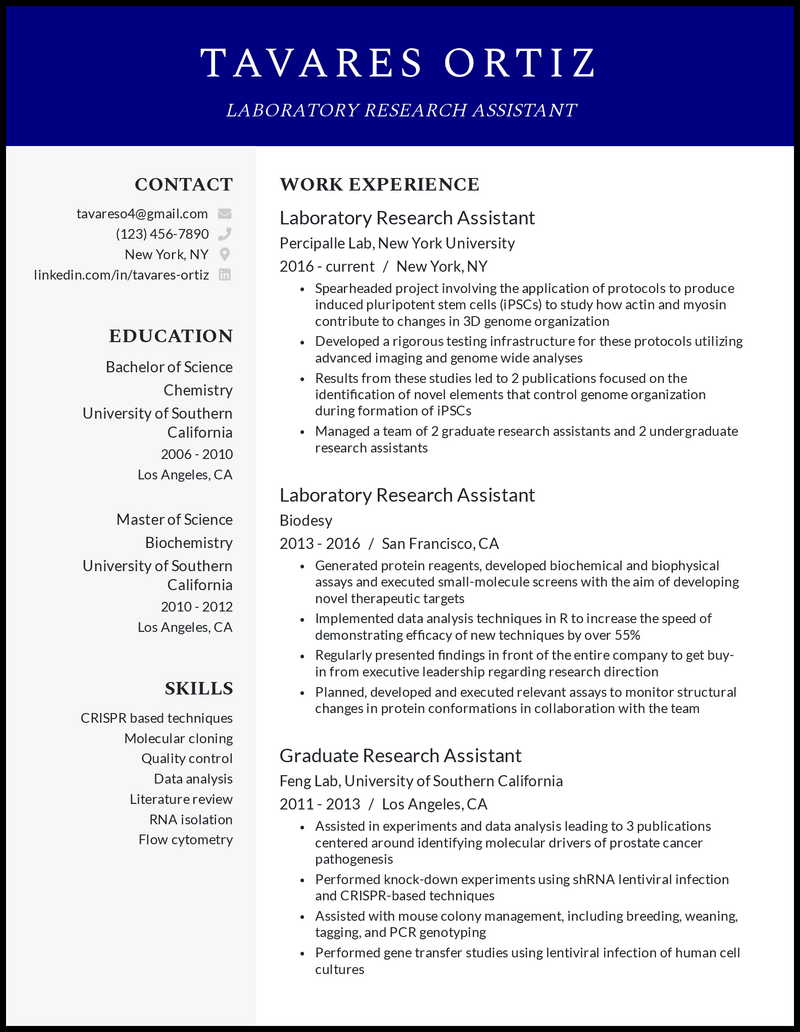
- Use numbers to discuss publications, team members you managed, money you saved, grant funding you helped acquire, or the outcome of your data analysis. If numbers can measure it, include it!
- However, unlike your data, these numbers don’t have to be perfectly accurate—they can be rough estimates.
- Before you hit submit, run your resume through a resume checker or a spellcheck system (Grammarly is a good place to start). Better yet, after you run it through AI, have a trusted colleague review it, too.
Clinical Research Assistant Resume
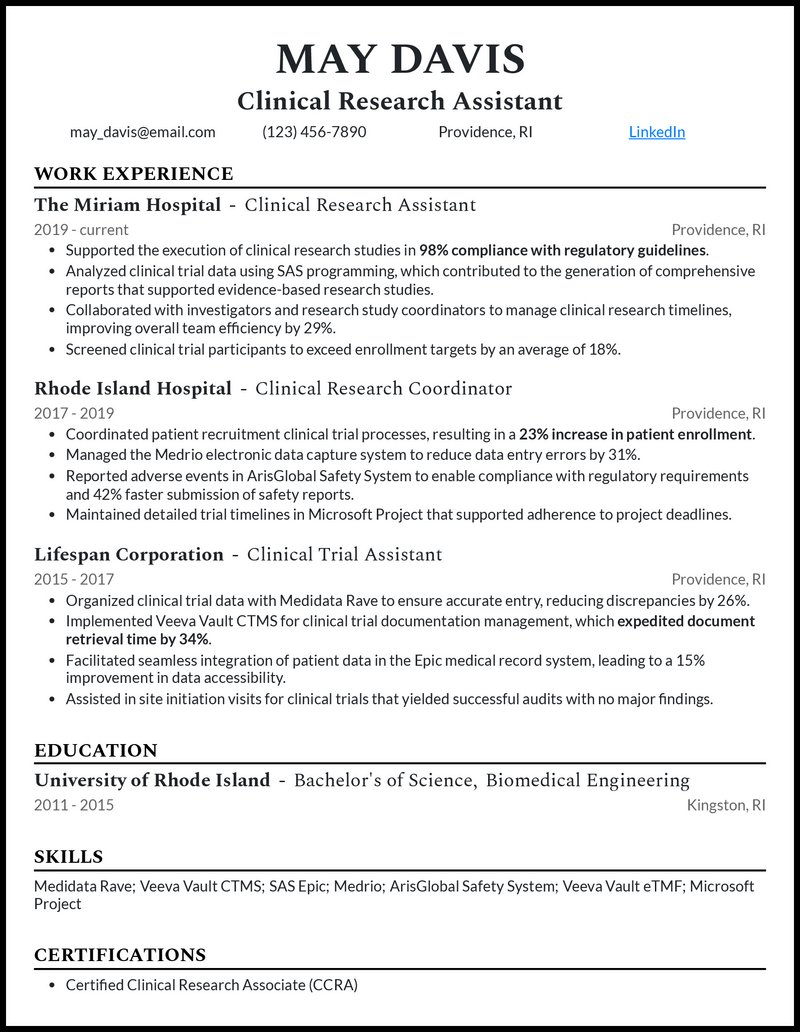
- Highlight your track record of adhering to guidelines in past trials to help your clinical research assistant resume stand out.
Undergraduate Research Assistant Resume

- However, even if you don’t have experience as a research assistant, include whatever work experience you have. Having any sort of job demonstrates responsibility, initiative, and the ability to work with others well.
- Choose a template that allows you to add sections (like projects) to make up for a lack of experience while also filling the page.
Graduate Research Assistant Resume
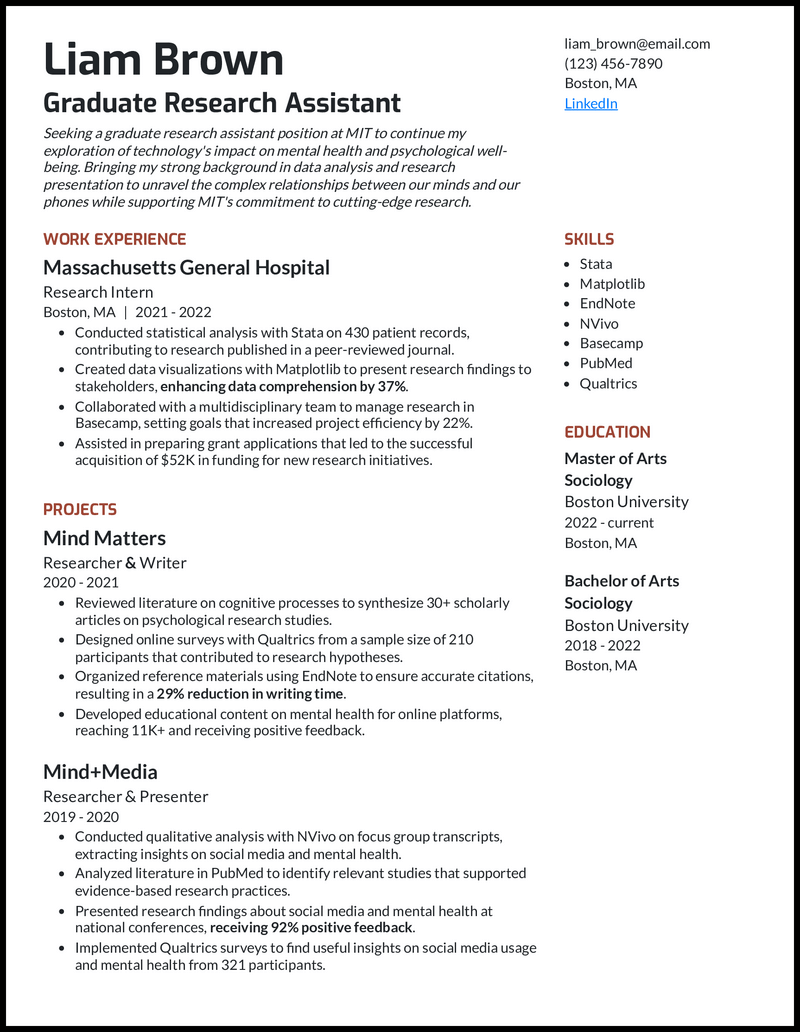
- A strong graduate research assistant resume should include a career objective that describes your topic of interest. Tell prospective programs how you’ll contribute to their legacy as a research institution through your work in the field.
Postdoctoral Research Assistant Resume
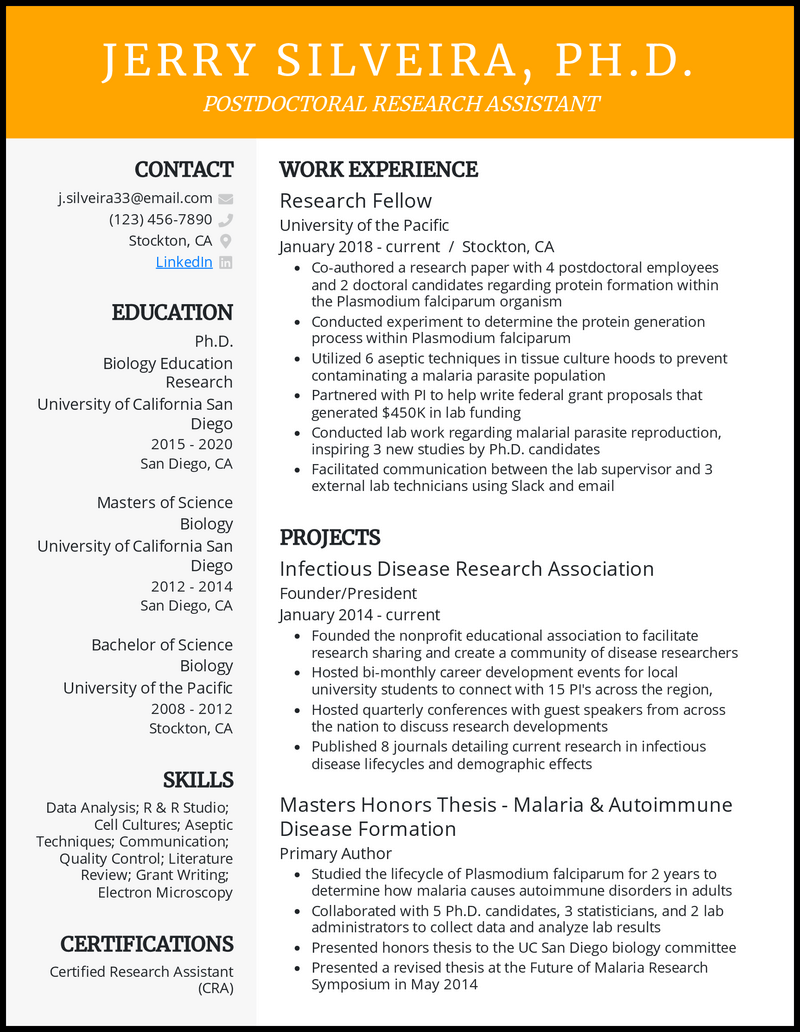
- This section highlights your expertise, years of experience in your field, and achievements. Just remember to tailor it for each application .
- Consider including projects such as club membership (especially if you founded it yourself), volunteer experiences, or independent research.
- Projects also make great examples to discuss in your research assistant cover letter .
Related resume guides
- College student
- Entry-level
- Grad school
Tailor Your Real Research Assistant Resume to Match the Needs of Your Clients

You’re the perfect person to create a stellar resume. After all, impressing an employer or a professor is all about research, and that’s something you’re already great at! However, with a vast number of research roles available, you may find yourself staring at a blank resume with no idea where to start.
We know—begin with the job description! The responsibilities listed there will help fill your resume with useful skills and experiences. Which ones of these best apply to your background?
- Collect, organize, and analyze data using surveys, interviews, experiments, and field observations
- Prepare materials and research cases for further study
- Perform literature reviews, including organizing results, writing summaries, and searching for sources
- Maintain clear and concise records, including confidential data
- Manipulate, clean, and visualize data, providing weekly and monthly reports to senior faculty members
- Participate in research meetings and present in-progress and final results
Adding skills to your research assistant resume

Explore Jobs
- Jobs Near Me
- Remote Jobs
- Full Time Jobs
- Part Time Jobs
- Entry Level Jobs
- Work From Home Jobs
Find Specific Jobs
- $15 Per Hour Jobs
- $20 Per Hour Jobs
- Hiring Immediately Jobs
- High School Jobs
- H1b Visa Jobs
Explore Careers
- Business And Financial
- Architecture And Engineering
- Computer And Mathematical
Explore Professions
- What They Do
- Certifications
- Demographics
Best Companies
- Health Care
- Fortune 500
Explore Companies
- CEO And Executies
- Resume Builder
- Career Advice
- Explore Majors
- Questions And Answers
- Interview Questions
How To Write A Resume In 7 Steps (With Examples)
- How To Write A Resume
- Resume Skills Section
- Resume Objective Section
- Career Objective Section
- Resume Reference Section
- Resume Summary Section
- Resume Summary Example
- Resume Interests Section
- Address On Resume
- Relevant Work Experience
- Anticipated Graduation Date On Resume
- Education Section On Resume
- Contact Information On Resume
- Statement Of Qualifications
- How To List Publications On Resume
- Accomplishments On Resumes
- Awards On Resume
- Dean's List On Resume
- Study Abroad On Resume
Resumes are still the most important document in your job search . Generating a professional and interesting resume isn’t easy, but there is a standard set of guidelines that you can follow. As hiring managers usually only spend a short time looking over each resume, you want to make sure that yours has a reason for them to keep reading.
If you’re looking to write a resume, rewrite a resume you already have, or are just curious about resume format, then you’ve come to the right place. This article will go through the steps to writing an excellent resume, as well as offering examples for what sections of the resume should look like.
Key Takeaways:
A resume is a short document that details your professional history in a way that tailors your experience and skill set for the particular job you’re applying for.
Resumes follow a few standard formatting practices, which hiring managers and recruiters expect to see.
Highlighting your work experience, skills, and educational background with relevant keywords can help you get past applicant tracking systems and into more interviews.
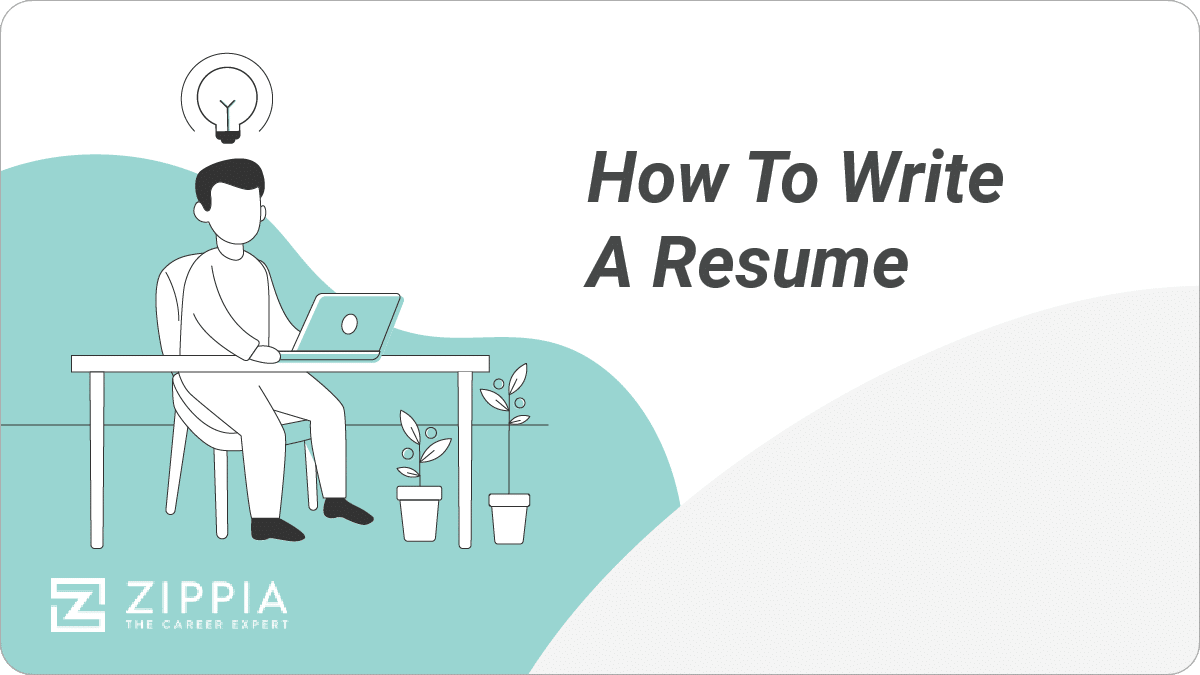
How to write a resume
Writing a resume involves using the proper formatting, writing an introduction, and adding your work experience and education. Stuffing your entire professional life into a single page resume can feel overwhelming, but remember that you’re distilling the relevant parts of your professional experience in order to catch the eye of the recruiter .
Formatting your resume. To start, use a word processor such as Microsoft Word or Google docs. Standard resume formatting calls for:
1 inch margins
10-12 point font
A professional, commonly-used font
Additionally, there are three resume formats that are commonly used. Most people should stick with a chronological resume format , but the combination resume format and functional resume format can be effective for more advanced workers or those who have significant gaps in their resume.
Write a resume header . It doesn’t matter if you have the best resume in the world if the hiring manager can’t contact you. Every single resume should include the following contact information:
Your full name. First and last.
Your phone number. Use a personal phone number, and make sure your voicemail is set up properly.
Your email address. Nothing inappropriate — [email protected] is a safe choice.
Location. City, State, Zip Code is fine, but you can include your full mailing address if you think it’s appropriate.
Your social media (optional). LinkedIn is the obvious one you’d want to include, but make sure your profile looks good. If you have an online portfolio , either on a personal blog/website or on a site like Journo Portfolio , feel free to include that here as well.
Your job title. Also optional, but can be useful for applicant tracking systems.
Resume introduction. You have four options for your resume introduction: a resume objective, summary statement, resume profile, or qualifications summary. For most job-seekers, a resume summary statement is the best choice. Regardless of which resume introduction you choose, avoid first-person pronouns (I/me/my).
Resume objective. A resume objective is the goal of your resume. Since the objective of every resume is to land a job, this is not the most original or impressive opener you can have.
On the other hand, it’s a good choice for an entry-level applicant or someone who is changing career paths . This should be a 1-3 sentence summary of why you’re motivated to get the position you’re applying for.
Who should use a resume objective: Entry-level applicants, career-changers, and recent college graduates.
Resume summary. This is the best opener for most job-seekers. As the name suggests, a resume summary highlights the most salient aspects of your resume.
It should include your current position, how many years of experience you have, some of your biggest achievements, and possibly your career goals. This should be a 1-3 sentence spiel and should include some quantifiable experiences.
Who should use a resume summary: Most job seekers; anyone with quantifiable accomplishments to emphasize and a broad range of skills.
Qualifications summary. A bullet point list (4-6 points is the sweet spot) of your qualifications for the position. It’s best used by applicants going for jobs that require a fixed skill set. It’s not a great choice for entry-level applicants who lack quantifiable achievements.
You’ll notice that a qualifications summary takes up more space than a resume objective or summary, but it can actually save the hiring manager time if you provide a bunch of valuable information right off the top.
Who should use a qualifications summary: Those applying to a job with requirements for certain skills and job-seekers who have a lot of experience in their industry and/or field.
Resume profile. A resume profile is similar to a resume summary, but goes into more detail about your accomplishments at your current or former job, while also telling the reader about your career goals. Think of a resume profile as a section that pulls all the best parts of your work experience section into one place.
Who should use a resume profile: Anyone with significant accomplishments under their belt, expertise in a niche field, or applying to a job in the same industry that they have lots of experience in.
Resume headline. Resume headlines aren’t necessary, but you can include one alongside any of the four types of resume introduction listed above. A resume headline comes between your contact information and the resume introduction of your choice.
Headlines can be used by entry-level applicants and experienced job-seekers alike. The important point is that your headline should be short and to the point. Additionally, you should use title case when writing your resume headline (capitalize words as you would for a book title).
Who should use a resume headline: Any job-seeker who wants to showcase their experience or unique value right off the bat.
Work experience. Your work experience section is the place to let hiring managers know that you have relevant experience that would allow you to handle the job you’re applying for.
If you’re using the chronological resume format, your work experience section would come after your resume summary/objective. In a funcitonal reumse, it would follow your skills section. Either way, work experience should be listed in reverse-chronological order (most recent experience at the top).
When listing your work experience, you should include all of the following information:
Job title. Start by stating the position you held at the company. These are easy cue for the hiring manager to look at and determine whether your past positions would help you succeed at their company.
Company Info. Include the name of the employer, the location where you worked, and perhaps a brief description of the company, if it isn’t a well-known name.
Dates Employed: Use the mm/yyyy format if you want to be sure that most applicant tracking systems (ATS) will pick it up. Whatever format you use for dates, be consistent, or your resume will look sloppy.
Job Description. Don’t just list your job’s responsibilities; hiring managers and recruiters already have an idea of your duties based on the job title. Instead, list your most important and impressive responsibilities/achievements at the job with bullet points. Determine which of these are most relevant for your new role based on the job description.
Ideally, each bullet should be no longer than a single line. However, two lines is acceptable, if used sparingly.
Always start with a strong action verb, followed by a quantifiable achievement and a specific duty. For example: “Developed ad campaigns for clients, increasing sales by an average of 27%.” Each job title should include 3-5 bullet points.
The order that you include this information can be changed around, as long as you are consistent throughout your resume. However, the bullet points detailing your job’s achievements should always be the last item for each entry.
It’s important that you tailor your resume’s work experience section to the job you’re applying for. We recommend reading the job description carefully and highlighting the action verbs in one color and the skills, adjectives, and job-specific nouns in a different color.
Educational background. In almost all cases, your education section should come after your professional history. If you’re a recent college graduate with limited work experience, you may choose to put your educational achievements first.
Like the section on your professional history, educational experiences should come in reverse-chronological order, with your highest level of education at the top. If you have a college degree, you don’t need to add any information about your high school experience. If you didn’t finish college, it’s okay to give a list of what credits you did complete.
Each educational experience can be listed in the following format:
Degree/Program Name College/University Name Dates attended
You don’t need to add anything else, especially if your resume is already impressive enough. But if you’re struggling to fill up the page, or you feel that aspects of your educational experience will help make you a standout, you may consider also including:
Minor. If you think it rounds out your not-exactly-relevant-to-the-job major nicely.
GPA. Only if it was 3.5 or higher. Otherwise, it’s not going to do you any favors to include this.
Honors. Dean’s List, Cum Laude, etc.
Achievements. If you wrote a killer thesis/dissertation that showcases intimate knowledge relevant to the job to which you’re applying, you can include its title and a very brief description.
Extracurricular activities. Only include if they’re relevant. For example, if you’re applying for a management position and you were president of your student government.
Certifications/Licenses. If the job you’re applying for requires/likes to see certain certifications or licenses that you have, you may include them in this section as well.
Skills section. Your impressive skills should be scattered logistically throughout your professional history section, but you should also include a section solely dedicated to highlighting your skill set . Skills can be broken down into two categories:
Hard skills are skills you learn through training and indicate expertise with a technical ability or job-specific responsibility.
Soft skills are your personality traits, interpersonal abilities, and intangible qualities that make you more effective at your job.
Your resume should have a healthy mix of hard and soft skills, as both are essential to job performance. However, since soft skills are harder to prove in the context of a resume, we recommend leaning more toward hard skills. Additionally, whenever you list a soft skill, make sure that it has a correlating item in your work experience section.
For example, if you say you are skilled in collaboration, you should mention a time when a team project was a major success somewhere in your work experience section.
Optional sections. If you still have space left or there’s more you want to show off that doesn’t quite fit in any of the above sections, you may consider adding an additional section covering one or more of the below categories:
Language . Being bilingual is always impressive, and can be included on a resume for any company. Highlight this more if your position involves liaising with international distributors and/or clients. Don’t lie about your proficiency level.
It may be best to not mention it if you’re not particularly proficient speaker . Such as if you took courses in school, or haven’t really managed to gain fluency. It can end up looking like an attempt to inflate your credentials, which you want to avoid.
Volunteer experience . Always a good thing to include. It shows you’re a team player who behaves in a way that promotes the greater good, without thought of personal gain. Especially good for entry-level candidates and those applying for jobs at a non-profit. If you have gaps in your work history, you can also consider including volunteer experiences in your work history section instead.
Personal projects. A personal blog, published works, or a portfolio of your past projects are all good things to include. They show you take initiative, enjoy and take pride in your work, and that you can handle the responsibilities of the job, if relevant.
Certifications/licenses. If you didn’t include these in your education section, this is another good place to list relevant certifications or licenses that you have.
Interests . This is largely just a space filler if your resume is light in other areas. However, if your hobbies are directly related to the job that you’re applying for, it’s not a bad idea to include them. And it might draw a recruiter’s attention if you end up sharing some of the same interests as they do.
If you have several seemingly random items that are valuable, but don’t warrant creating a whole separate section for, you can also make a section called “Additional Experience.” Here you can include all of the above categories in one place. Just make sure that each item is clear and easy for readers to understand.
Resume samples
Now that we have a good idea of how to write a resume, let’s take a look at some example resumes:
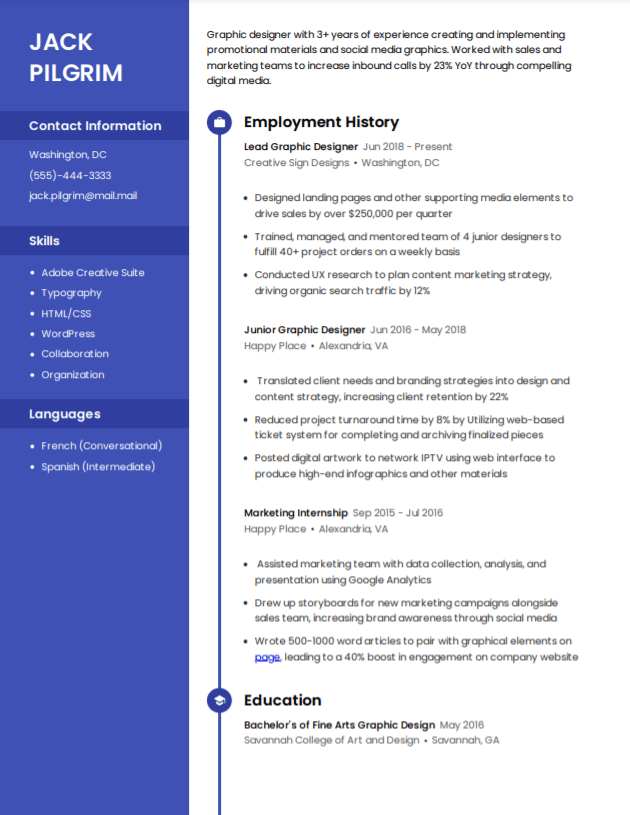
Jack Pilgrim Washington , DC 14015 – (555) 444-3333 – [email protected] – www.linkedin.com/jpilgrim Resume Summary Graphic designer with 3+ years of experience creating and implementing promotional materials and social media graphics. Worked with sales and marketing teams to increase inbound calls by 23% YoY through compelling digital media. Adept at planning, managing, and prioritizing multiple deadlines at once, and thrives in fast-paced work environment. Work Experience Creative Designs | Washington, DC Lead Graphic Designer | June 2018-Present Worked with sales and marketing teams to create landing pages, sales proposals, and supporting media elements to drive sales by over $250,000 per quarter Trained, managed, and mentored team of 4 junior designers to fulfill 40+ project orders on a weekly basis Conducted UX research through surveys, usability testing, and data analysis to plan content marketing strategy, driving organic search traffic by 12% Presented proposals, results, and status updates to set of 4-7 clients, ensuring customer satisfaction at or above 95% for 3 years straight Happy Place | Alexandria, VA Junior Graphic Designer | July 2016-May 2018 Translated client needs and branding strategies into design and content strategy, increasing client retention by 22% Reduced project turnaround time by 8% by Utilizing web-based ticket system for completing and archiving finalized pieces Posted digital artwork to network IPTV using web interface to produce high-end info-graphics and other materials Happy Place | Alexandria, VA Marketing Intern | September 2015-July 2016 Assisted marketing team with data collection, analysis, and presentation using Google Analytics Drew up storyboards for new marketing campaigns alongside sales team, increasing brand awareness through social media Wrote 500-1000 word articles to pair with graphical elements on page, leading to a 40% boost in engagement on company website Education Savannah College of Art and Design | Savannah, Georgia May 2016 Bachelor of Fine Arts in Graphic Design Skills Adobe Creative Suite Typography HTML/CSS WordPress Collaboration Organization
Allison Neederly Chicago, Illinois , 60007 | (333) 222-1111 | [email protected] | www.linkedin.com/allison.neederly Resume Summary Dedicated customer service representative with 4+ years experience resolving customers’ needs in-person, online, and over the phone. Top achiever at XYZ Inc. with a 100% customer satisfaction rate for Q1 of 2020. Friendly personable, and knowledgable about company’s products and services. Relevant Skills Customer Service Responded to upwards of 200 customer queries daily with XYZ Inc., reducing the average wait time by 56% and increasing customer satisfaction rates by 13% Ability to resolve conflict and create a positive atmosphere for shopping for both new and existing customers through technical proficiency Expert product knowledge and communication skills, and experience training and mentoring new customer service staff Web Chat and Phone Skilled in 3 web chat platforms for helping online customers resolve their queries quickly and accurately Achieved fastest call resolution rate at XYZ Inc., with an average resolution time of under 5 minutes per customer Performed outbound calls for customer satisfaction surveys, as well as writing web-based surveys for 10,000+ customers Troubleshooting Detailed product knowledge allowed for customer technical issues to be resolved at rate within top 5% of all customer service associates at XYZ Inc. Created manual for step-by-step directions for troubleshooting that was implemented for team of 100+ customer service reps Positive attitude took average tech-related negative response from 1/5 stars to 4/5 stars, increasing trust in brands and services Work Experience XYZ Inc. | Philadelphia, PA Customer Service Associate New Look Global | Burlington, VT Junior Customer Service Representative L.L. Bean | Burlington, VT Sales Associate Education University of Vermont | Burlington, VT May 2012 Bachelor of Arts in Humanities
Priya Laghari New York, NY | (222) 111-0000 | [email protected] | www.priyabizdev.com Resume Profile Strategy Development: Grew John Deere’s international sales by 13% by tapping into undeserved countries in Southeast Asia Management: Oversaw a team of managers representing marketing, sales, and product teams. Streamlined collaborative, cross-functional communications through agile and scrum management system CRM: Developed, customized, and implemented new customer relationship management database for accounts totaling over $10M in value Work Experience Business Development Manager 01/2015-Present Microsoft | Redmond, WA Developed product strategies and roadmap for Google AdWords, increasing inbound traffic by 26% YoY Reduced time training on new software by 50% for new and existing employees by implement e-learning programs Spearheaded digital marketing campaign worth $1M that saw a return of 200% in first year by qualifying leads earlier in the sales funnel Regional Sales Manager 11/2012-01/2015 Big Things Inc. | St. Louis, MO Managed territory encompassing 29 regional locations with an annual revenue of approx. $55M Worked with C-level executives to plan business strategies, resulting in 20% reduction in overhead costs Increased client retention by 12% in first year by implementing a CRM approach based on account profiling and elevating levels of relationship selling Account Manager 02/2009-11/2012 Solutions Corp. | Chicago, IL Implemented and developed CRM strategic plans, increasing retention of long-term clients by 22% Maintained 50+ accounts totaling over $35M in value Generated leads through one-on-one consultation via phone inquiries, online check-ins, and meeting office walk-ins Relevant Skills CRM: Proficient with Salesforce, Zoho, and HubSpot; some experience with Keap. Used various CRM software over a decade to successfully manage customer relations and quick to adapt to new software and tools that aid in quality of customer experience. Salesmanship: Negotiated and closed over several deals worth $1M+ and skilled in upselling and cross-selling. Adept at working closely with marketing and product teams to maximize the efficiency of the sales funnel for both inbound and outbound traffic. Presentation: Represented Microsoft Northwest Region at quarterly board meetings, ensuring all stakeholders were kept abreast of new developments and opportunities. Also deliver monthly presentations to big clients and vendors to maintain positive relationship. Data analytics. Expert at integrating data from various analytics platforms, including Google, Microsoft Power BI, and SAP BusinessObjects Education Colgate University | May 2008 MBA Fordham University | May 2006 Bachelor’s Degree in Business
For more resume examples and templates:
Resume examples by job
Google docs resume template
Resume templates
Resume builder
Resume Headers Samples:

Tip : Never put your contact info in the header of your document; some applicant tracking systems might miss it.
For more on how to write a resume header:
Resume Header
Resume Titles
Resume introduction examples
Entry-Level Resume Objective.
Recent graduate with a bachelor’s in Marketing from the University of Virginia seeking an entry-level role in content marketing. Excellent copywriter with 2+ years experience editing content as a member of the UVa Writing Center.
Career Change Resume Objective.
Eager to apply 7+ years of experience with customer success management to make successful outbound B2B calls, deliver customized business solutions to new and existing customers, and provide expert product knowledge in the role of Account Manager for XYZ Inc.
Example Resume Summary Statement.
Accountant with over 8 years of experience in the medical industry. Adept at advising on management of cash deficits, reconciling departmental accounts, and creating new accounts and codes. Coordinated invoice preparation system for ABC that reduced contractor overhead by 19% YoY.
English teacher with a love of language and 6 years of experience teaching high school students. Developed new curriculum that boosted freshman reading comprehension scores by 12% and created after school book club for AP Lit class, resulting in 100% of participating students achieving a 5 on the AP Lit test.
Example Qualifications Summary.
Executive assistant with 5+ years experience helping maintain efficiency in an office of 25 employees Communicated directly with internal and external stakeholders, helping Senior Vice President manage projects worth $5M+ Proactively managed office schedules, identifying and prioritizing changes to ensure client satisfaction Recognized in a company of 500 for “Outstanding Achiever” in May 2019
Example Resume Profile.
Detail-oriented IT Specialist with 4 years of experience overseeing and improving the infrastructure of IT systems. Adept at building and running troubleshooting systems and testing services. Decreased security risk by 47% through continual optimization, while also improving the speed of client portal by 22%. Excellent communicator both internally and for client-facing discussions. Achieved 98%+ customer satisfaction ratings through weekly and monthly check-ins with accounts valued cumulatively at $500,000.
Entry-Level Resume Headline.
Bilingual College Graduate with 80 WPM Typing Speed and Tutoring Experience
Experienced Resume Headline.
Business Development Specialist with 6+ Years Experience Scaling Start-Up Tech Teams
For more on resume introductions:
Resume objective statement
Resume summary statement
Resume summary statement examples
Qualifications summary
Sample resume work experience sections
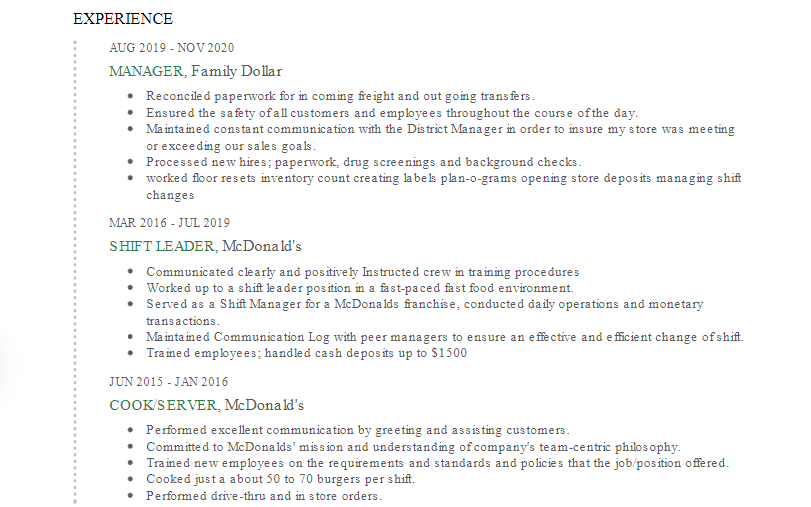
Work Experience XYZ Industries | Seattle, WA Marketing Associate | May 2019-Present Delivered weekly presentations to client-base to communicate brand messaging, increasing client retention by 11% Served as liaison between marketing and product teams, resulting in projects finishing 2 weeks early, on average Leveraged Excel skills to create and maintain spreadsheet to track consumer insights, emergent trends, and inform decisions of marketing team through competitive analysis Managed team of 5 contractors to juggle multiple priority projects simultaneously, never missing a deadline Initiated an affiliate referral program that PR team went on to turn into a revenue-generating stream valued at $30,000 annually ABC Corp | Seattle, WA Marketing Intern | September 2018-May 2019 Developed, maintained, and processed 20+ digital consent forms and distributor forms Worked collaboratively with a team of 10 marketing professionals, closely aligning our goals with the PR team Provided data analysis using Google Analytics and performed keyword research to increase blog traffic by 56% over six months Answered up to 50 customer queries by phone and email each week
For more on building the perfect resume work experience section:
Resume work experience section
First resume (no experience)
Examples Of Education Resume Sections
Graduated recently from a 4-year program.
Western Illinois University | Macomb, Illinois May 2020 Bachelor of Arts in Sociology | Minor in Psychology 3.95 GPA magna cum laude Dean’s List all semesters
Two degrees.
Fordham University | Bronx, New York April 2016 Master of Chemical Engineering Stony Brook University | Stony Brook, New York April 2014 Bachelor of Science in Chemistry
Anticipated graduation date (not yet graduated).
DePaul Univeristy | Chicago, Illinois Bachelor of Arts in History – Degree anticipated May 2021 Current GPA: 3.8
Older job seeker (graduated 10+ years ago).
University of Chicago | Chicago, Illinois Bachelor of Business Administration
High school graduate (no college degree).
Johnston High School 2016-2020 Head of Computer Club
More on crafting the perfect resume education section:
Education resume section
GPA on resume
Dean’s list
Magna cum laude
Examples Of Skills For Resume
Examples of hard skills include:
Examples of soft skills include:
Here’s more information on how to incorporate skills into your resume:
Resume skills section
Hard skills
Soft skills
Top skills for professionals
Skills-based resume
Resume writing FAQ
What is a resume?
A resume is a one to two-page document that focuses on professional experience, past achievements, education and certifications, and specific skills tailored to the job you’re applying for.
Almost every job application requires a resume, and hiring managers use them as a first impression in determining which applicants get a shot at an interview.
Whether you’re fresh out of college or have 30 years of professional experience, this guide should help craft a resume that stands out from the crowd and get you one step closer to landing your dream job.
What is the format for writing a good resume?
Most people will want to use a chronological or reverse-chronological resume format. This format is compatible with most applicant tracking systems (ATS) and is easy for employers to read. Additionally it helps highlight your experience, which helps prove your qualifications.
How far back should a resume go?
A resume should go back no further than 10 to 15 years. However, it is important that all your information is relevant. Therefore, do not include job experience that is irrelevant to your application, even if it’s fewer than 10 years old. Save that information for later discussions.
Should you personalize your resume for each job?
Yes, you should personalize your resume for each job you apply to. Many recruiters use ATS now, which will search for keywords in a resume and reject those that don’t have them. That means that the skills you choose to highlight as well as your opening, such as your resume summary, should be altered to suit each job you apply to.
You don’t need to rewrite the entire resume for each job, but it does show attention to detail and initiative to make sure that your resume is customized. It also makes it more likely that you’ll get past the first step of the process.
State of New York Department of Labor – Resumes, Cover Letters and Job Applications
Harvard University – Create a Resume/CV or Cover Letter
How useful was this post?
Click on a star to rate it!
Average rating / 5. Vote count:
No votes so far! Be the first to rate this post.

Matthew Zane is the lead editor of Zippia's How To Get A Job Guides. He is a teacher, writer, and world-traveler that wants to help people at every stage of the career life cycle. He completed his masters in American Literature from Trinity College Dublin and BA in English from the University of Connecticut.
Recent Job Searches
- Registered Nurse Jobs Resume Location
- Truck Driver Jobs Resume Location
- Call Center Representative Jobs Resume Location
- Customer Service Representative Jobs Resume
- Delivery Driver Jobs Resume Location
- Warehouse Worker Jobs Resume Location
- Account Executive Jobs Resume Location
- Sales Associate Jobs Resume Location
- Licensed Practical Nurse Jobs Resume Location
- Company Driver Jobs Resume
Related posts

How To Write Resume Work Experience (With Examples)
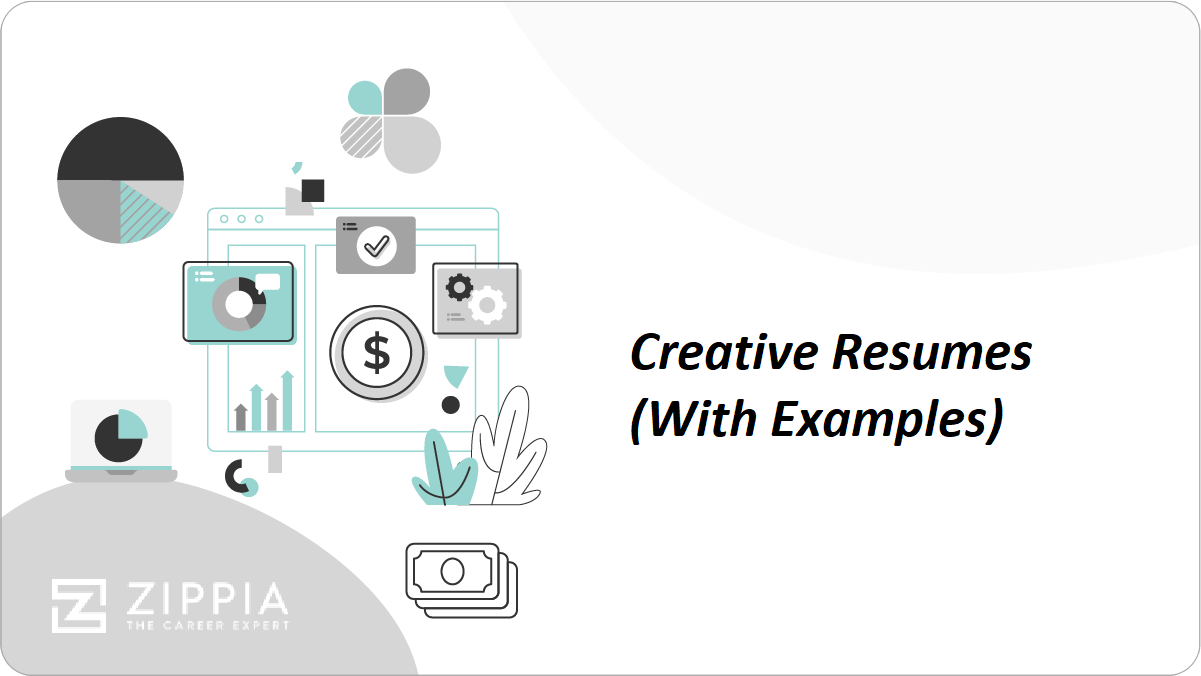
Creative Resumes (With Examples)
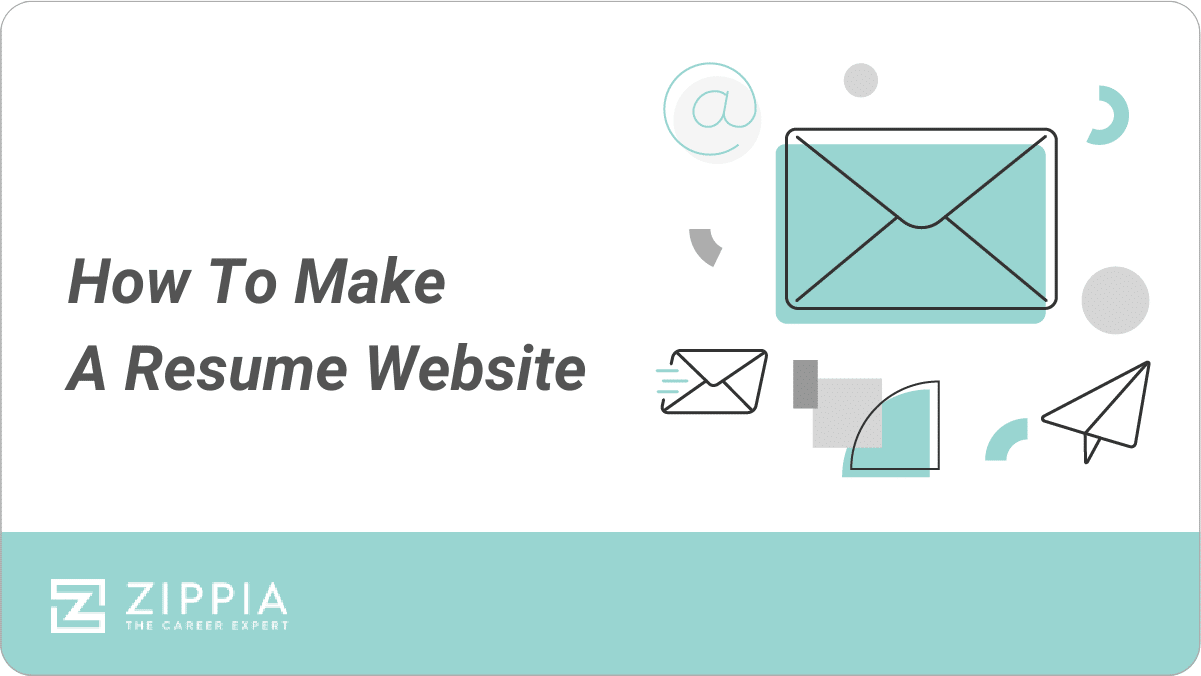
How To Make A Resume Website
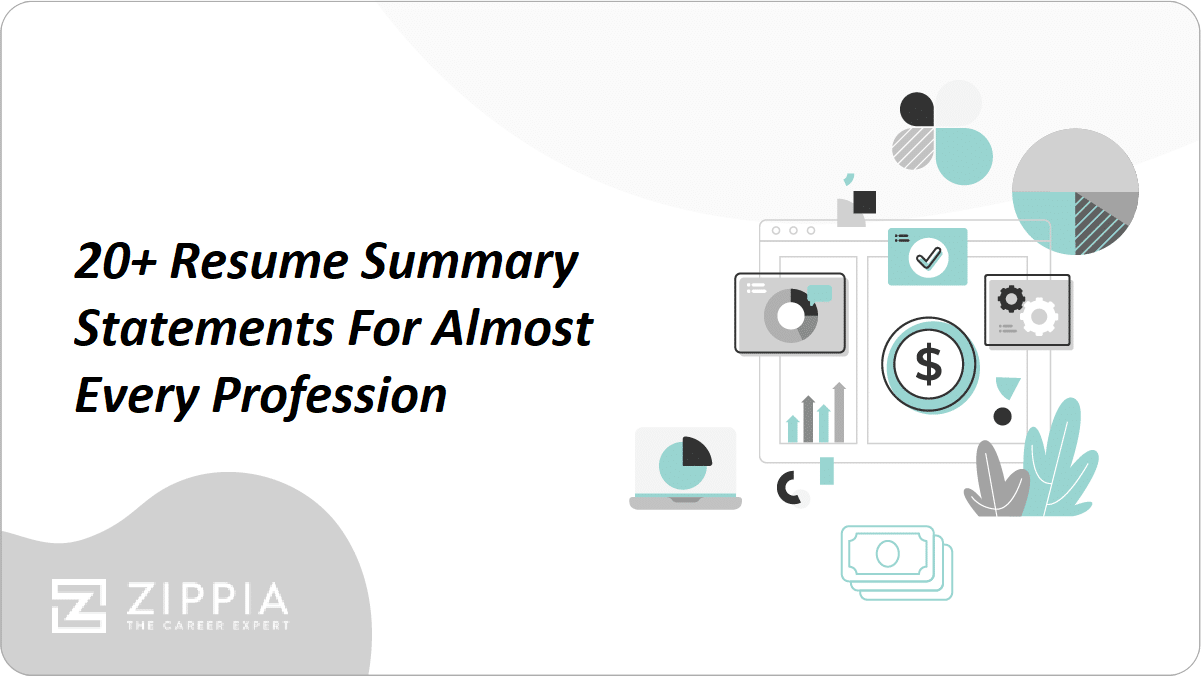
20+Resume Summary Examples For Almost Every Profession
- Career Advice >
- Resume Structure >
- Parts Of A Resume >
How to structure your résumé so it gets recruiters' attention
- The F-method helps recruiters identify key info by structuring résumés for how they read them.
- This approach can help job seekers because recruiters might spend only seconds looking at a résumé.
- Highlighting key skills and accomplishments up top can help hiring managers and scanning software.

Sometimes, an F can be a good thing .
Take the so-called F-method. It's a way of organizing your résumé so that a recruiter can read the most important parts across the top — like the upper portion of the letter F.
The next most essential info goes farther down with keywords or points sticking out like the arm on an F.
The idea behind the framework is to help someone looking over your résumé get to the good stuff right away. That's because recruiters might spend only seconds scanning your work history and other accomplishments, and you need to make sure you really stand out, really quickly.
"The skills section on my résumé is in that 'F.' It's in that direct line of sight," Lee Woodrow, owner and principal consultant at Bigger Fish Executive Branding , told Business Insider.
Highlighting the top information right away is all the more important in an environment where it's getting harder to get desk jobs — and where the ease of applying means recruiters are often overrun with applications.
'Buzzword bingo'
Woodrow, who's been writing résumés for others for many years, said the top of a CV built around the F-method should include essential information about the value you bring: details like who you are professionally, what area your expertise is in, and which industries you've worked in.
"It's an elevator pitch," he said. That information belongs at the top near your name, he said, so that it gets seen. "That entices the reader to read on."
It's also important, Woodrow said, to have the right words and phrases up high where a busy recruiter can see them.
"It's like buzzword bingo," he said.
This is often important when recruiters are trying to fill technical roles. They might not have a lot of background in the particulars of a job, so they might be on the hunt for phrases or words that a hiring manager has flagged.
Related stories
Setting your résumé up with the F-method can mean a break from traditional formats, such as listing your work experience in reverse chronological order, which may surprise some.
But Woodrow said floating the most important ideas to the top makes sense if, for example, your most relevant experience for a job isn't tied to your latest role. Or, in other cases, he said, a job posting might call for someone with a master's degree or a Ph.D.
"Why would you put it lower down on page two or three? You'd want it on page one somewhere — highlighting it in that area which is in the 'F,'" Woodrow said.
In any case, he said, it's important to keep the most relevant information on the first page of a résumé.
Have a few goals in mind
Woodrow said one goal for your résumé should be ensuring it can be easily read by the applicant-tracking software companies often use to sift through job applications. Another aim should be having clear section titles so the document is a breeze for a recruiter to navigate. Highlight things like relevant job experience for a role you're going for, he said.
Last, Woodrow said, a résumé needs to influence a decision-maker by giving proof of your accomplishments. He recommends including three brief examples on the first page about how you solved a problem. To do this, describe a situation, give context, and use metrics from the business, if possible, to demonstrate how you improved a situation.
It's an abbreviated version of the STAR technique , sometimes used in interviewing, and involves describing a situation or task, actions, and results.
Kyle Samuels, founder and CEO of the executive search firm Creative Talent Endeavors , told BI that using the F-method to lay out a résumé can make sense for technical roles where a recruiter needs to know you have a certain amount of experience with, say, a particular programming language or modeling.
But in other cases, where a job might be more senior, artificial intelligence tools that do a first pass on a stack of résumés might make the F idea somewhat moot because AI bots can scoop up huge volumes of information.
"It kind of feels like a poor man's AI," Samuels said, referring to the F-method.
He said that with a role like a VP of marketing, you might have several candidates who would be a great fit.
"We're not expecting to see the exact same formatting or skills or experience, and so we really pore through the résumé," Samuels said.
That's why, especially when recruiting for more senior roles, there's little substitute for reading a résumé thoroughly, he said.
"I study it like the Torah," Samuels said.
- Main content

IMAGES
VIDEO
COMMENTS
The first step is to collect all of the important details like the title of the research project, the location of the research project, the principal investigator of the project (if applicable), and the dates of the project. You will list these details much like you would list a company you have worked for in the past.
How to put research on your resume. Follow these steps to add research skills to your resume: 1. Review the job description. Start by reviewing the job description closely and identifying whether the employer is looking for specific types of research skills. Make a list of all of the research-related skills they're looking for in a candidate. 2.
Resume summary highlighting relevant research skills and experience. More information: Generate a summary for your resume. Examples of listing research experience on your resume. No matter where you choose to include it, always list research experience in concise, accomplishment-focused bullet points. These should follow the structure of action ...
List the publications in bullet points, including the title, date, and journal name. You can list academic publications more formally if you're applying to graduate school or seeking a role in academia. Related: Create a Resume Publications Section in APA and MLA. 6. Highlight research skills in the skills section.
5 tips for including undergraduate research experience on a resume. If you're looking to learn how to put undergraduate research experience on a resume, the best placements are within your "Education" section or as projects in a resume. Here are five tips to help you get started. 1. Use a clear title. 2. Include the duration of the ...
For research, summarize your accomplishments in a brief section. You should include a description of your role in the research, the topic that you were exploring, and some information about your findings. For example, _ Research Project, Economics Department, Dynamic University, Dec 2017 - Apr 20_20.
The five (plus) definite sections your resume for a researcher job should include are: Header with your headline, contact details, and/or a preview of your work. Summary (or objective) to pinpoint how your success aligns with the role. Experience with bullets of your most relevant achievements in the field.
At any rate, your research experience must be presented in a logical and coherent manner. Here's how you put research on your resume: List all research work you have done previously, no matter what kind it may have been. It may have been academic research from your schooling. It may have been market research you did in your previous positions.
When applying to a research and development position, follow these steps to create your research and development resume: 1. Write your contact information. Including your contact information in an easy-to-identify format makes the job of the hiring professional reading your resume easier. Place your name at the top of your resume in the largest ...
To discover how to put research on your resume, consider following these steps: 1. Examine the description of the job opening. When writing your resume for a job opening, thoroughly review the job description to discover if hiring managers are looking for specific research skills. For example, in the job description for a laboratory scientist ...
Here are ways to include publications on your resume: 1. Create a separate research and publications section. One way to list your published works is to create a separate section for them on your resume. Use this method if you have a few publications. This method is ideal for people who have been published in respectable industry publications.
If your publication has co-authors, include their names, but place yours in bold. Related: 23 Research Databases for Professional and Academic Use If you want to list publications on a resume, you can take a simpler approach: Create a dedicated section. Add a component to your resume page titled "Publications." Use reverse chronological order.
How to put research experience in a resume. You can follow these steps when learning how to add research experience in a resume: 1. Write a resume summary. One way to introduce your research abilities is to share them as part of your professional summary at the top of your document. If research is an important part of your background experience ...
What Info Your Research Resume Should Include. Your research resume has a significant part in helping a recruiter in understand your skills with respect to the position you have applied for. Thus, to illustrate your skills properly, you should include the following sections in your research resume: There might be a huge amount of information ...
Put them in a separate resume section called "Publications.". Add your publications section below your education. Include each publication in a new bullet point. List the year and title. Add the name of the magazine, website, or journal. Stick with publications that show required skills.
Once you have finished your bullet points, you can add them to your resume! Students typically put their research experience in a section that allows these activities to stand out. If you feel like your research is something that you want to highlight, you can create a specific section for it!
How to List Research Skills on a Resume. Your resume is the best place to highlight your research experience and the value you could bring to your next role. The key here is to put your research skills in the right section so that they get noticed by the reader. You have no fewer than 7 options here: A dedicated research section
Use professional language, as most files are submitted electronically — the reviewer will see if you named a file "Better Resumé". Include your first and last name and the title of the position in the file name. ex: Jane Doe Resumé - Biochemistry REU, UT Austin. This will ensure that the reviewer knows who you are and what you are ...
In your skills list, prove you've got them, like this: Research: conducted deep research into 15 unique project topics as directed by professors. Commended by 3 professors for quality of research. Data entry: Performed regular data entry tasks on first-year student project grades for 400+ students.
4. Turn an Incomplete Education Into a Reason to Hire You. When decision-makers look through an undergraduate research resume, they're clearly looking for a solid academic record, but that means a lot more than a solid GPA. First: List your degree (s), school (s), and (expected) graduation date (s). Then:
Why this resume works. When it comes to your laboratory research assistant resume, numbers speak louder than words.Numbers quantify your claims and grab the eye of the person reviewing your resume. Use numbers to discuss publications, team members you managed, money you saved, grant funding you helped acquire, or the outcome of your data analysis.
It doesn't matter if you have the best resume in the world if the hiring manager can't contact you. Every single resume should include the following contact information: Your full name. First and last. Your phone number. Use a personal phone number, and make sure your voicemail is set up properly. Your email address.
There are several steps you can take when writing a research CV: 1. Determine the role you want. Before creating your research CV, try to determine the research role you want. Researchers apply for positions closely related to the field they study or hope to extend their education through research opportunities.
In addition to the contact section, work history is probably the most important thing you'll need to add to your resume. Your work history will include your three to five most recent jobs you've had. If you're a new grad, you might include internships or part-time jobs as part of your work experience.
You need a resume or CV specific to the research position(s) you want. On your resume, be sure to include: all relevant courses you have taken, scientific lab methods you know, and any faculty you have previously worked with on research or a project. For those conducting research with humans, you may need to complete the HRPP CITI Training ...
Writing a high-quality resume may require you to brainstorm your research-based accomplishments and highlight them strategically throughout the document. Follow these steps to write your research assistant resume: 1. Include your personal information. Place your current contact information at the top of your resume document so a hiring manager ...
Alex Slitz/Associated Press. The F-method helps recruiters identify key info by structuring résumés for how they read them. This approach can help job seekers because recruiters might spend only ...